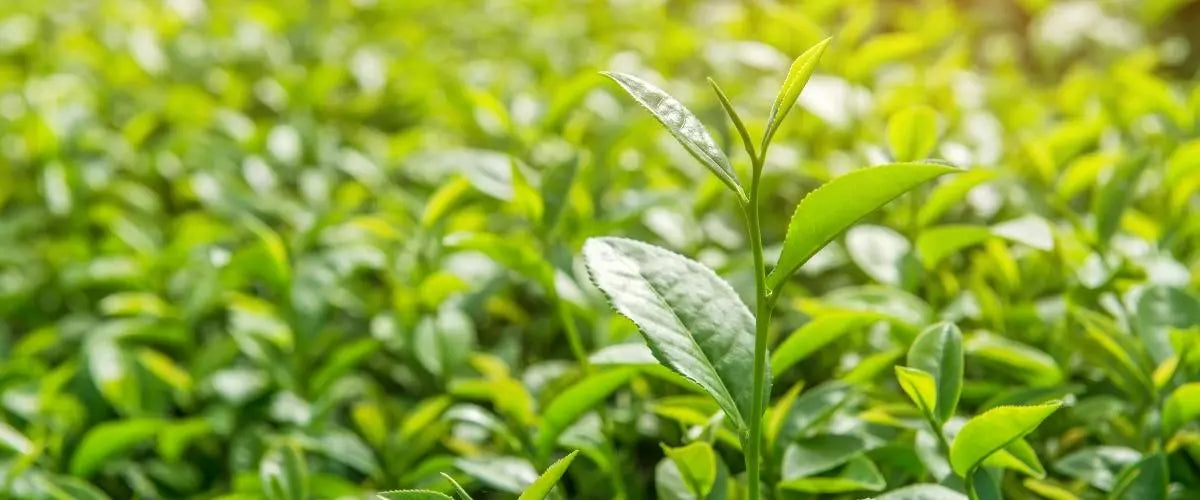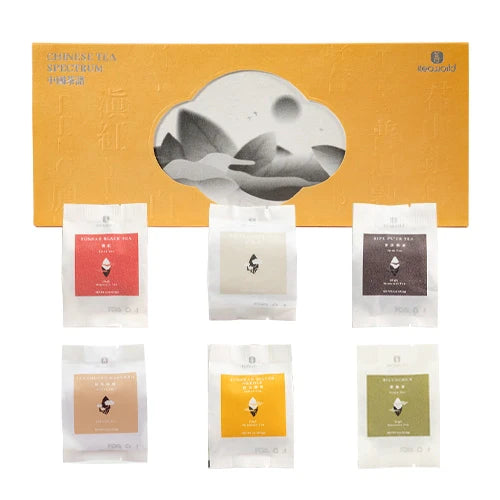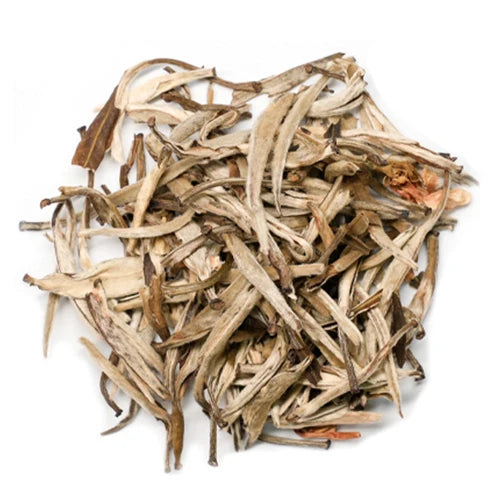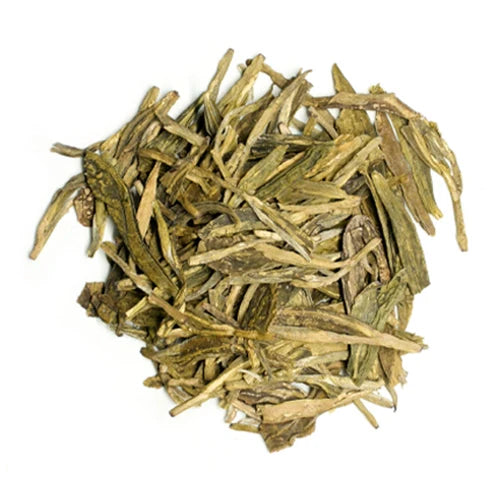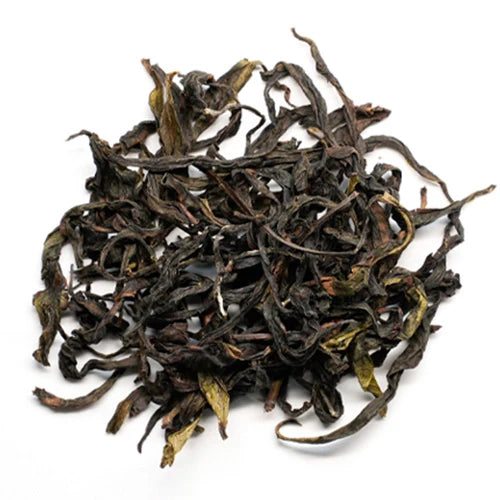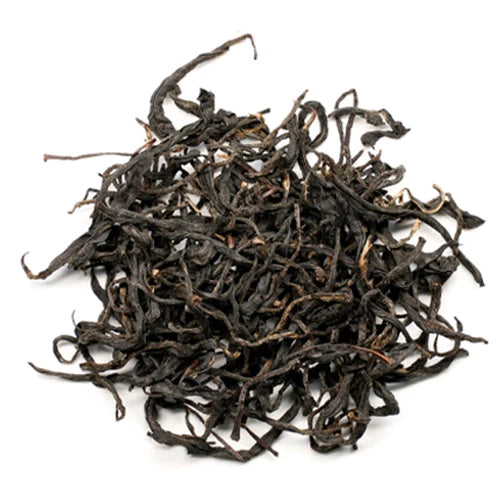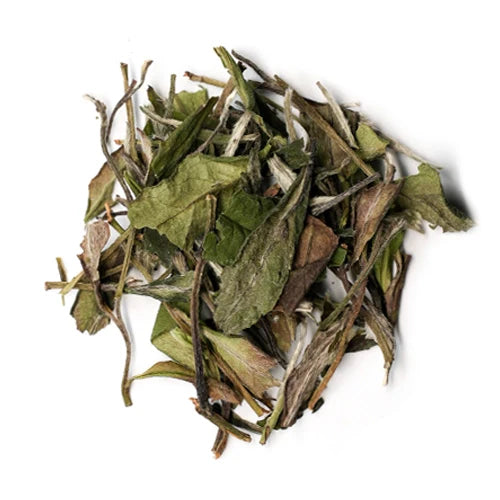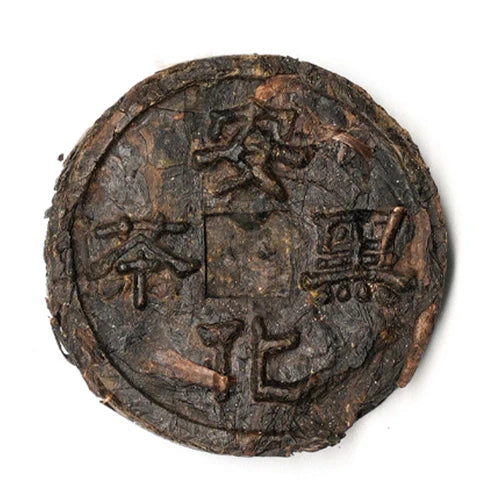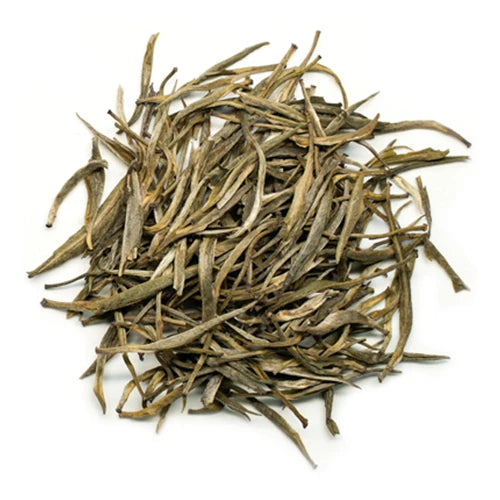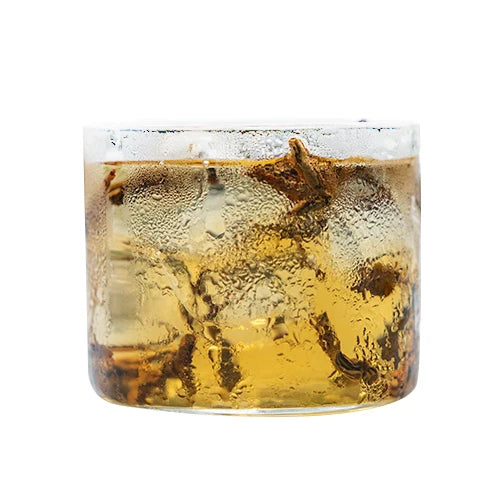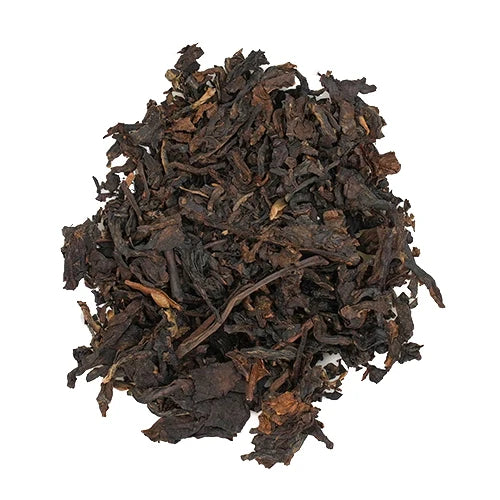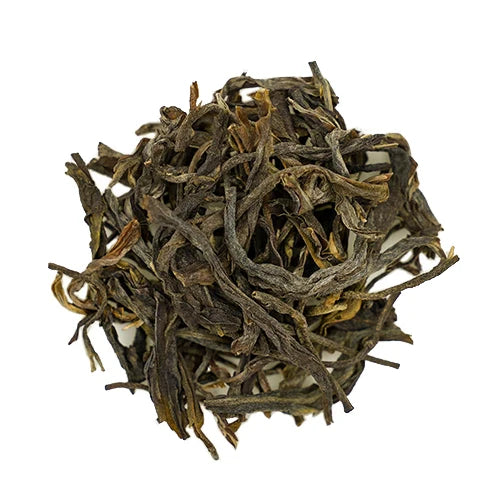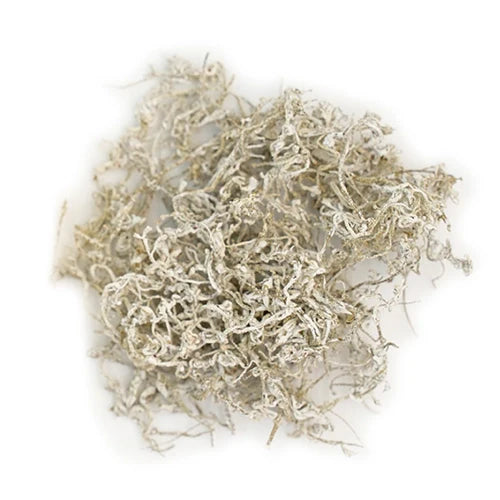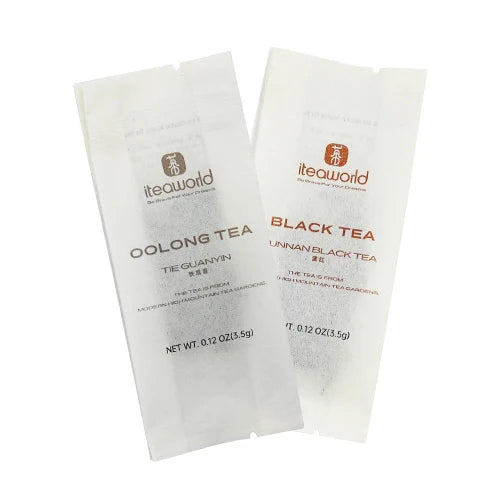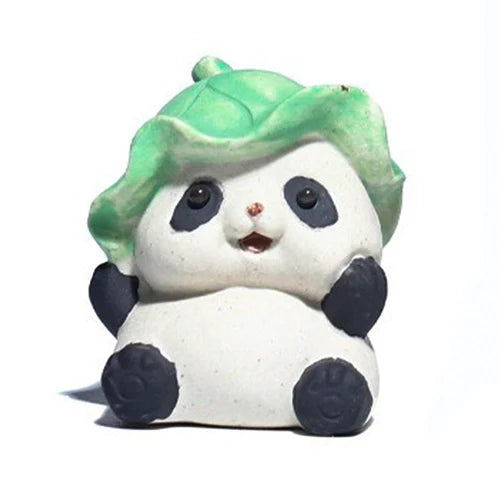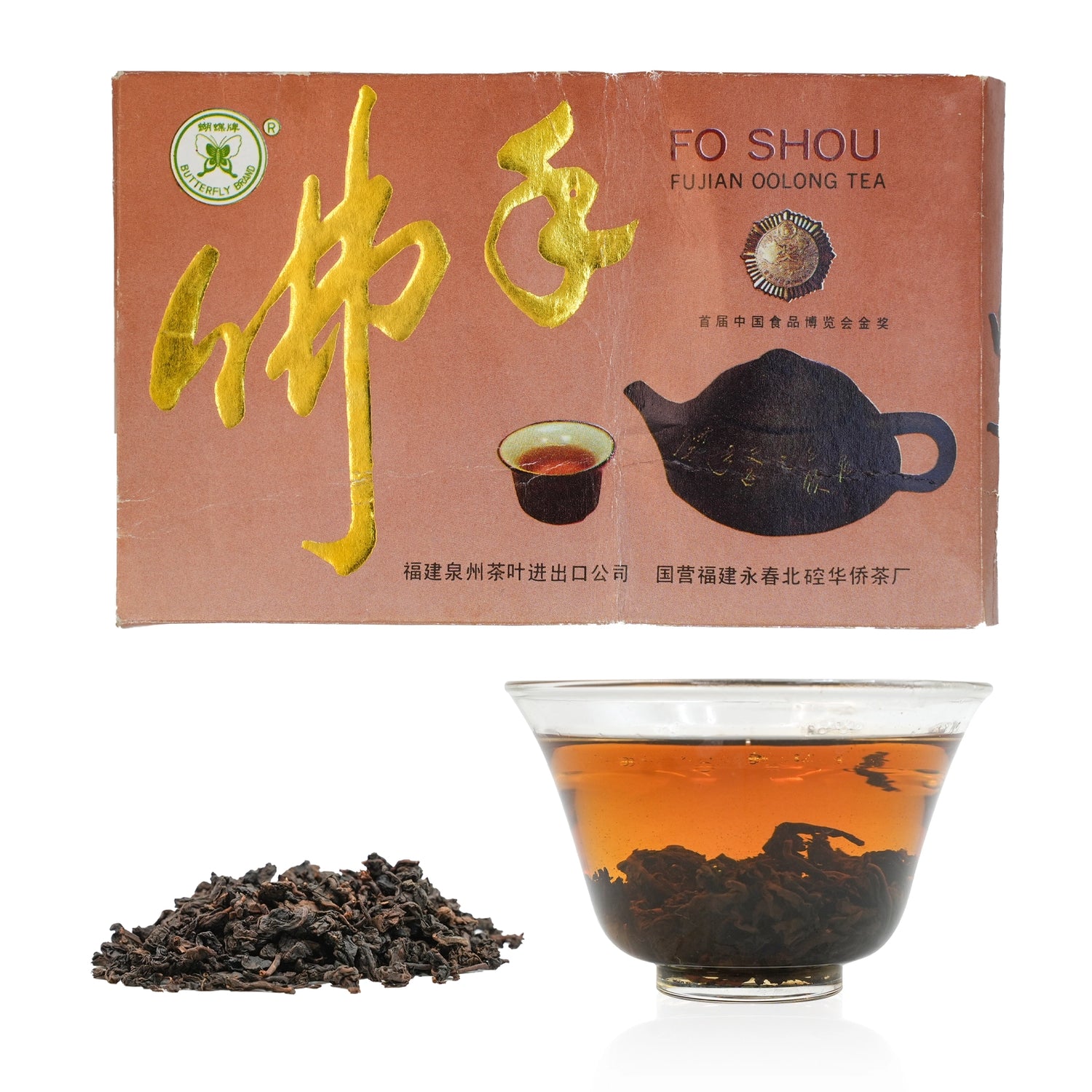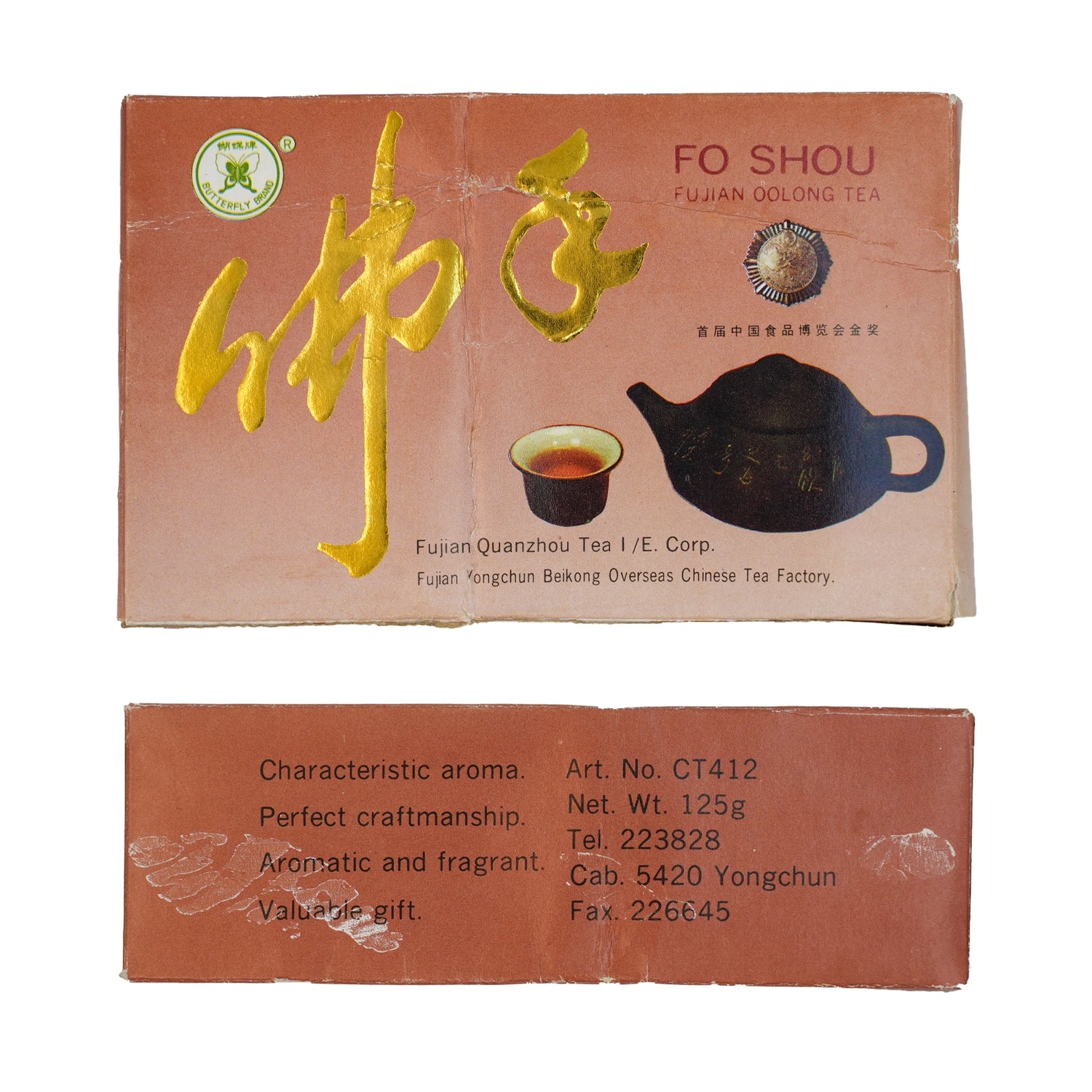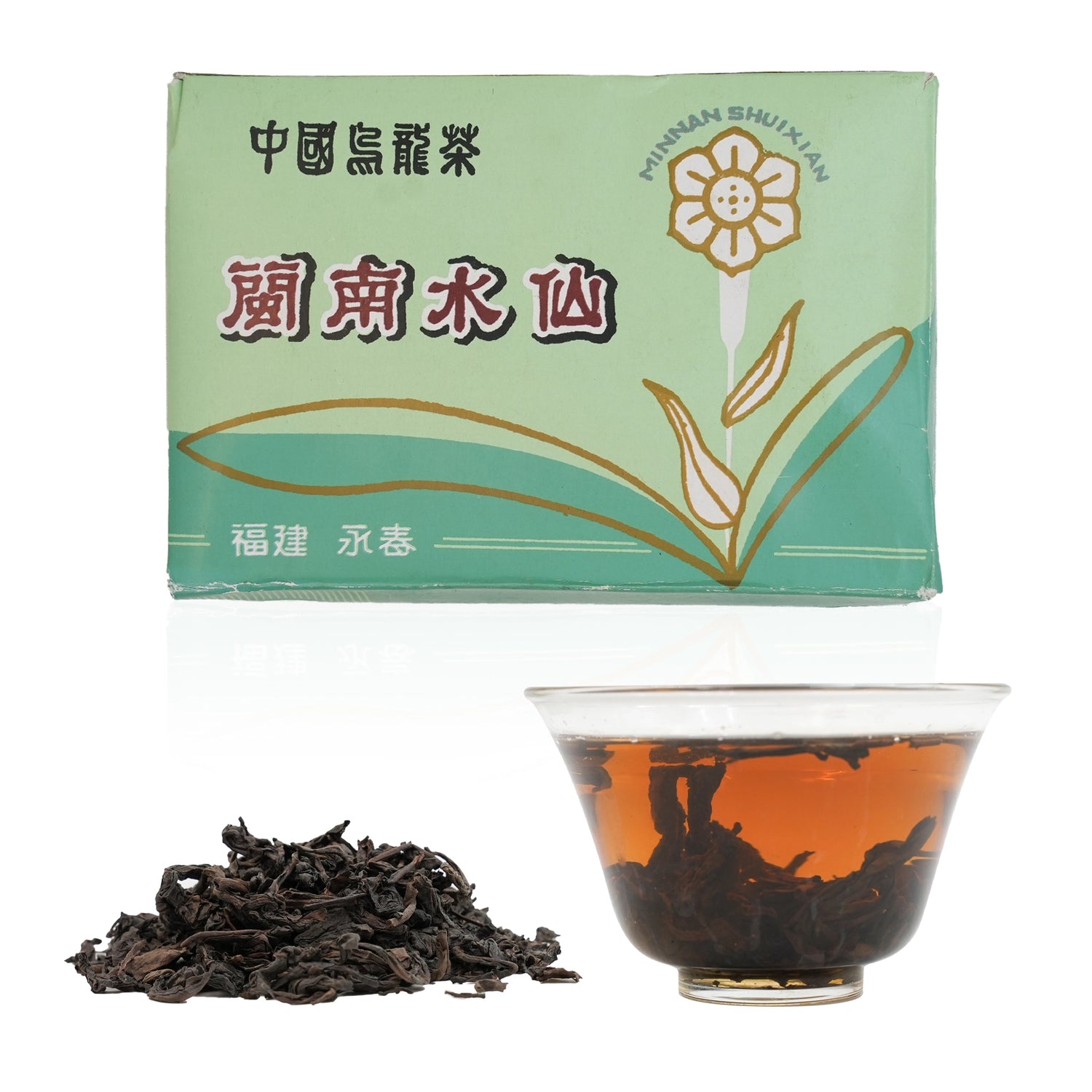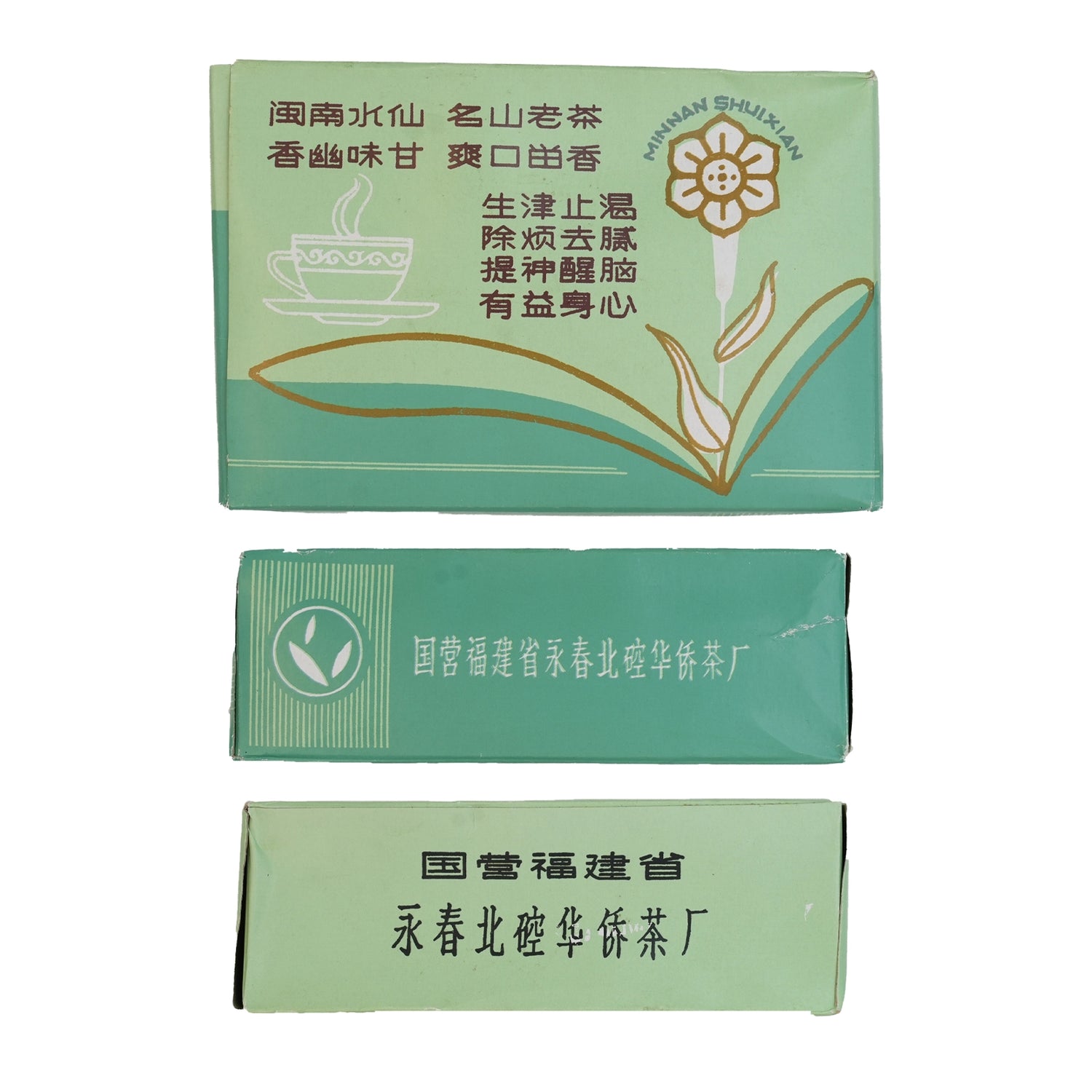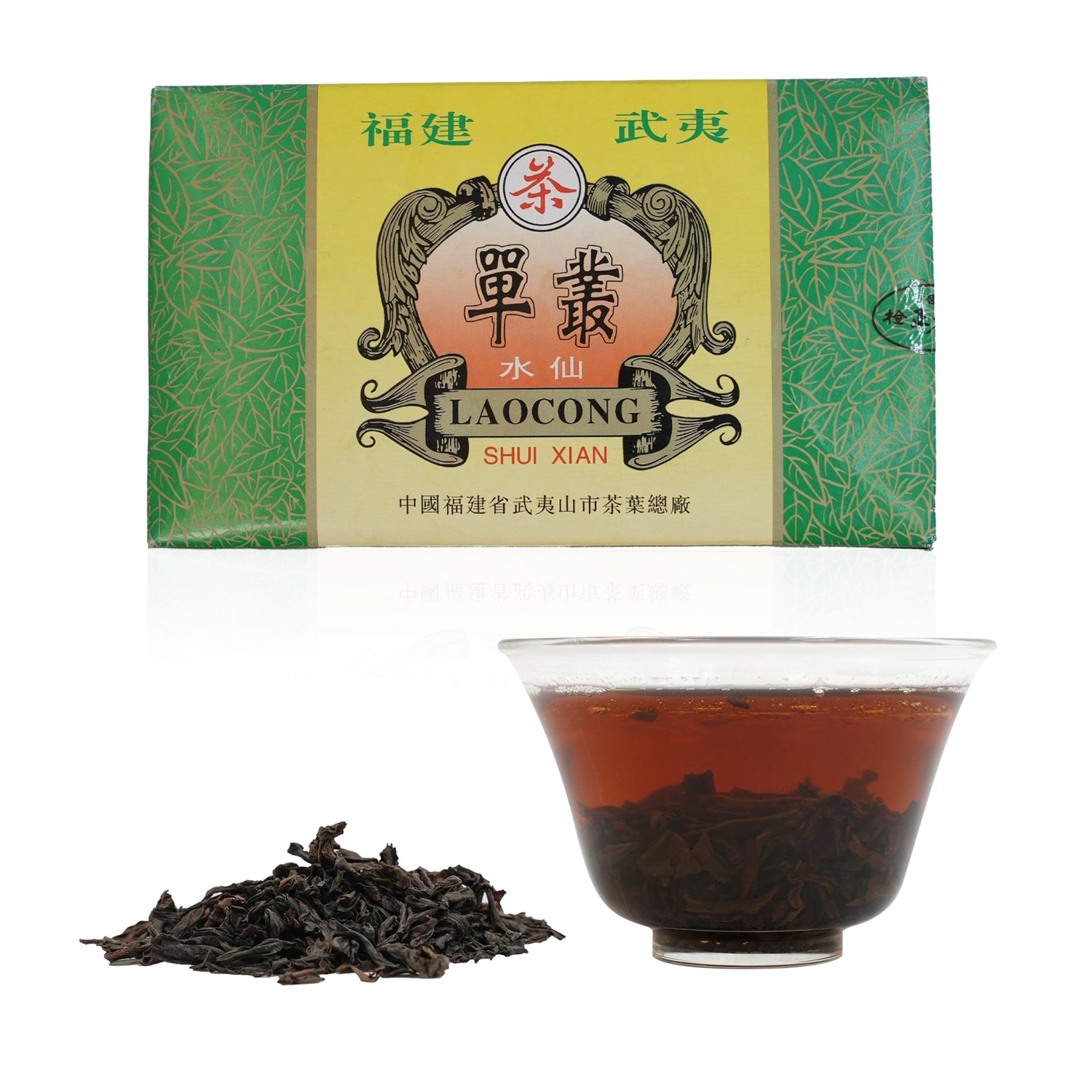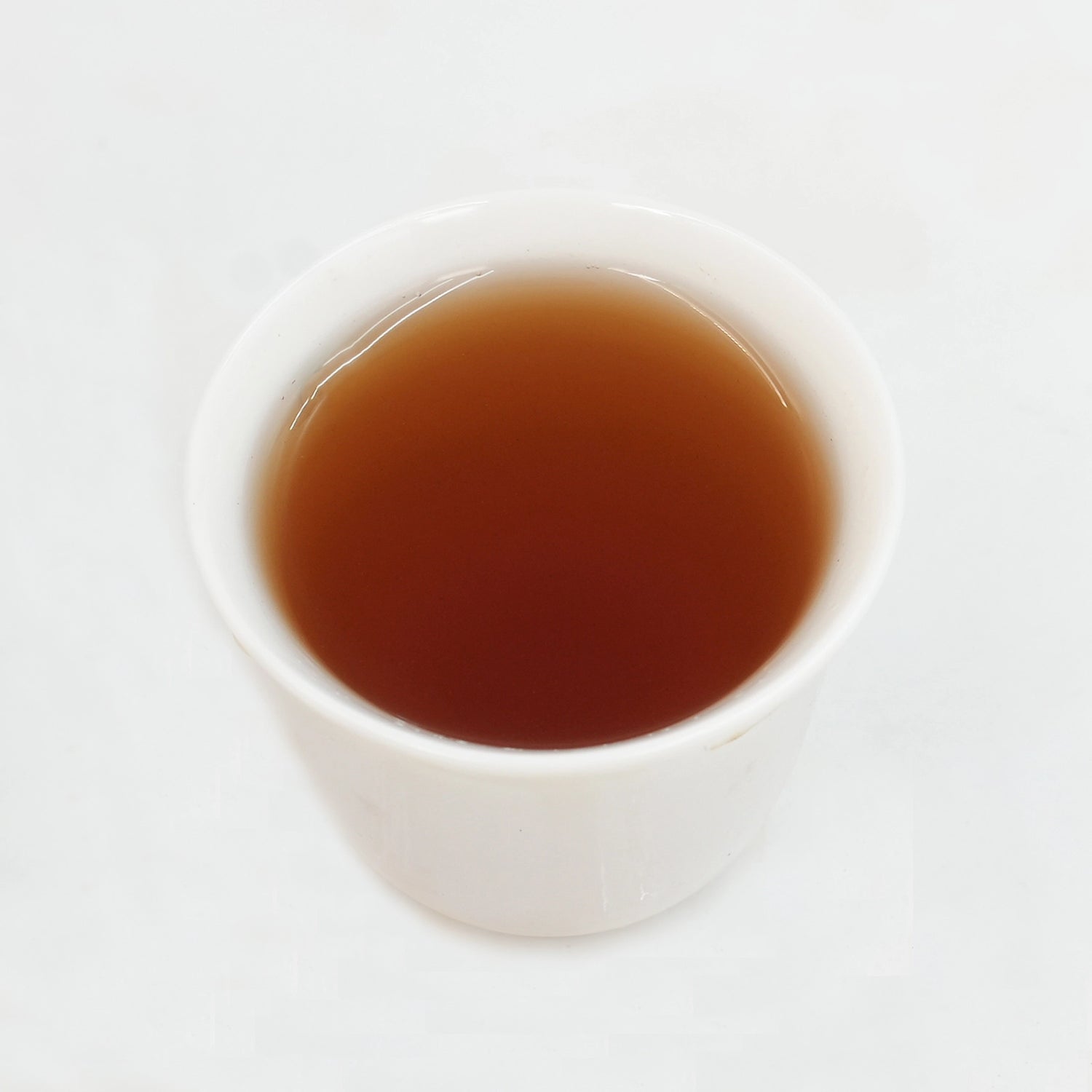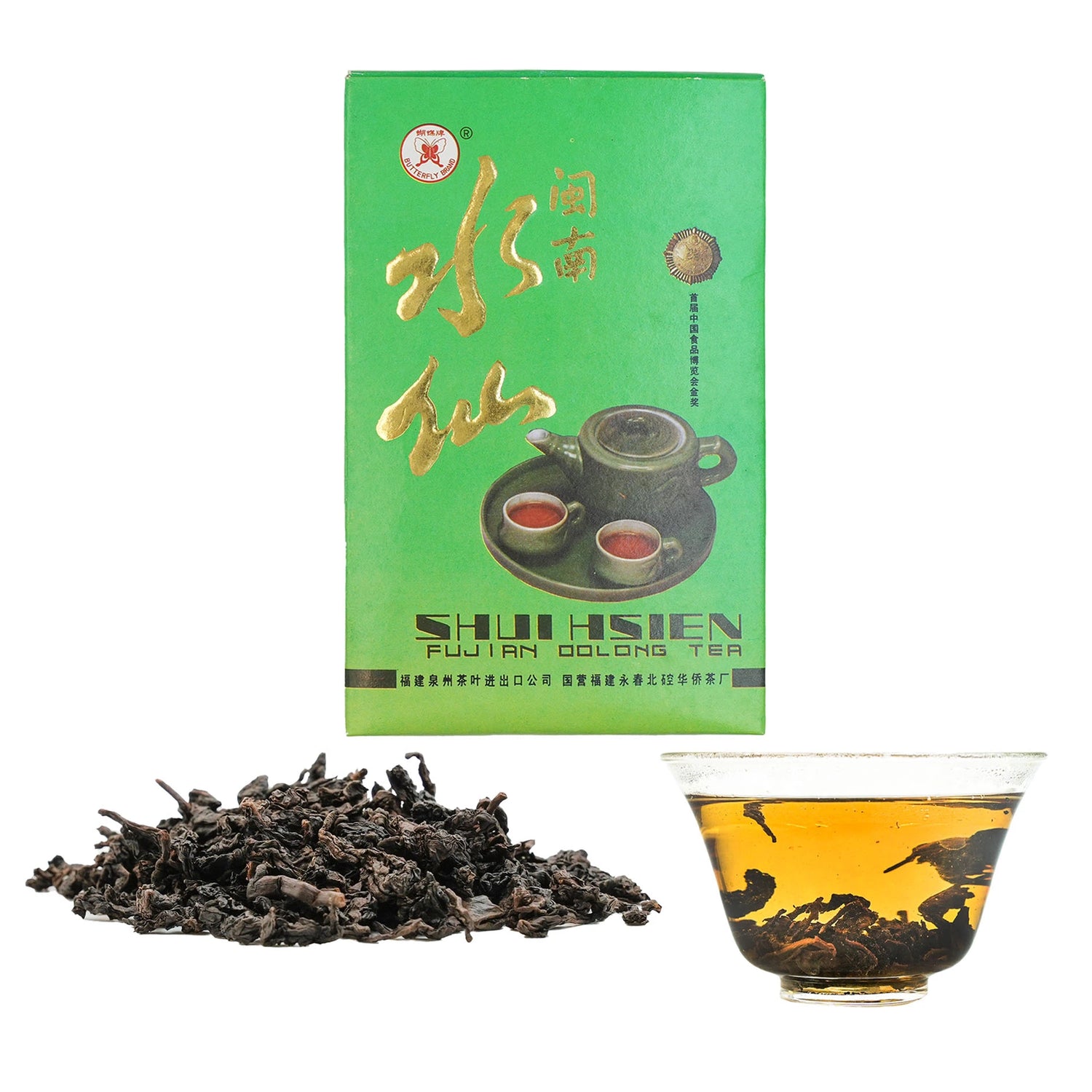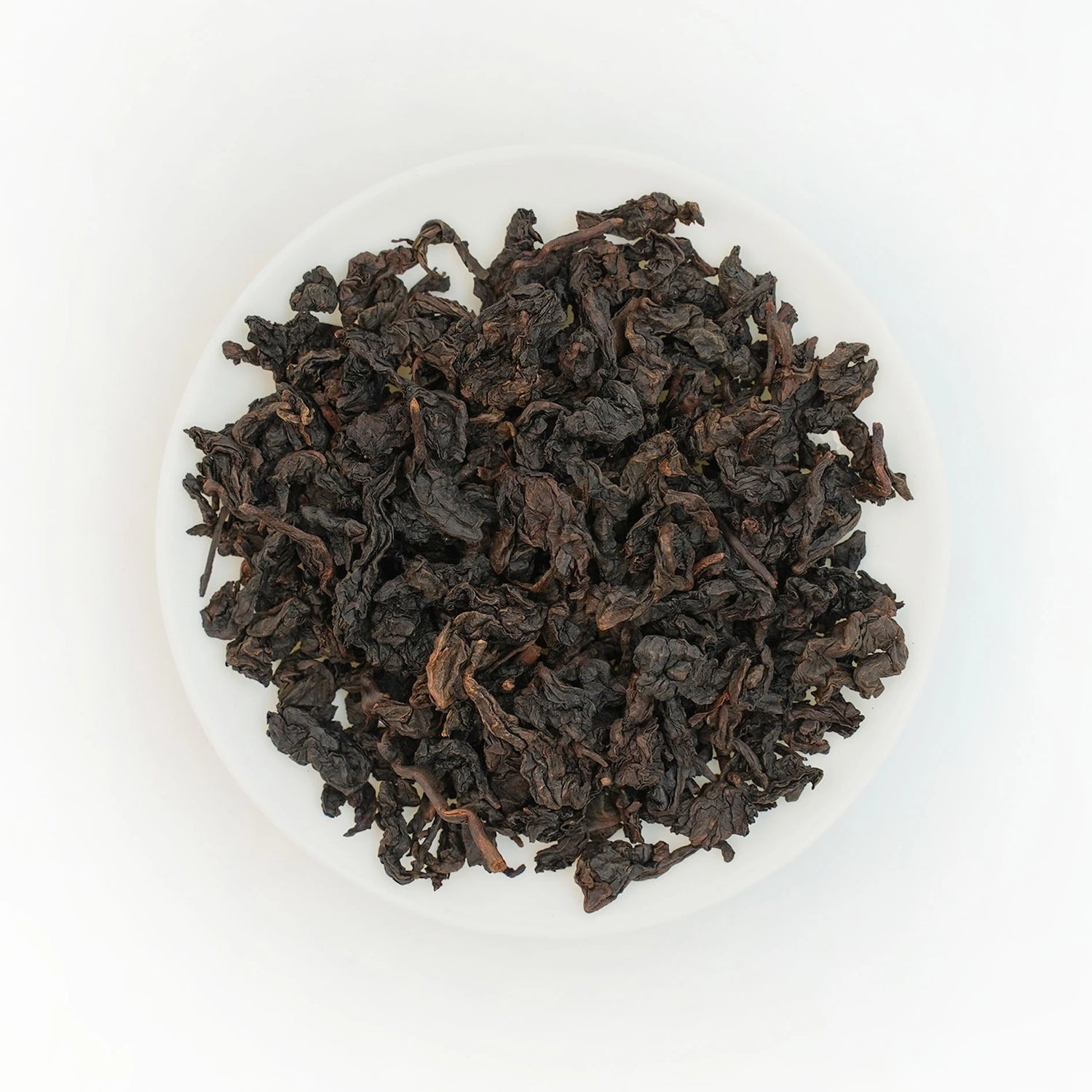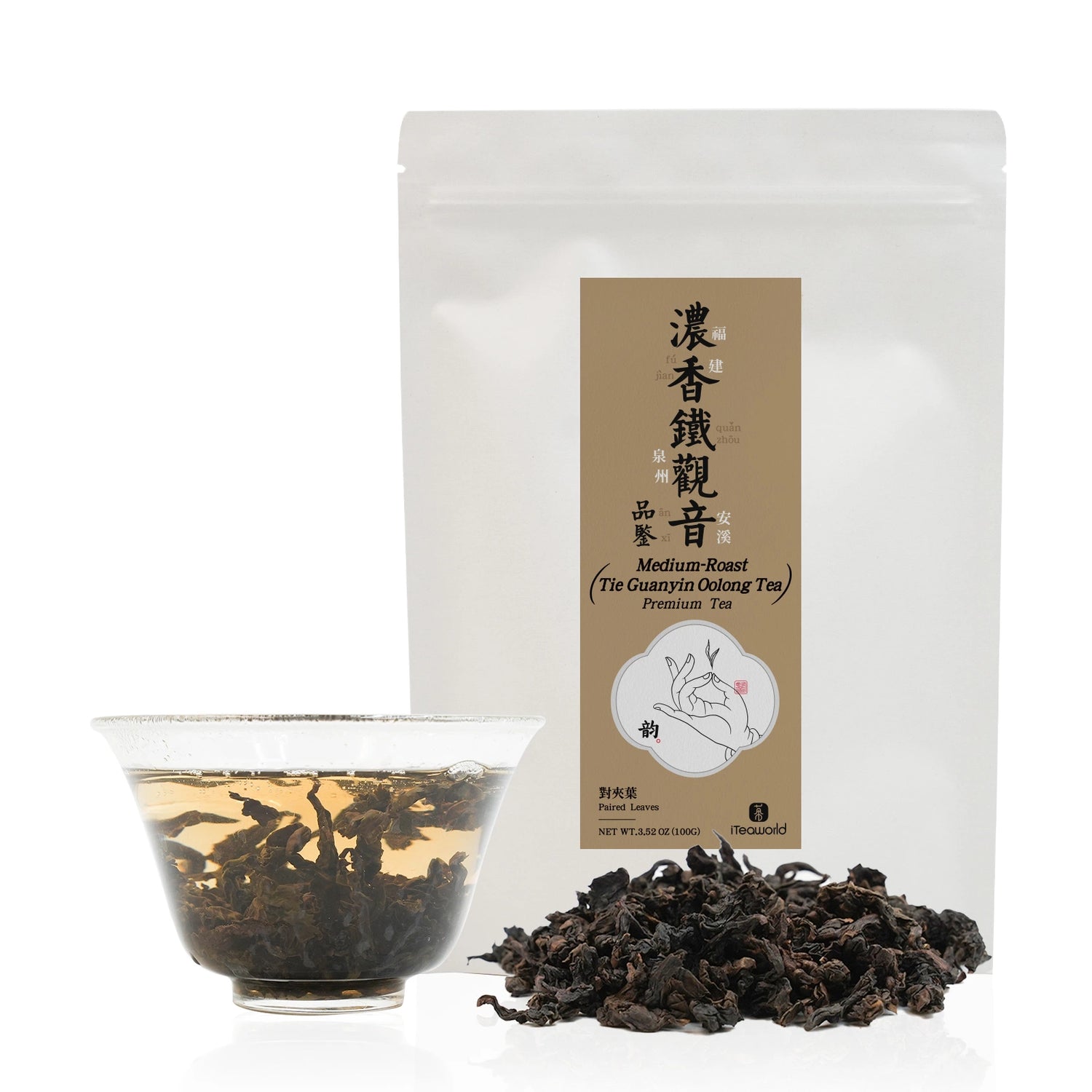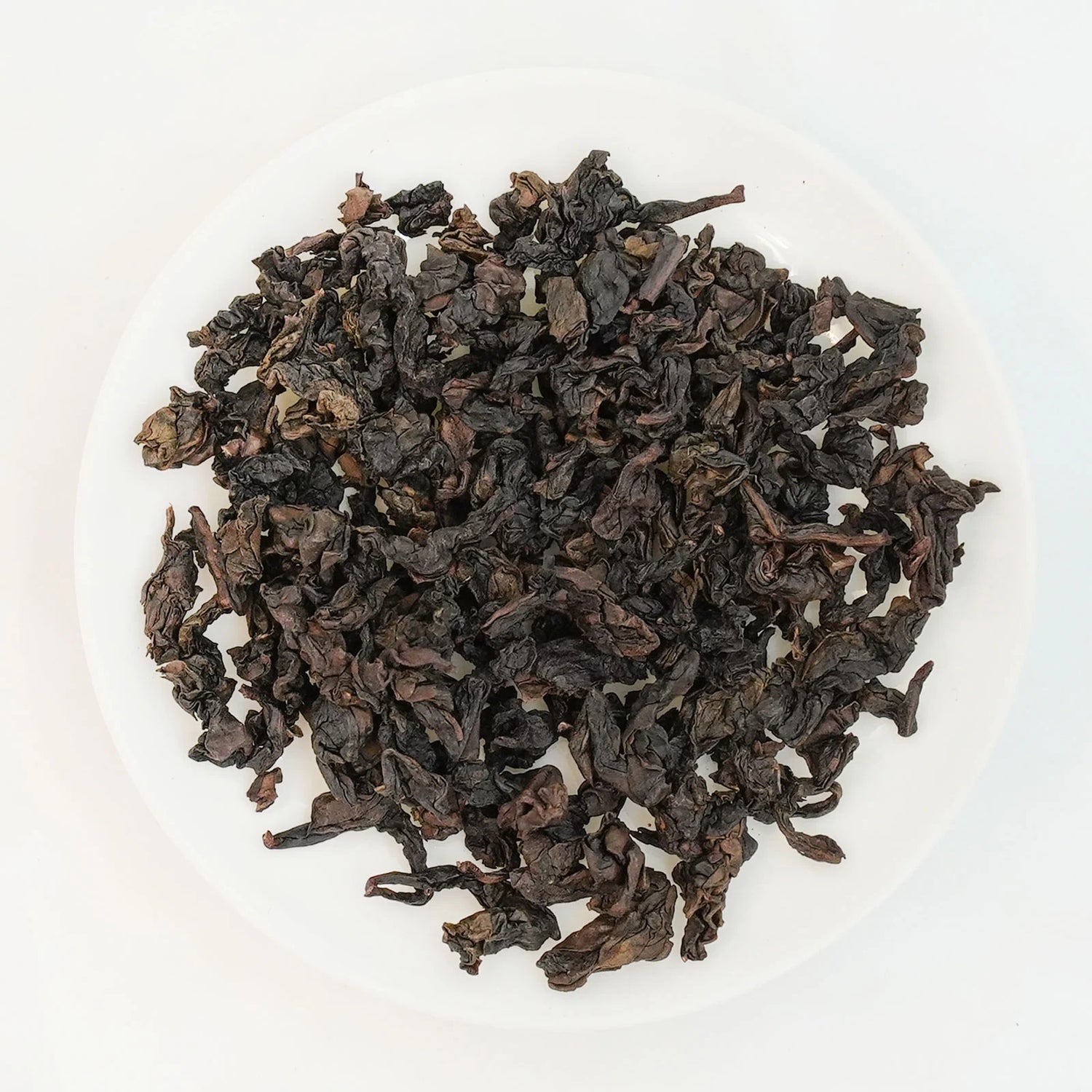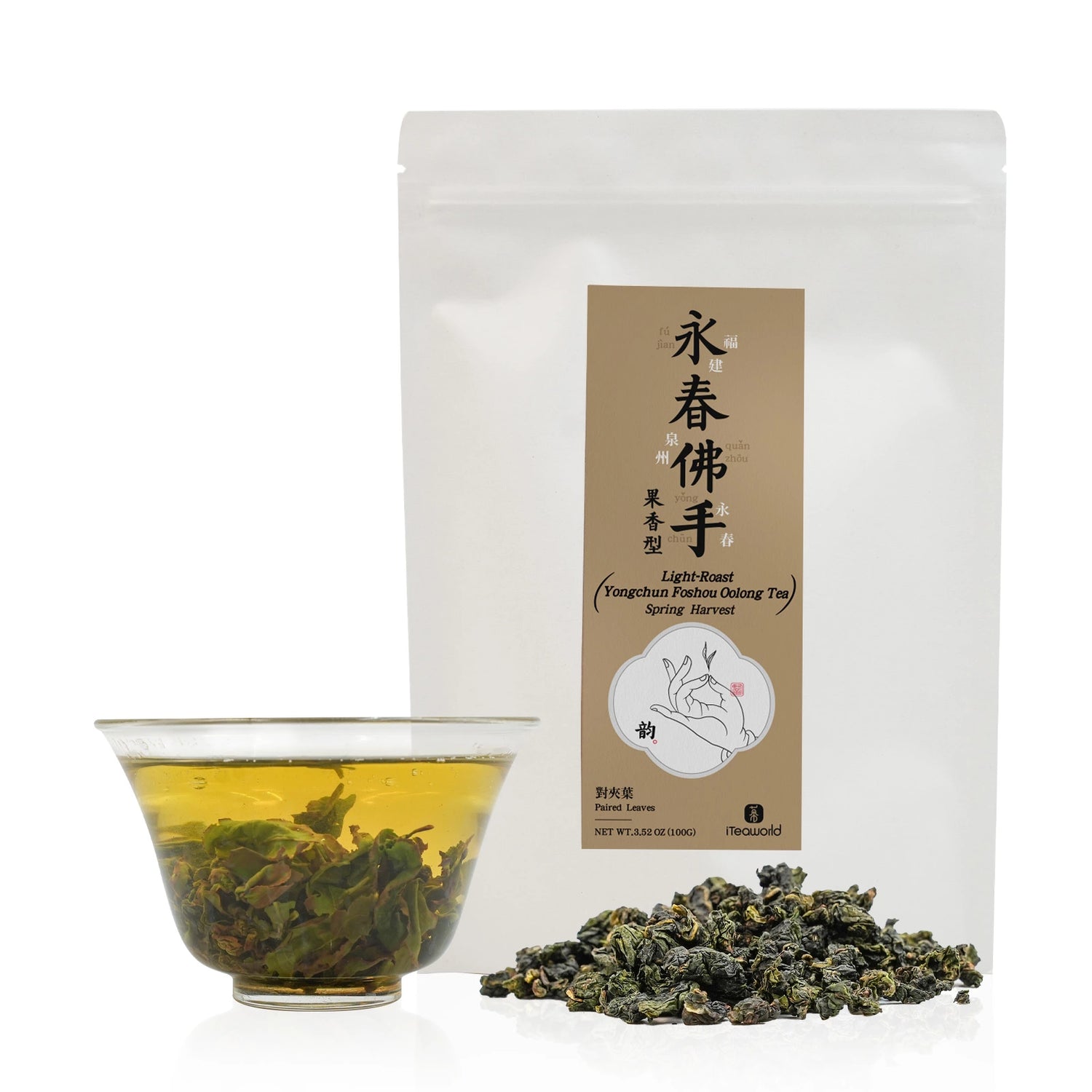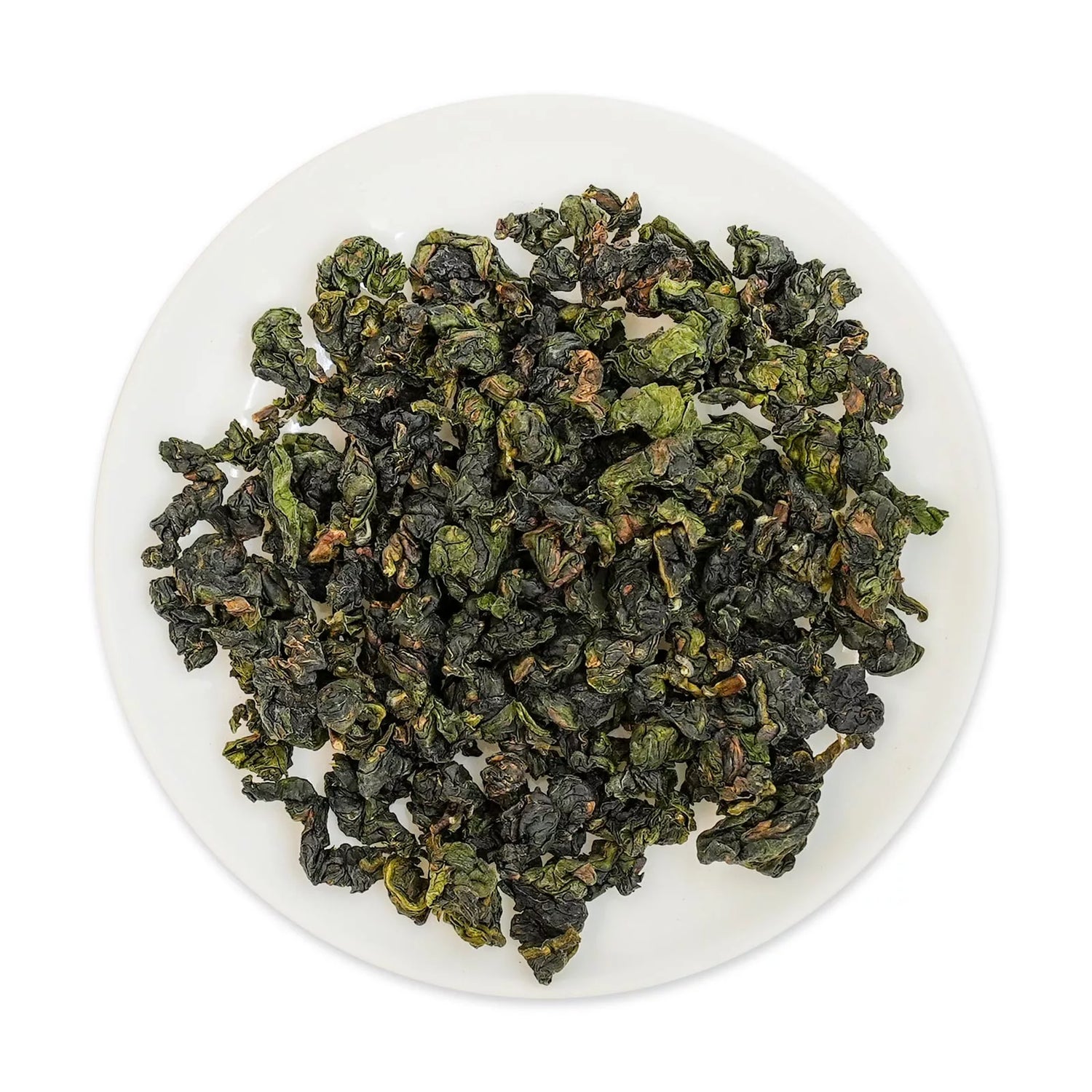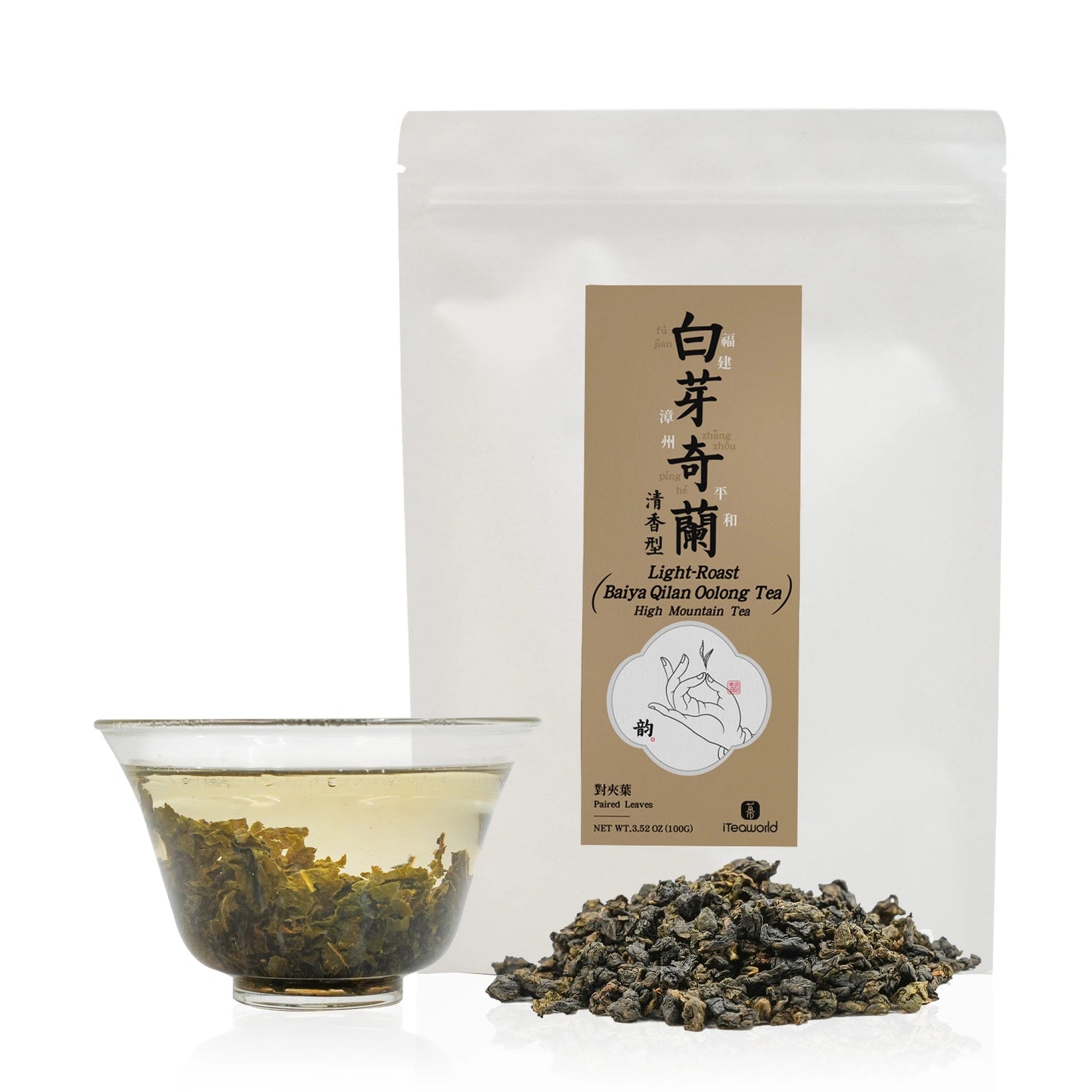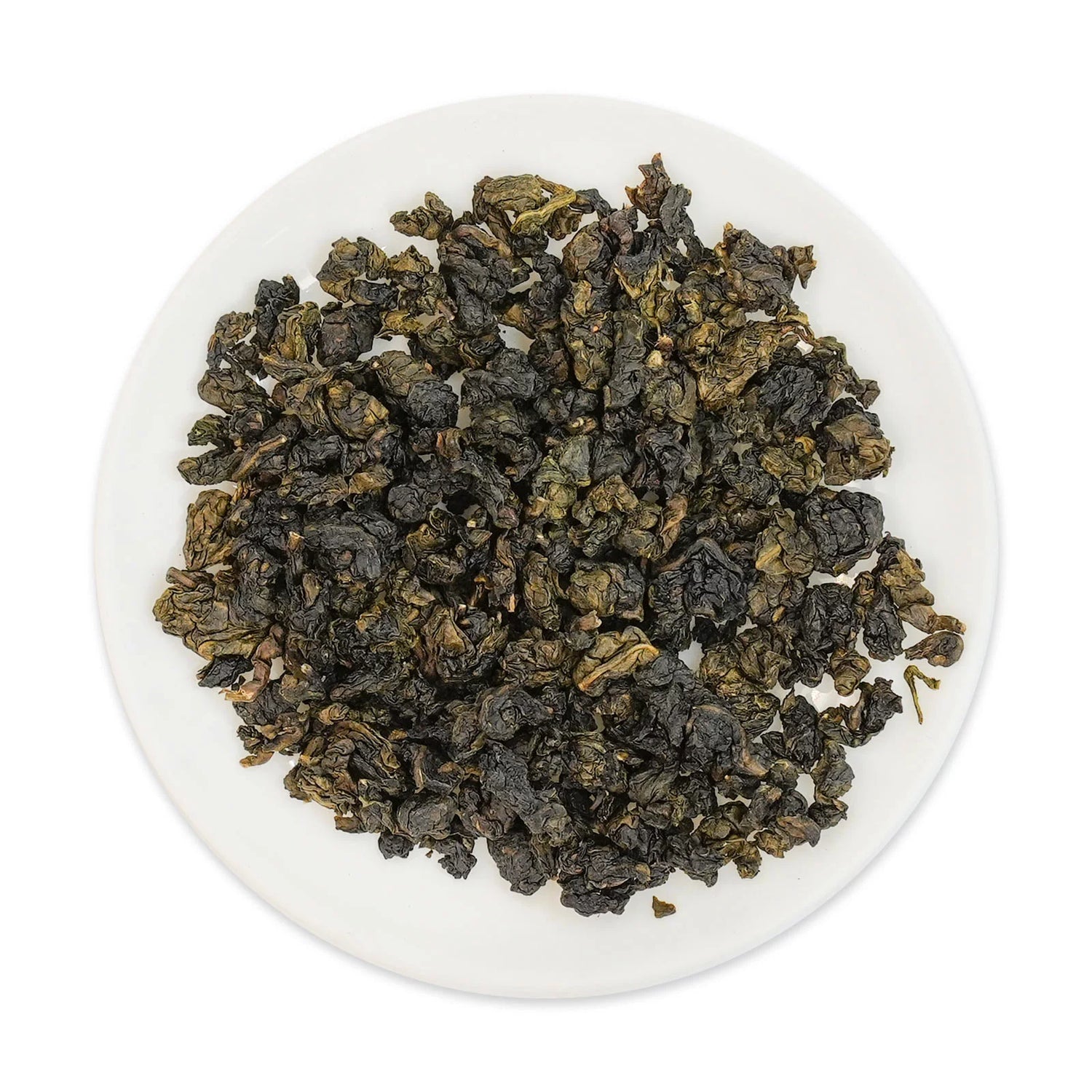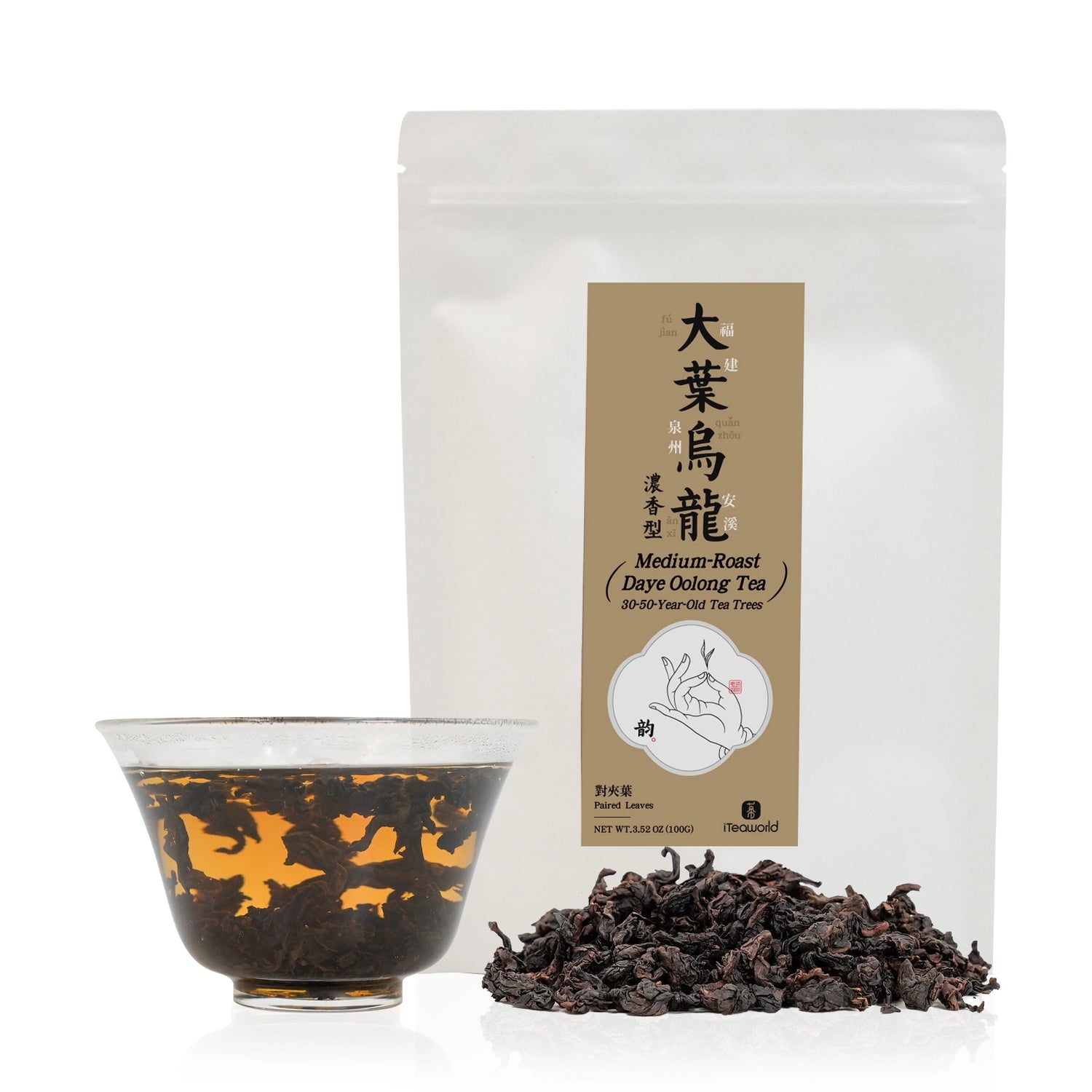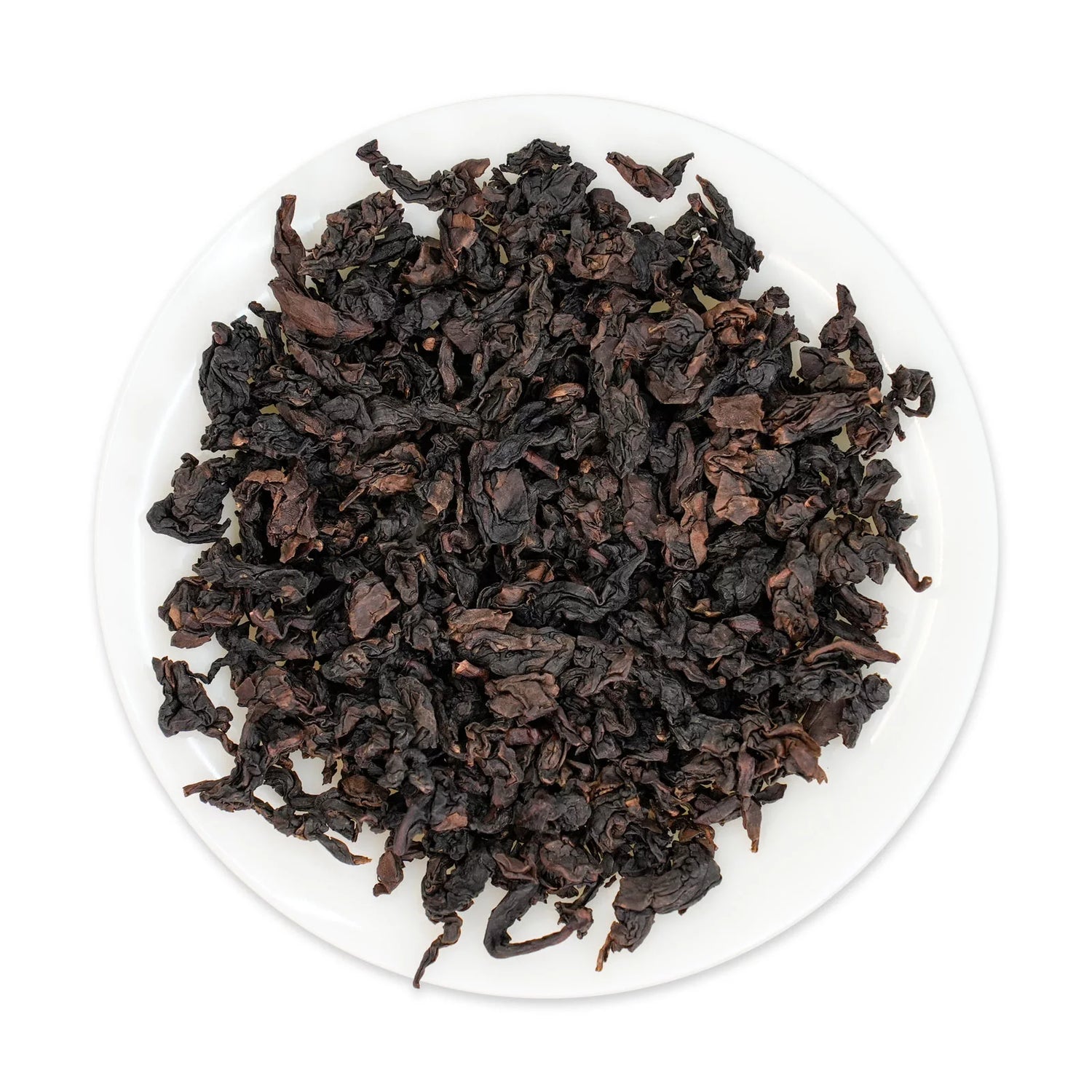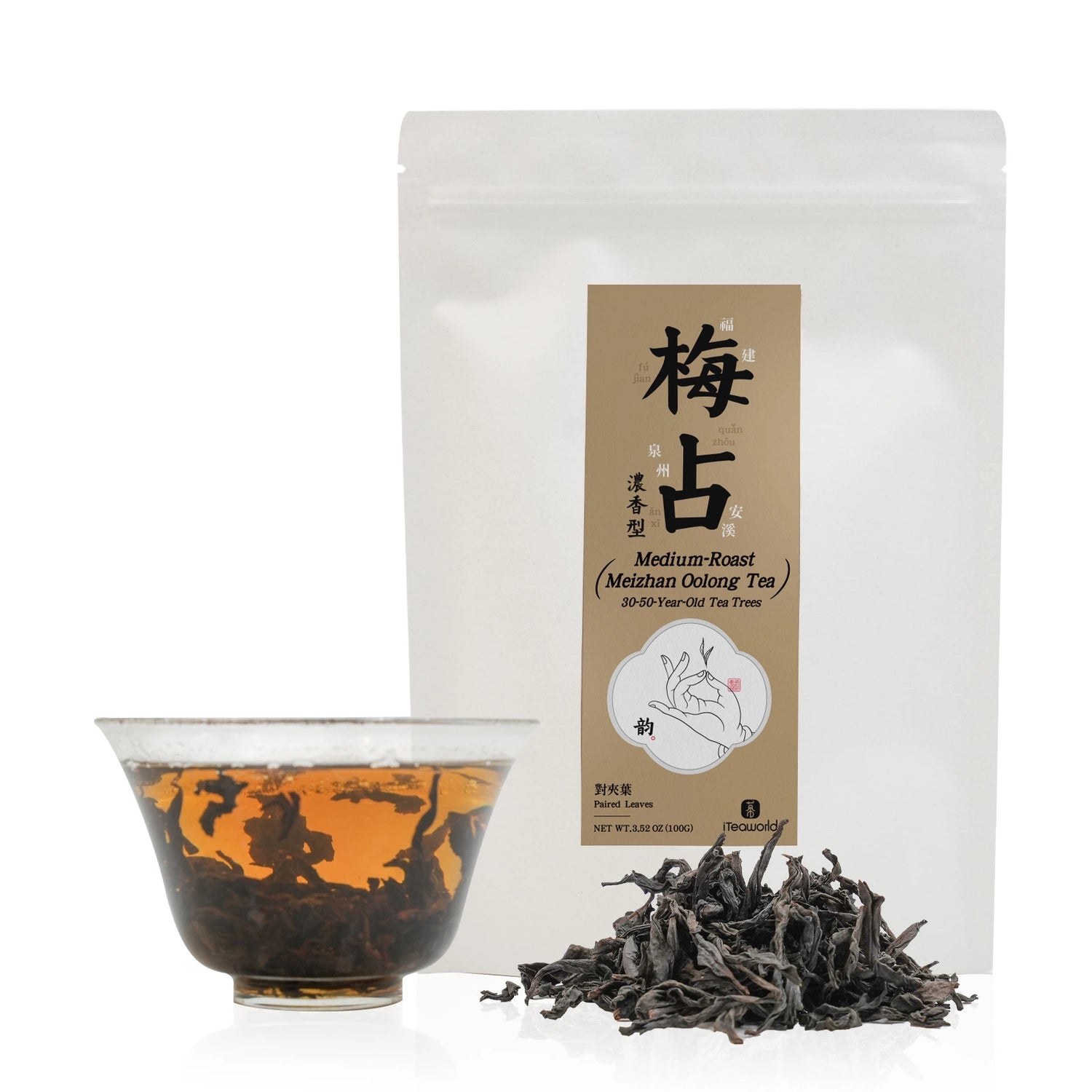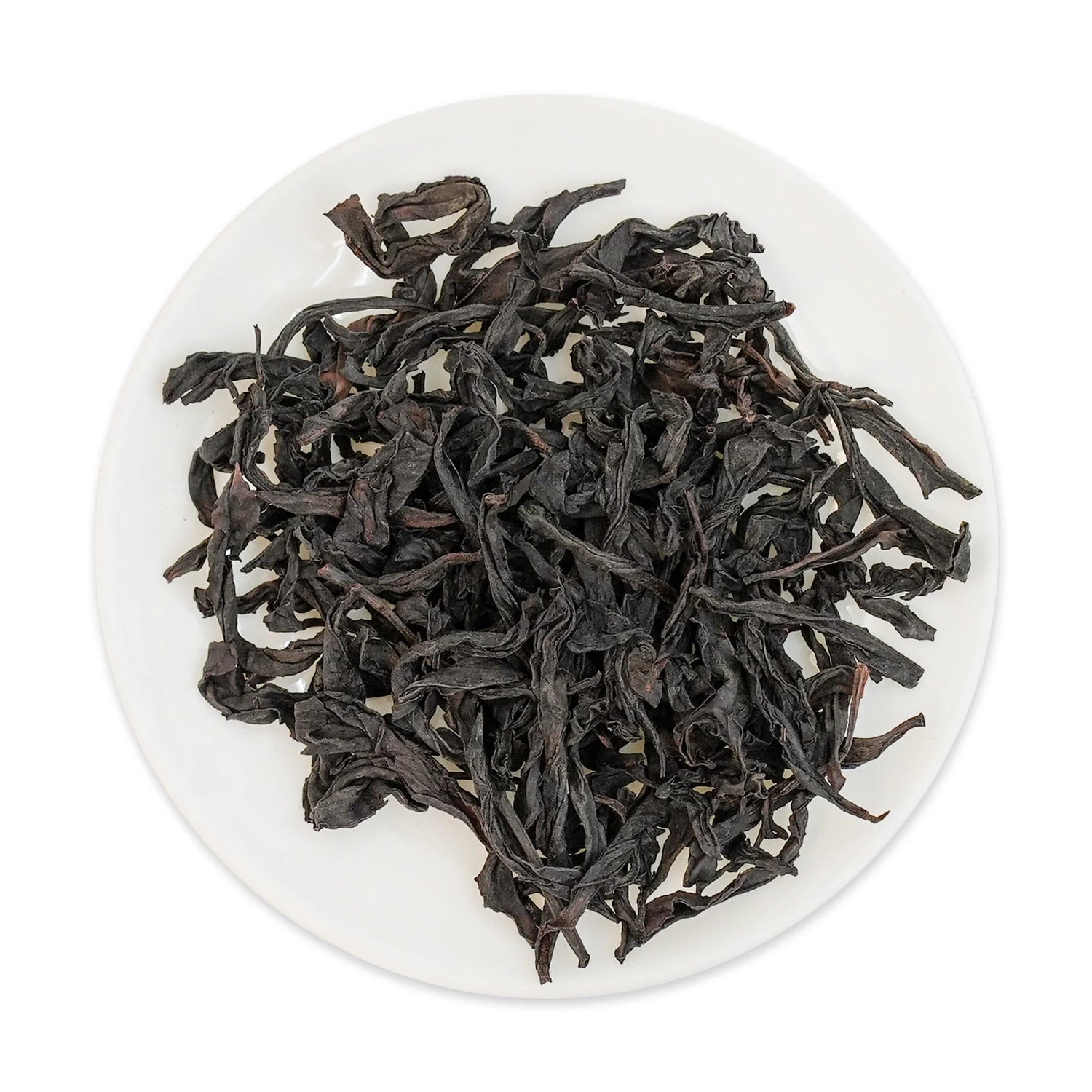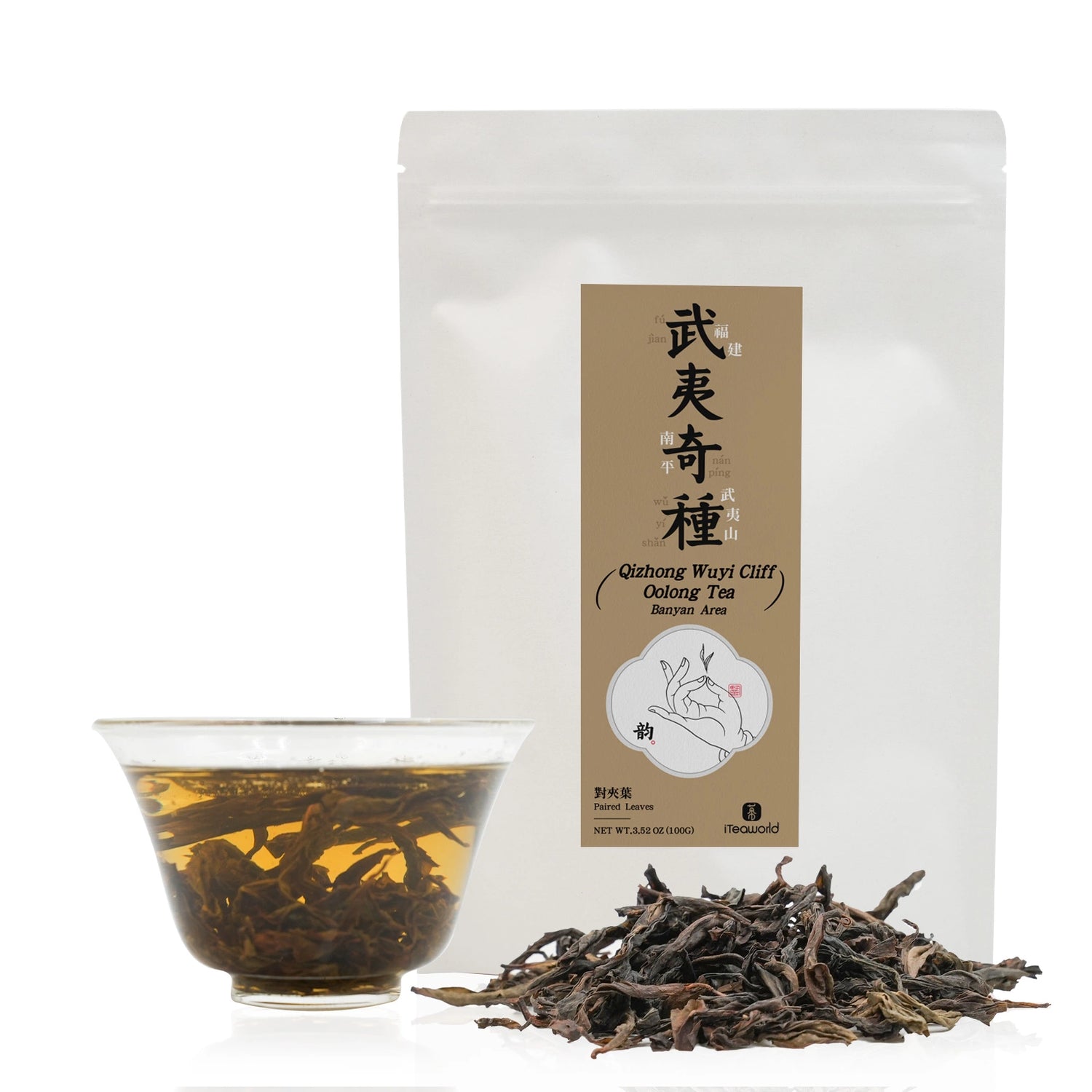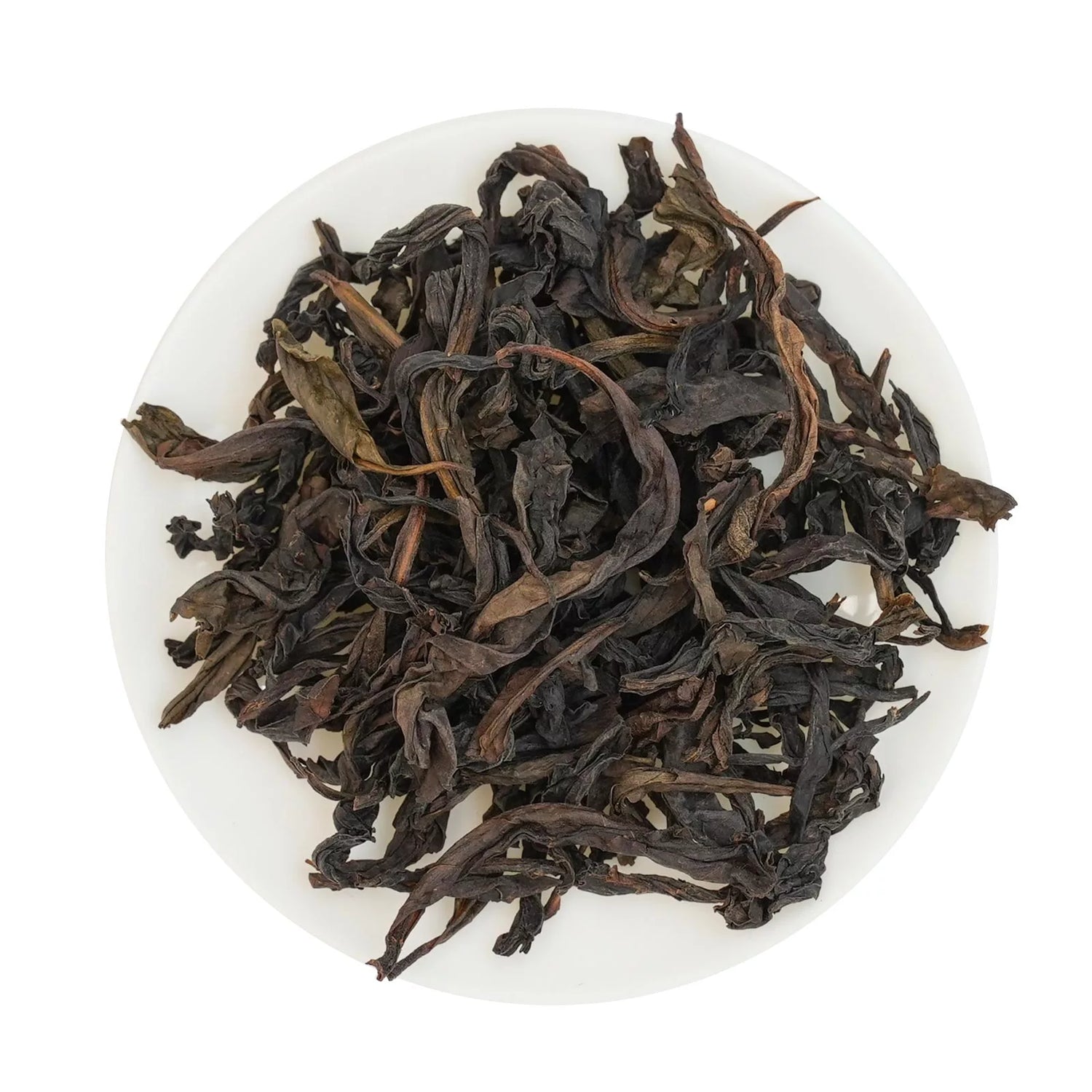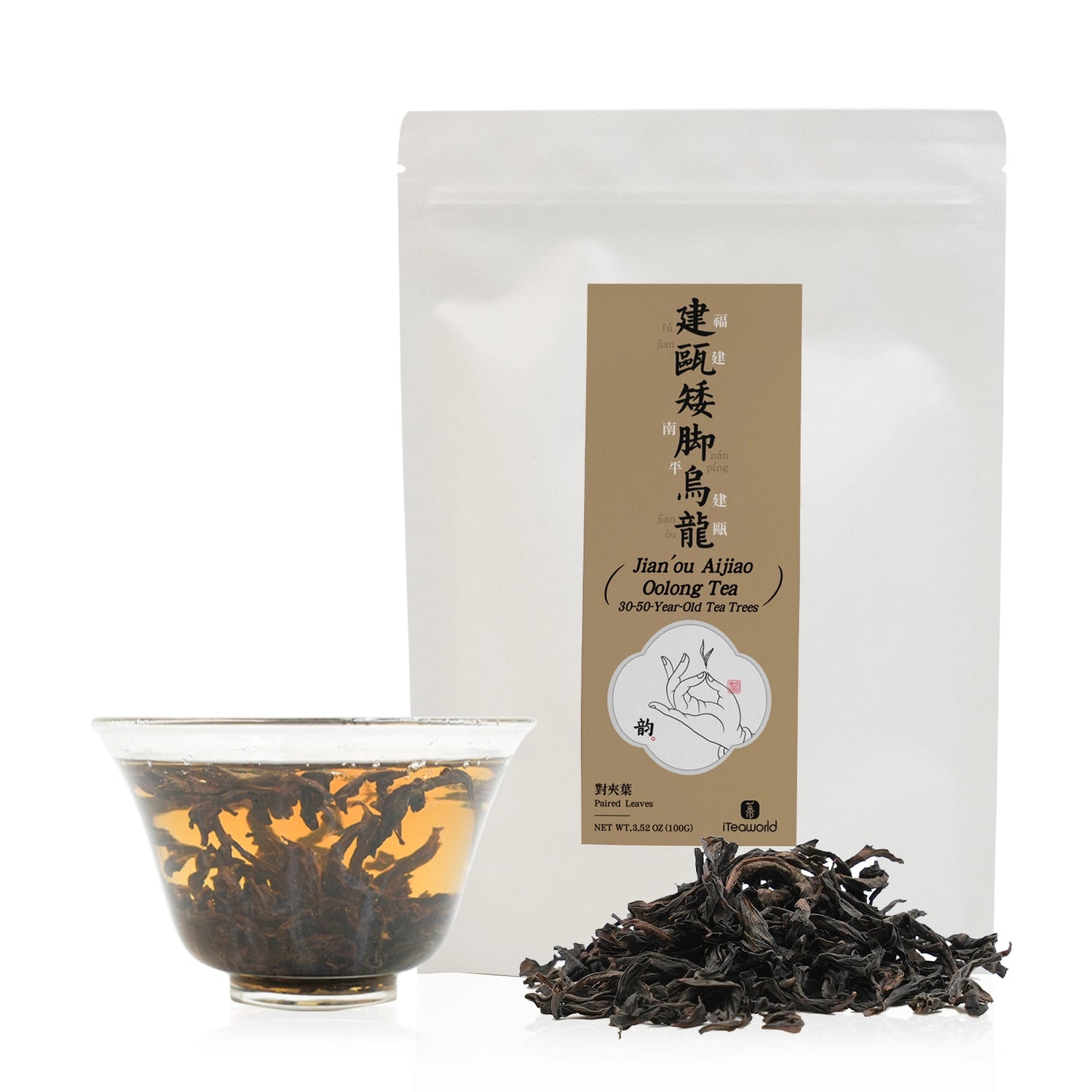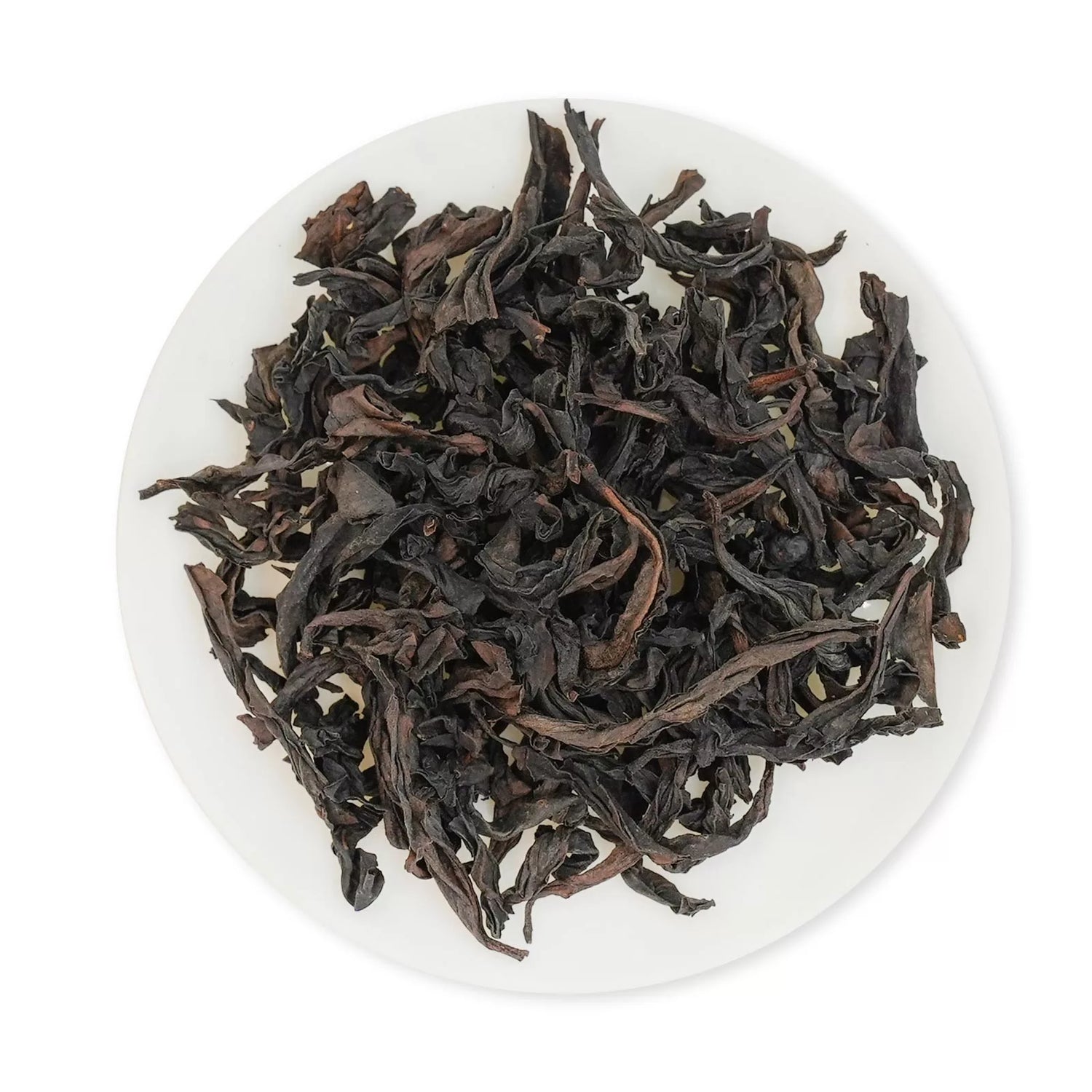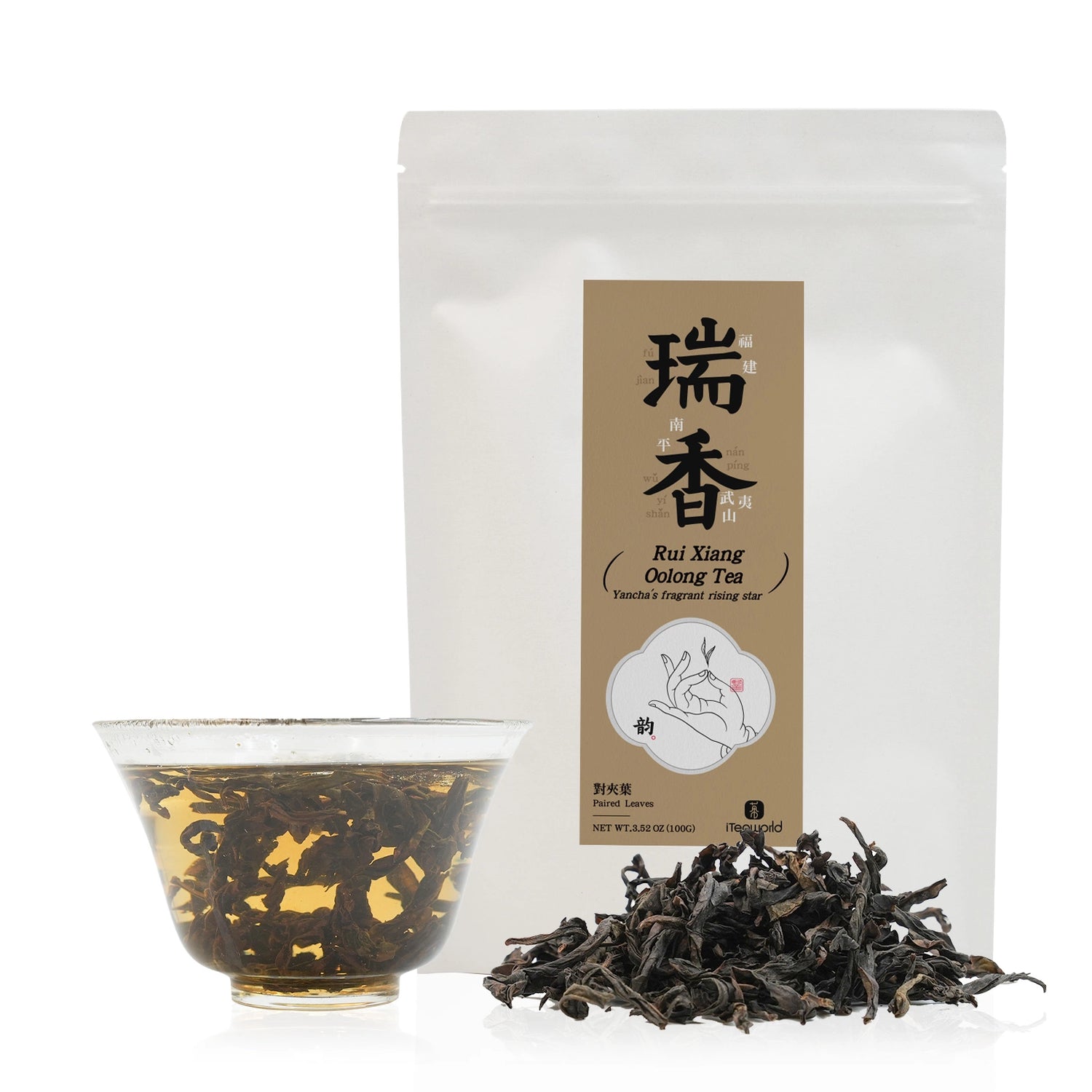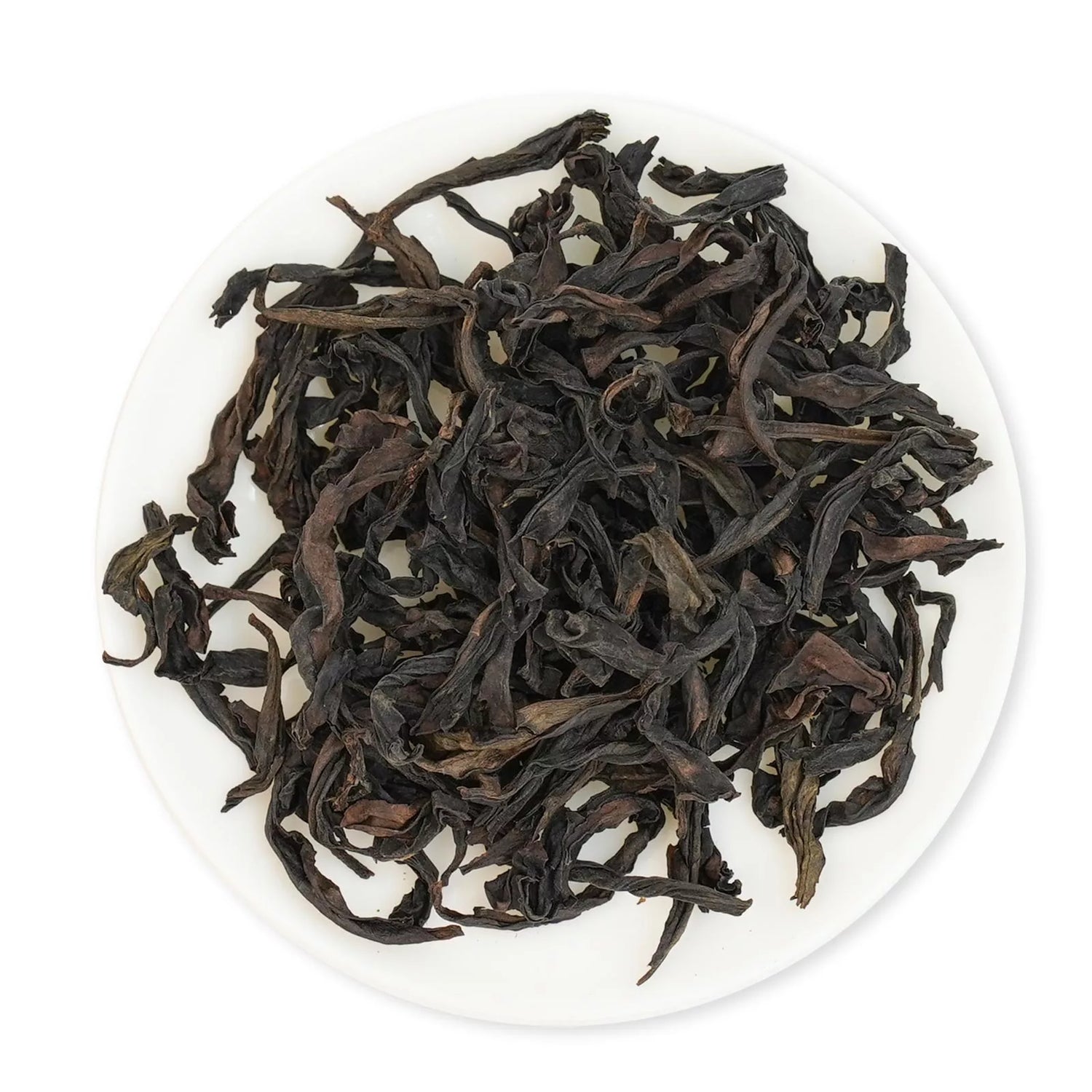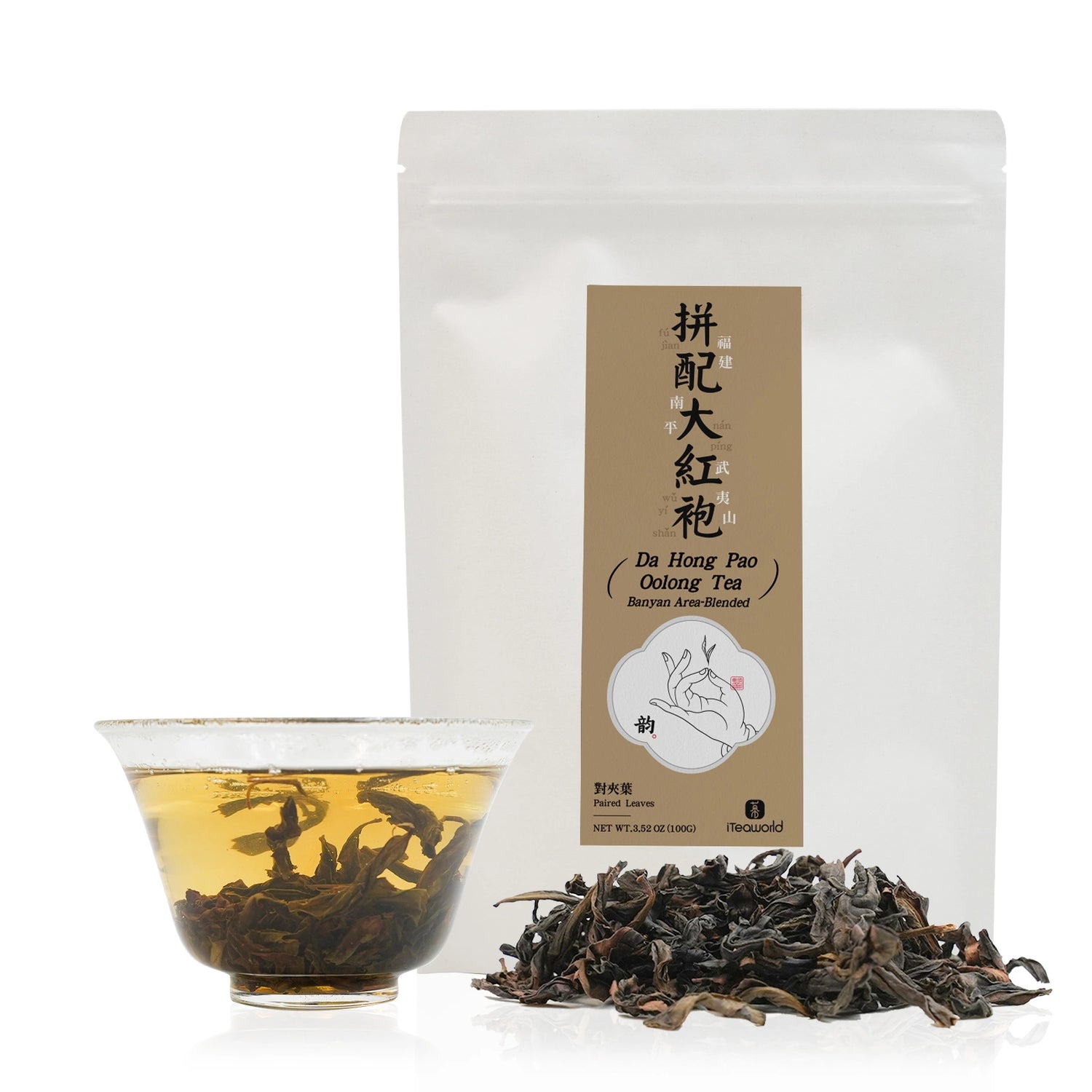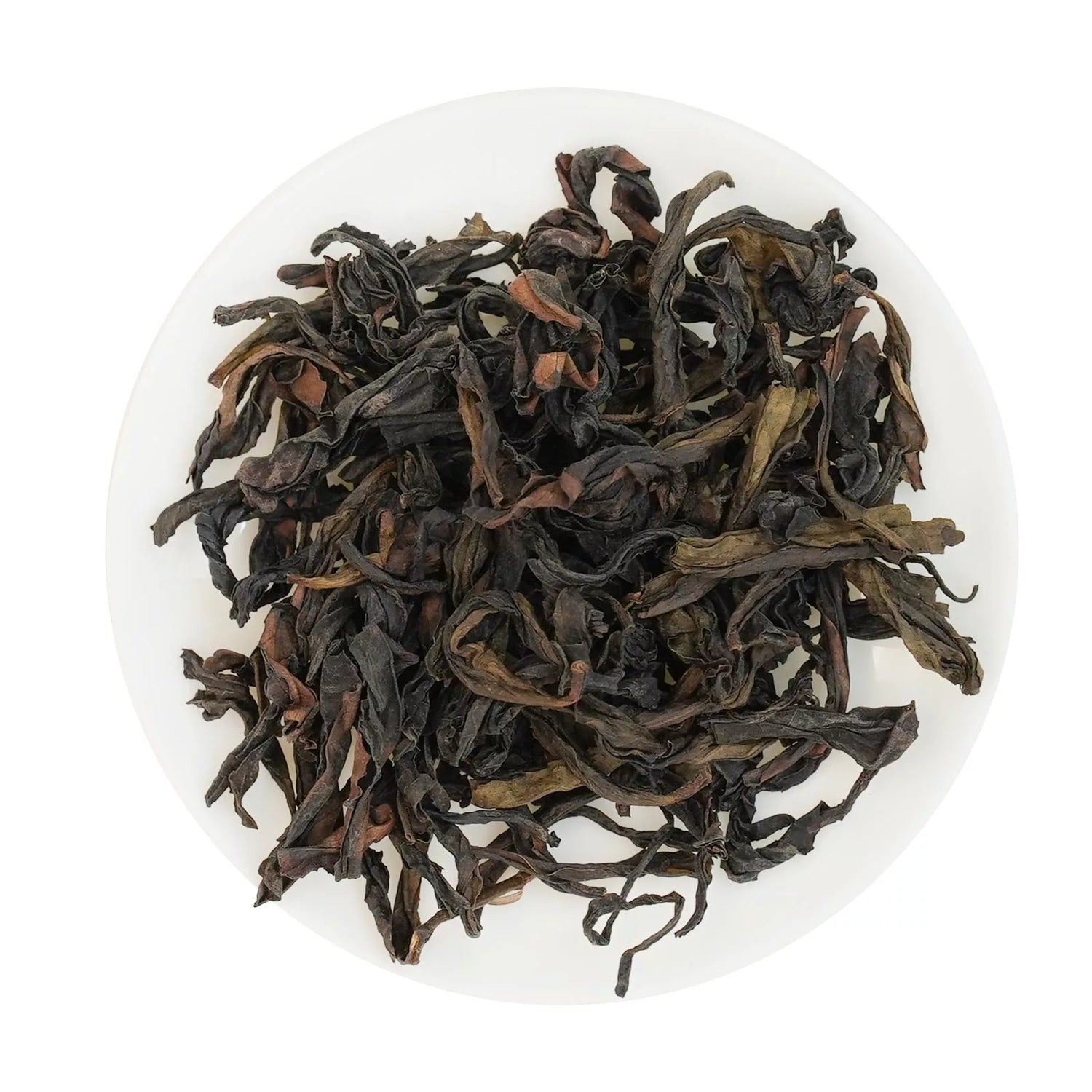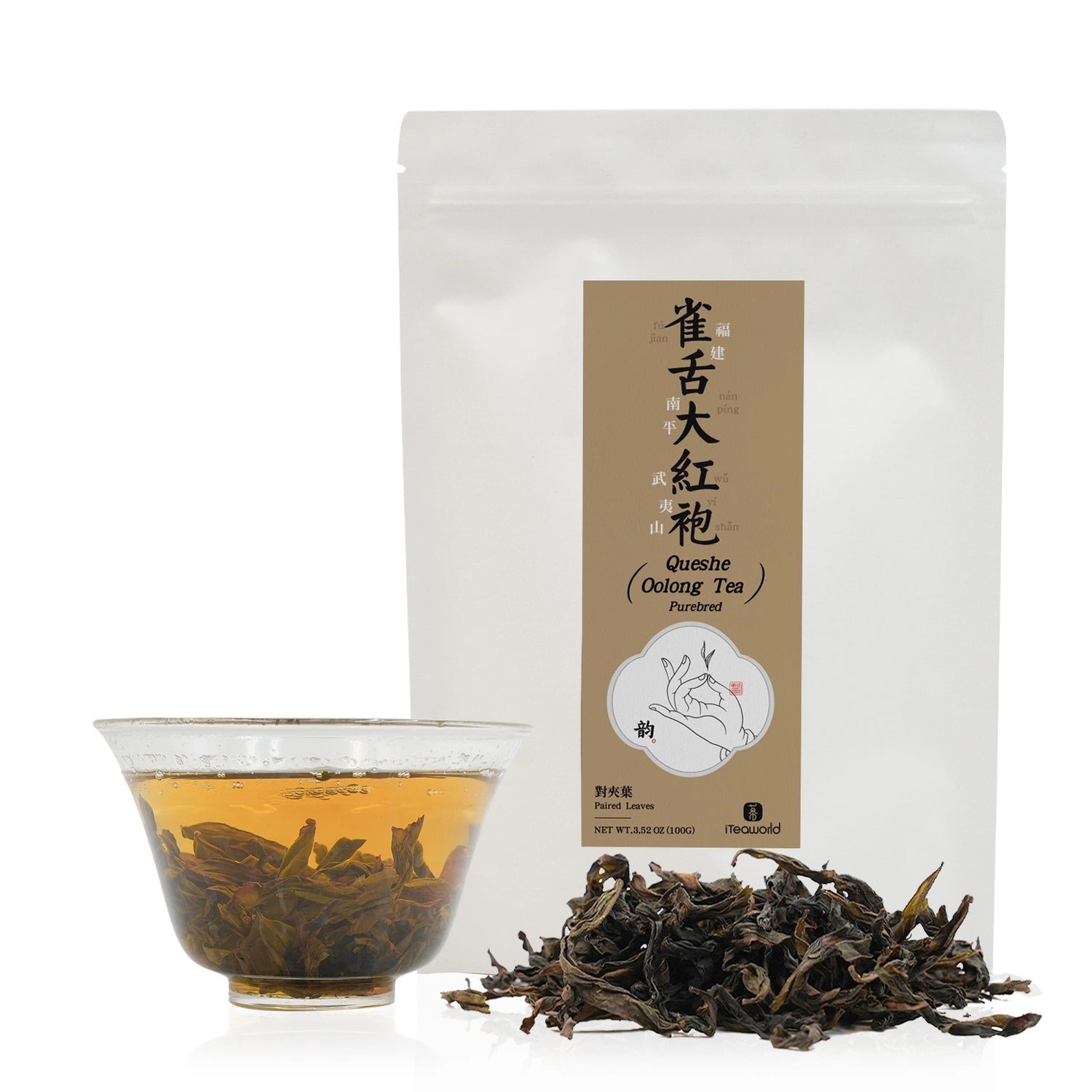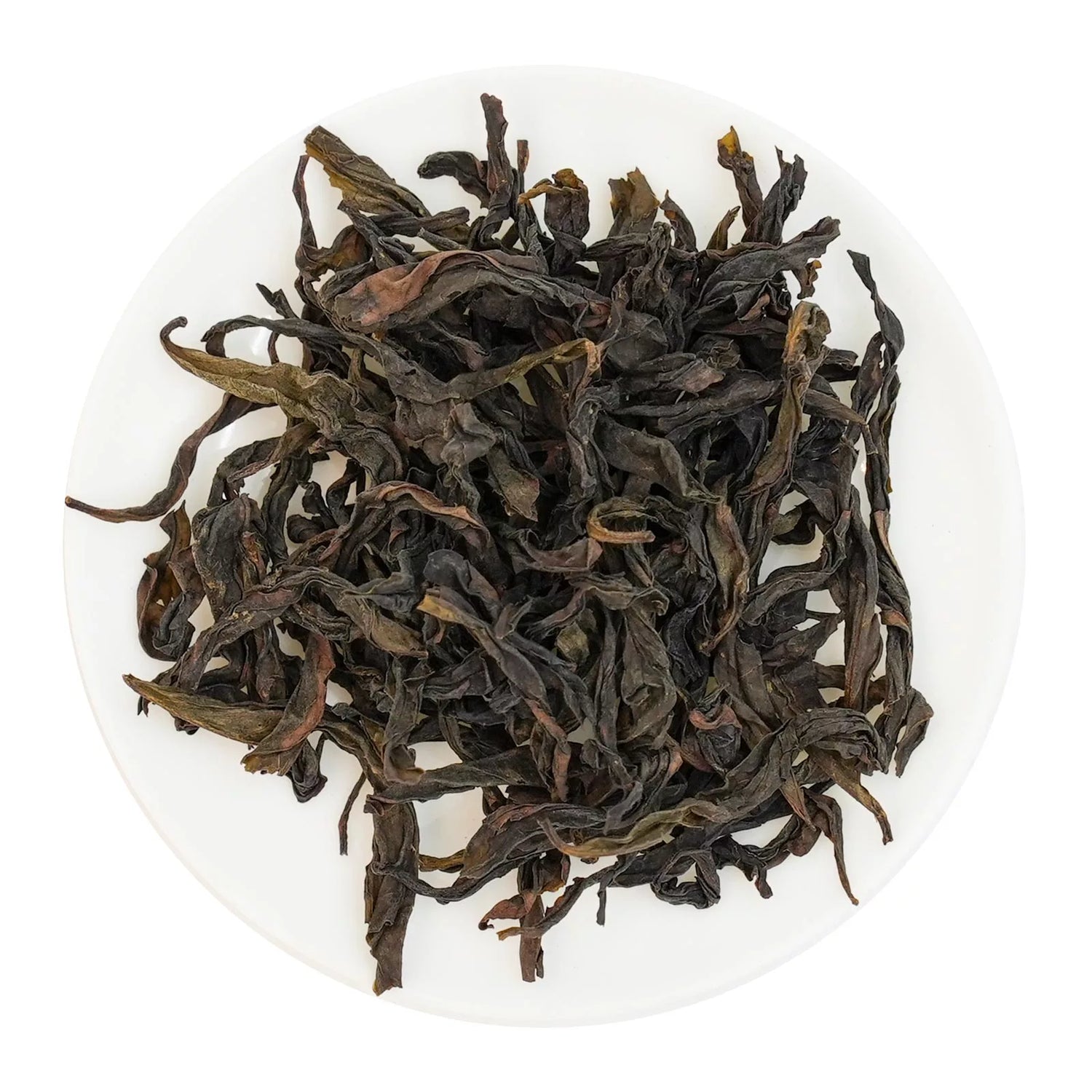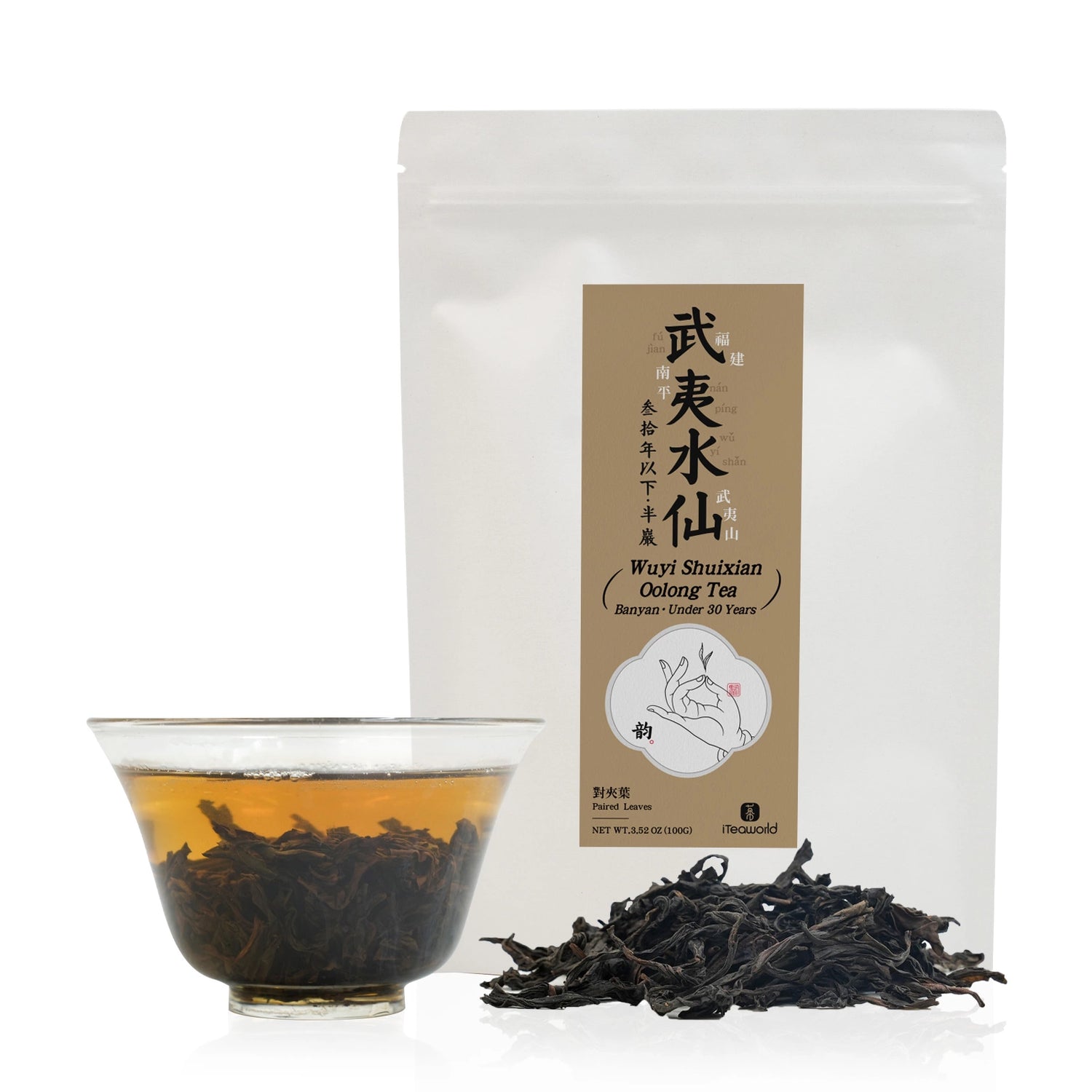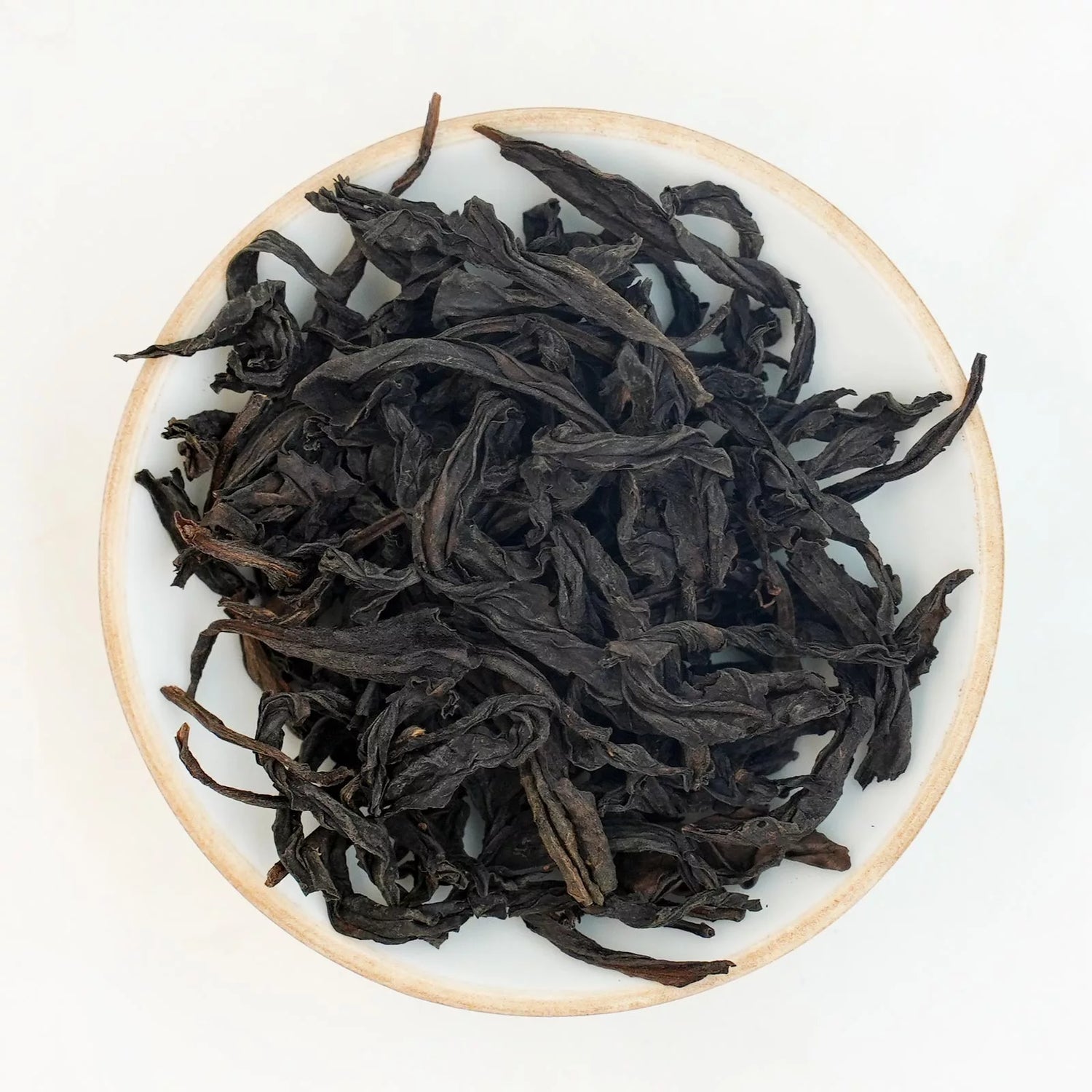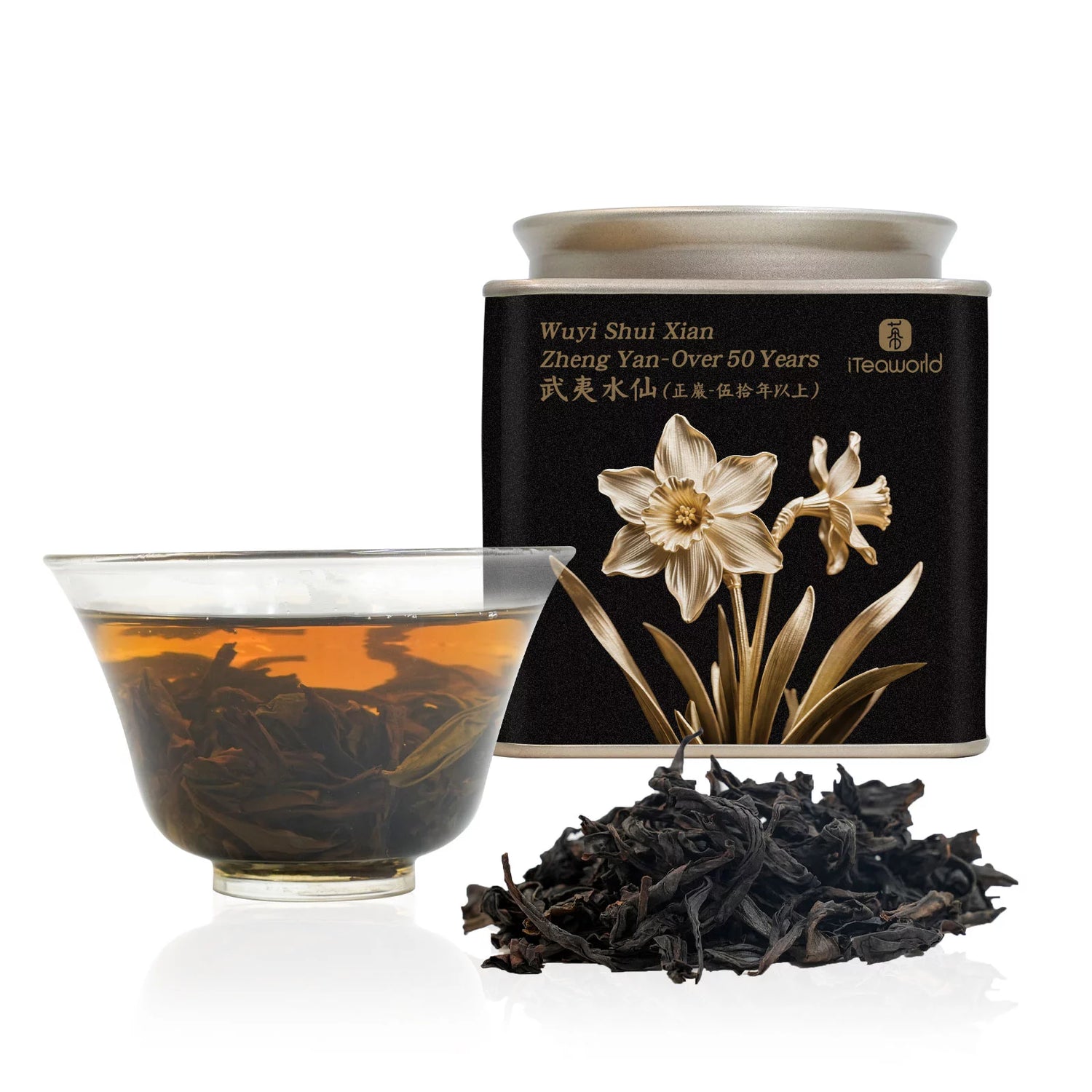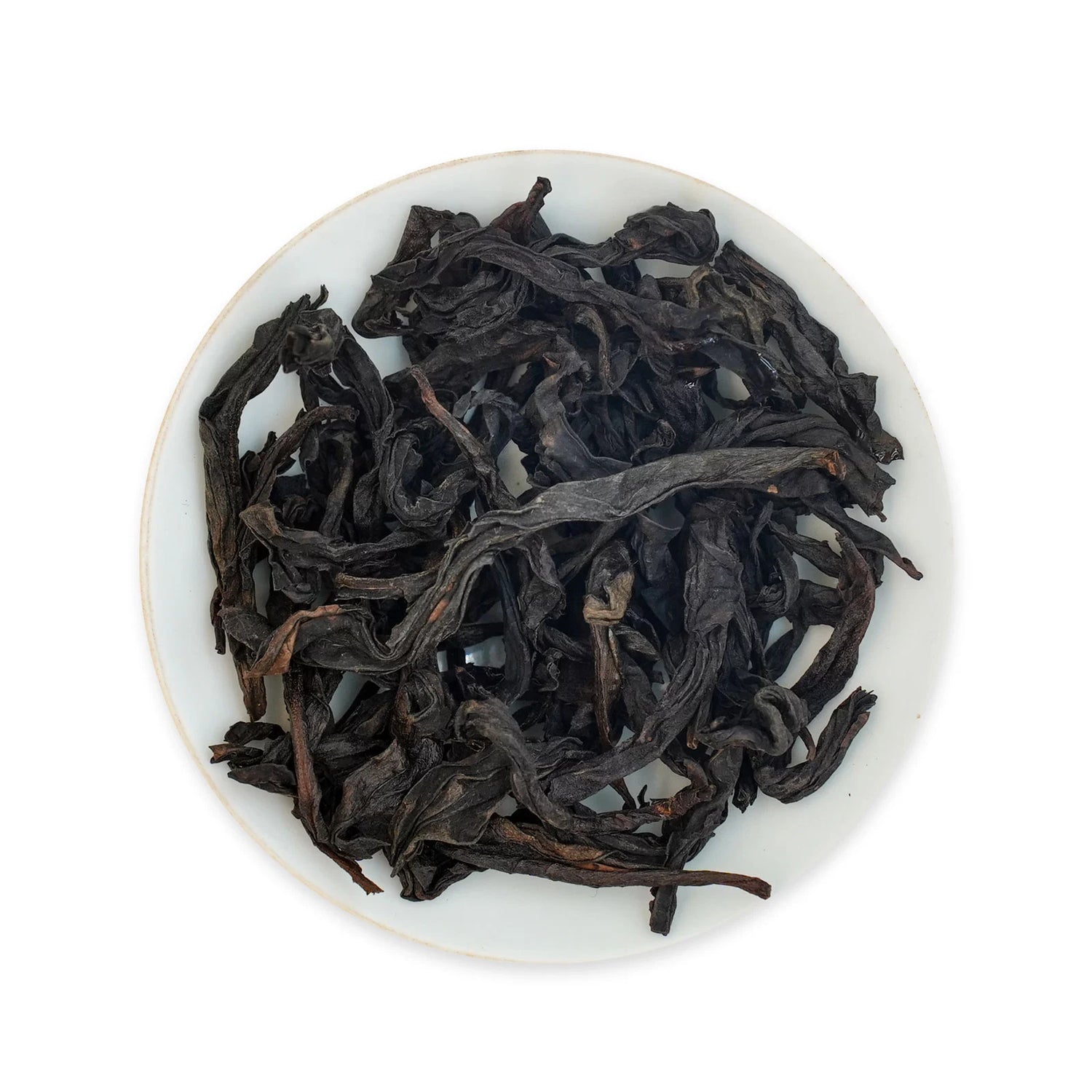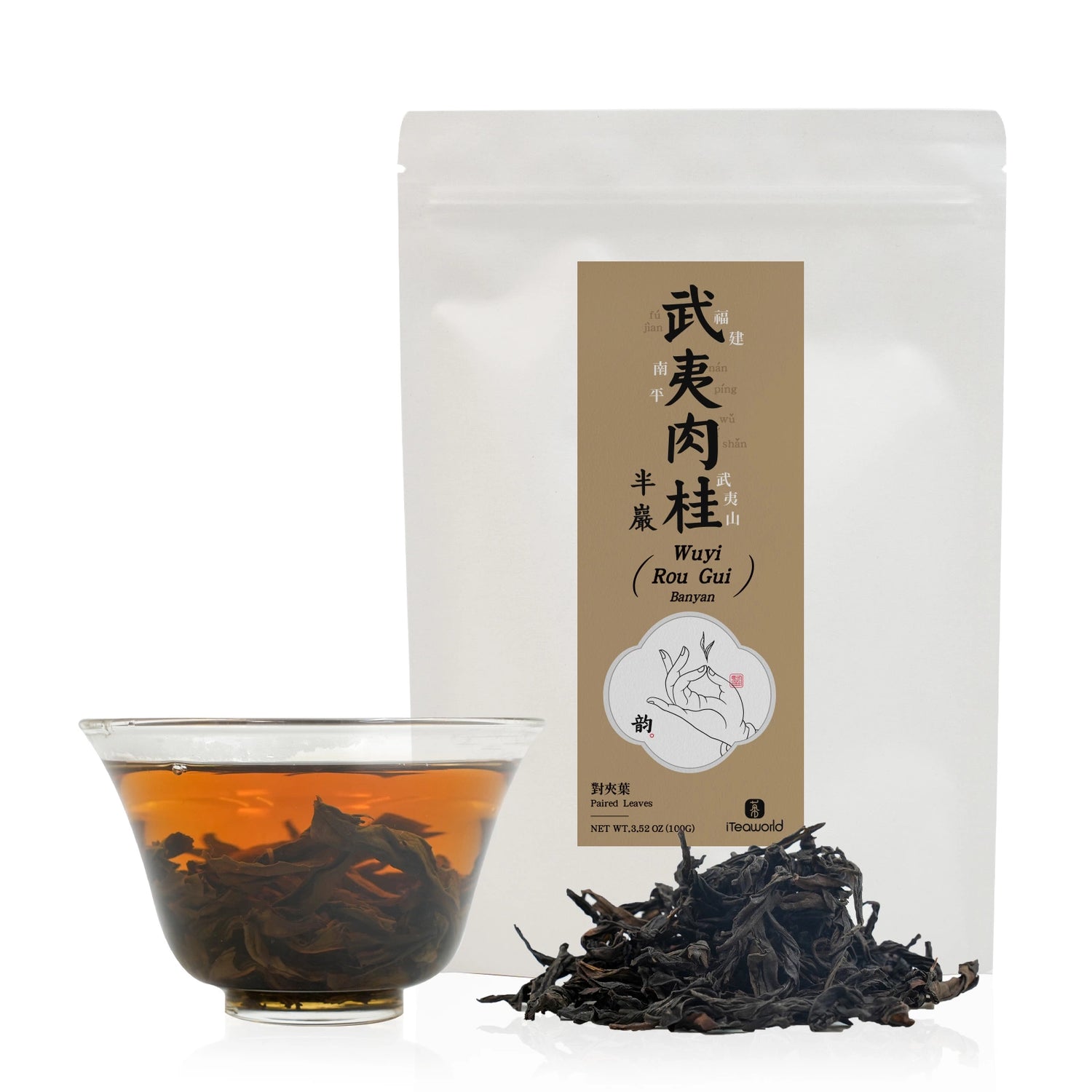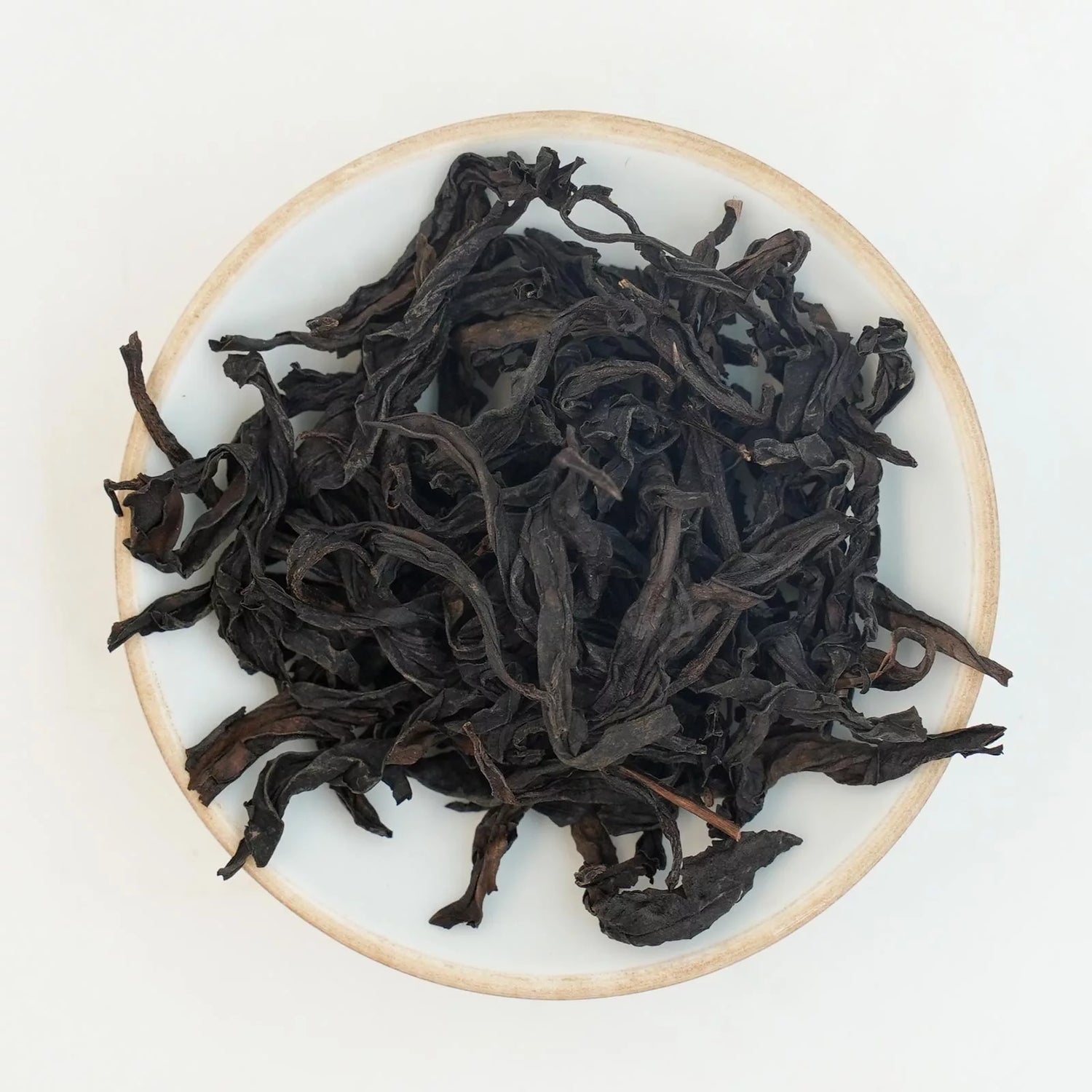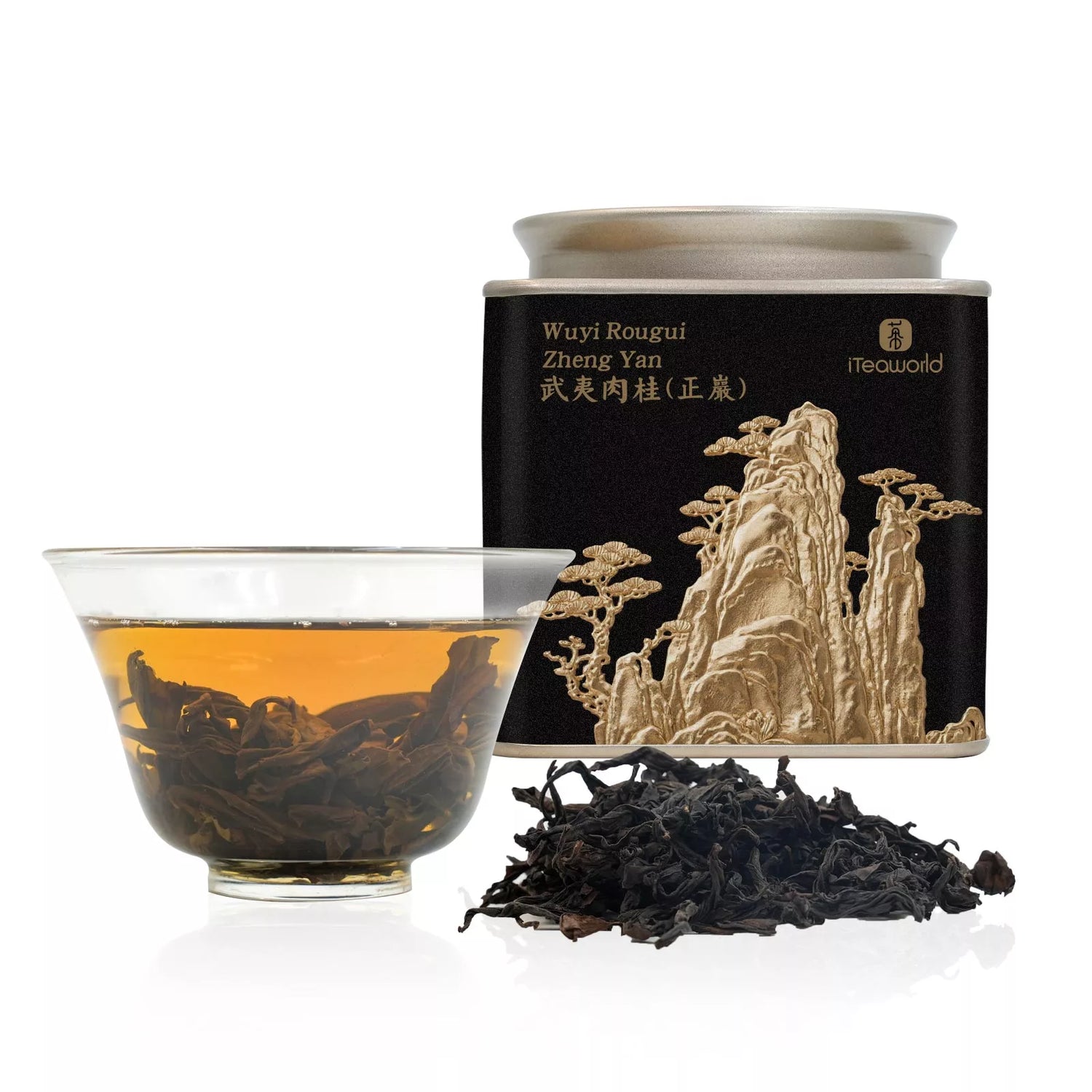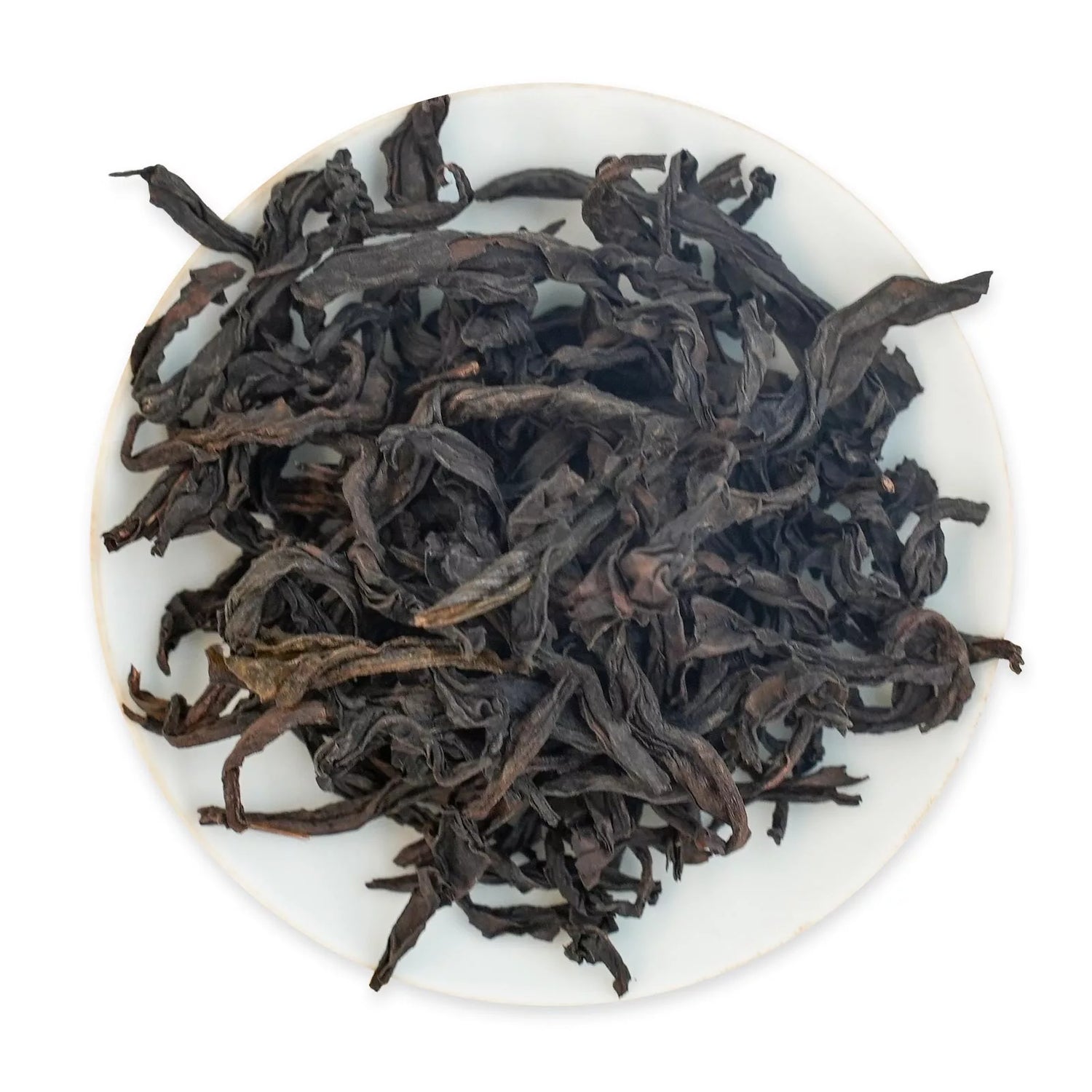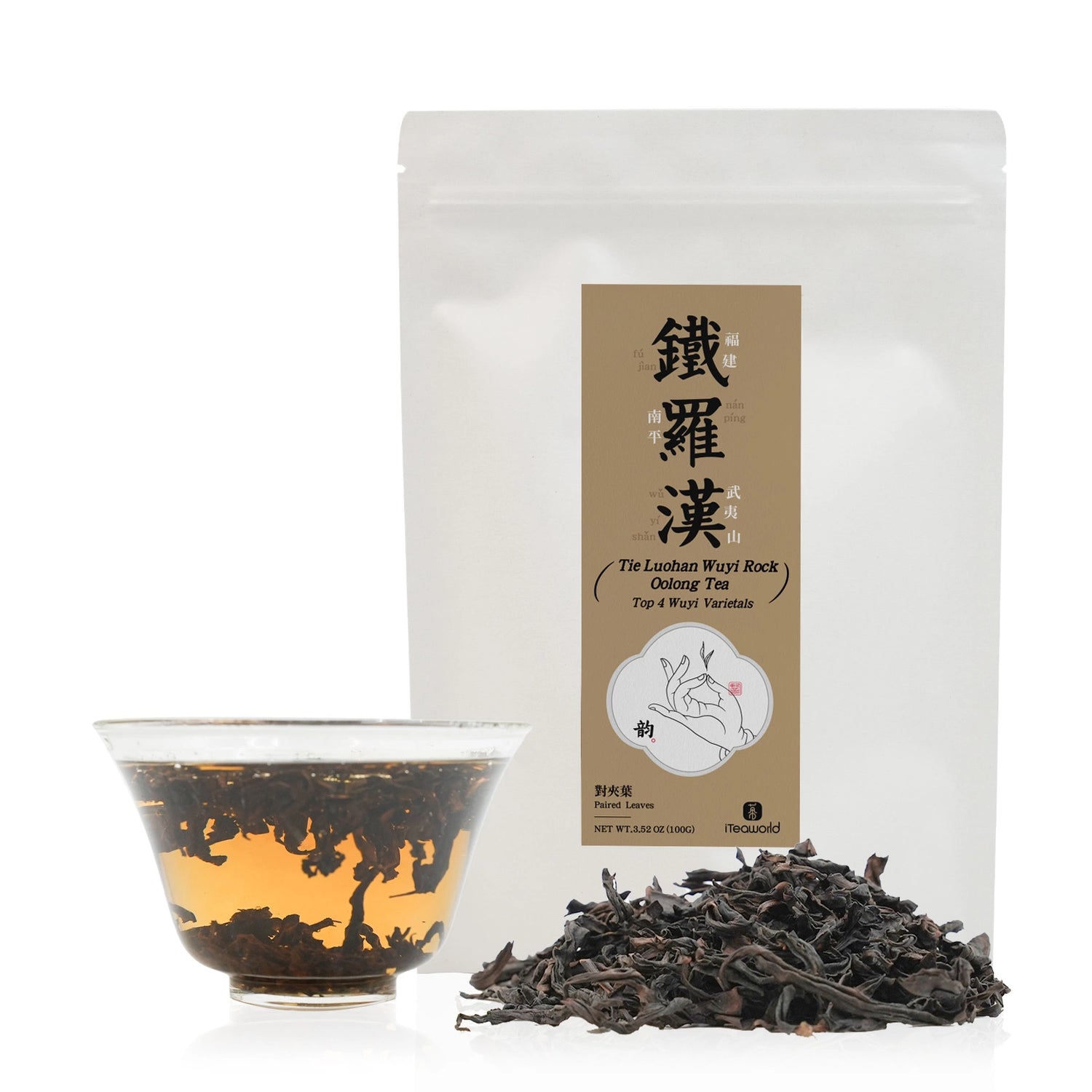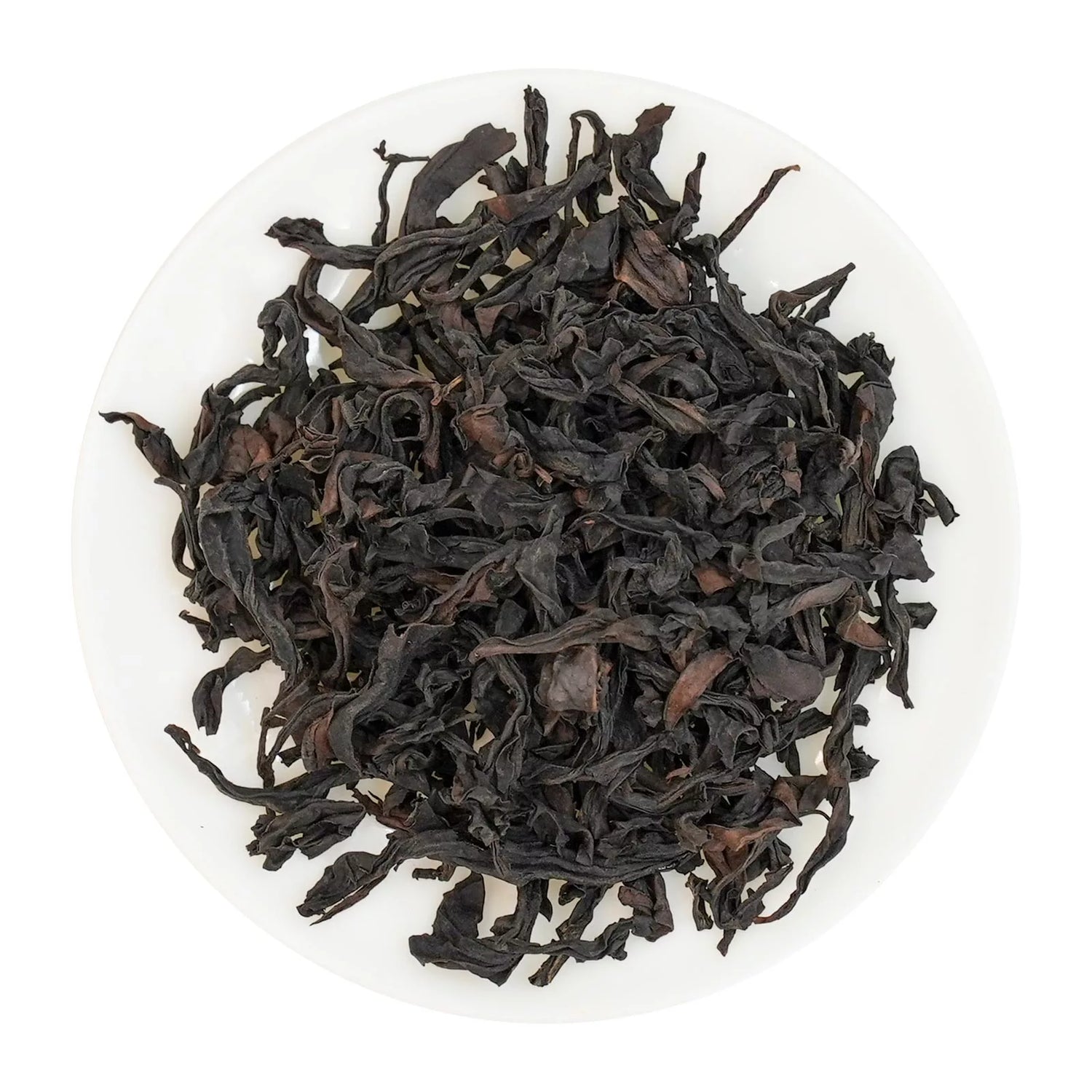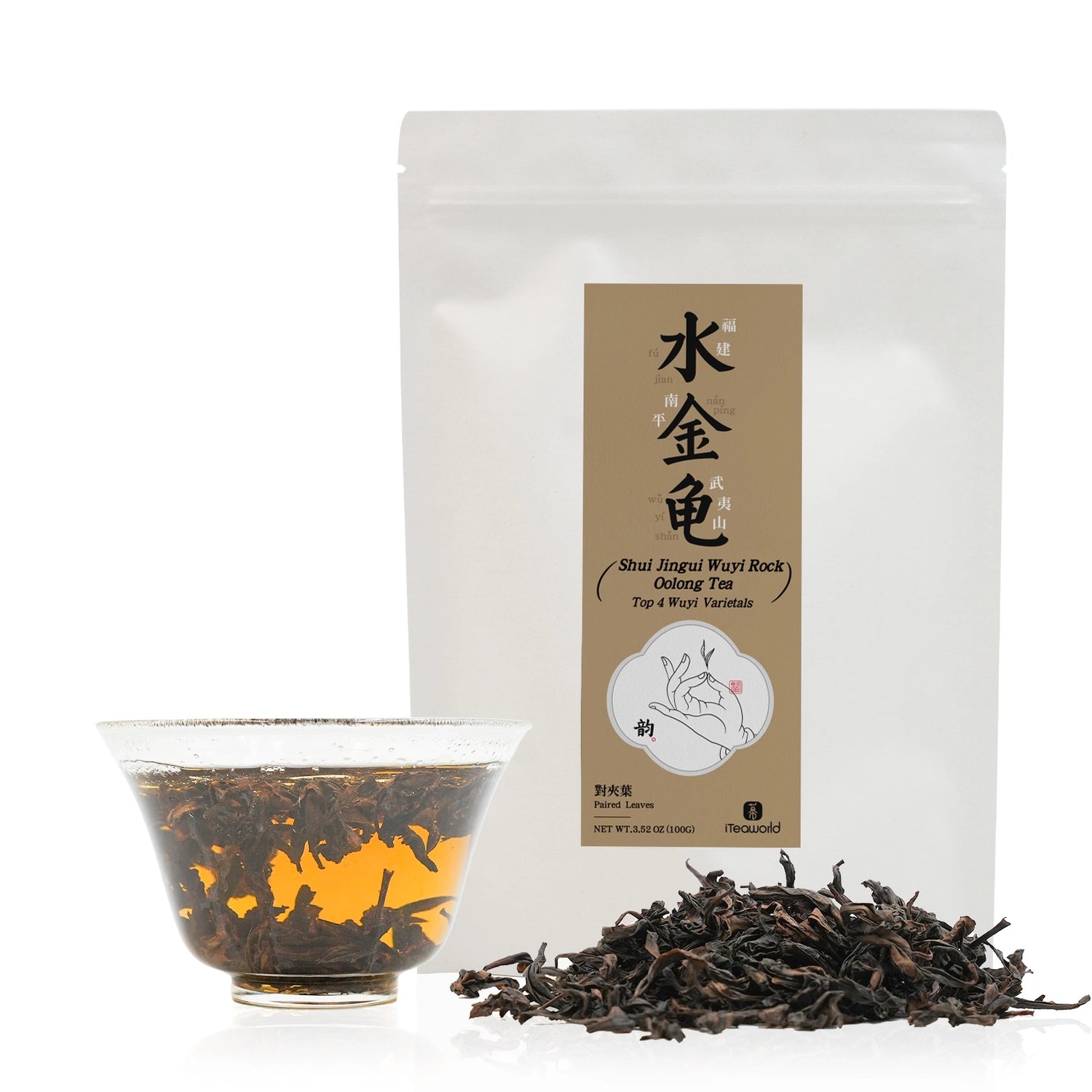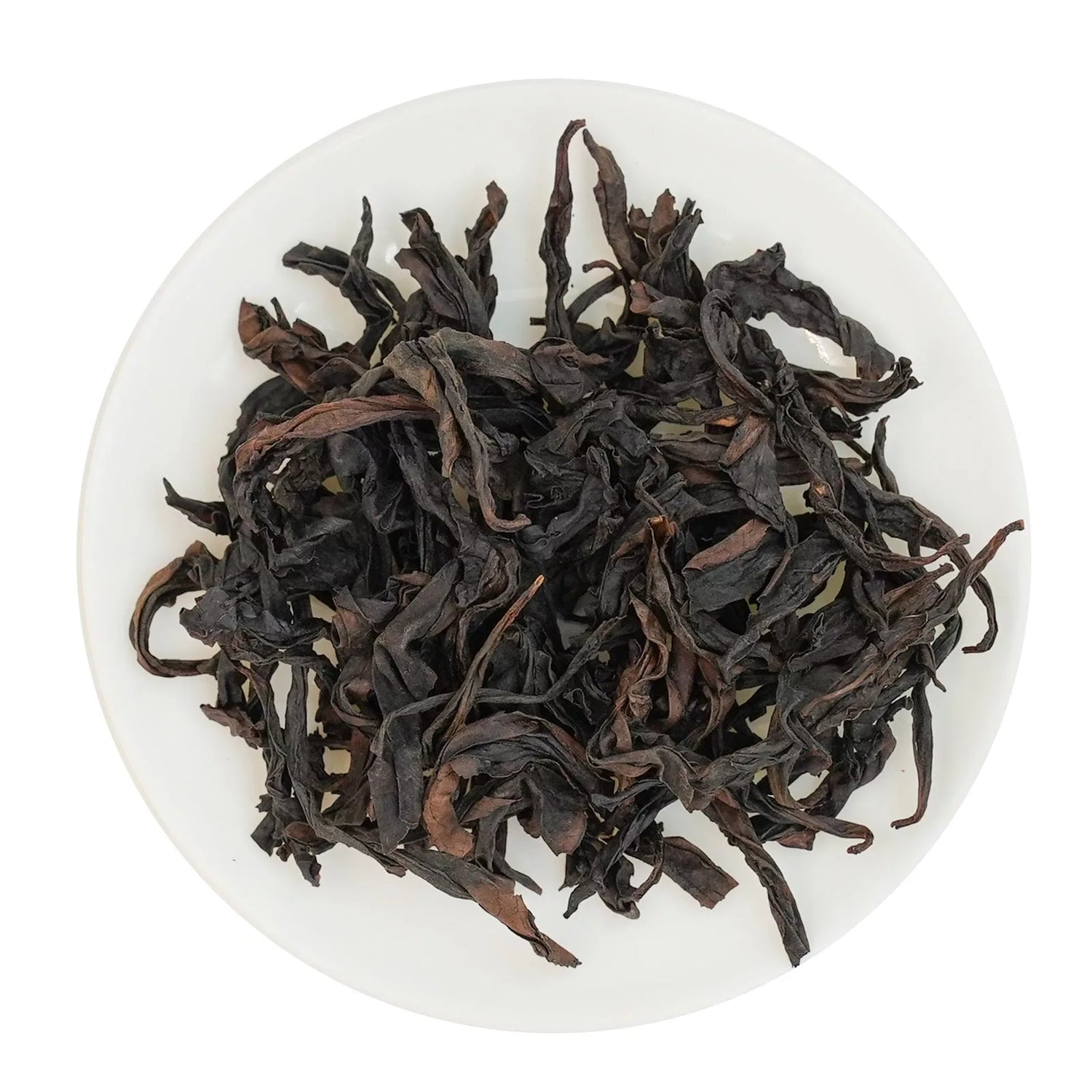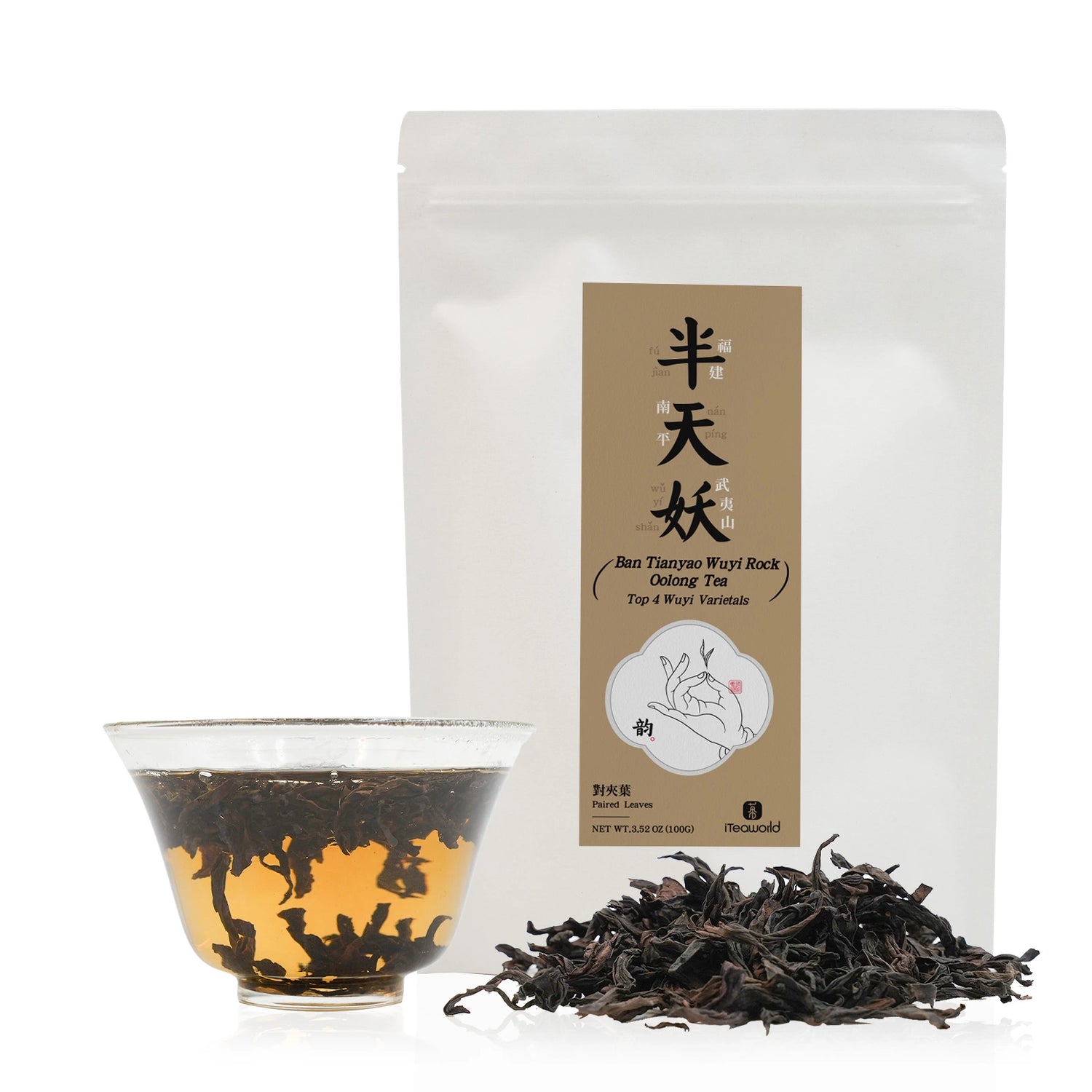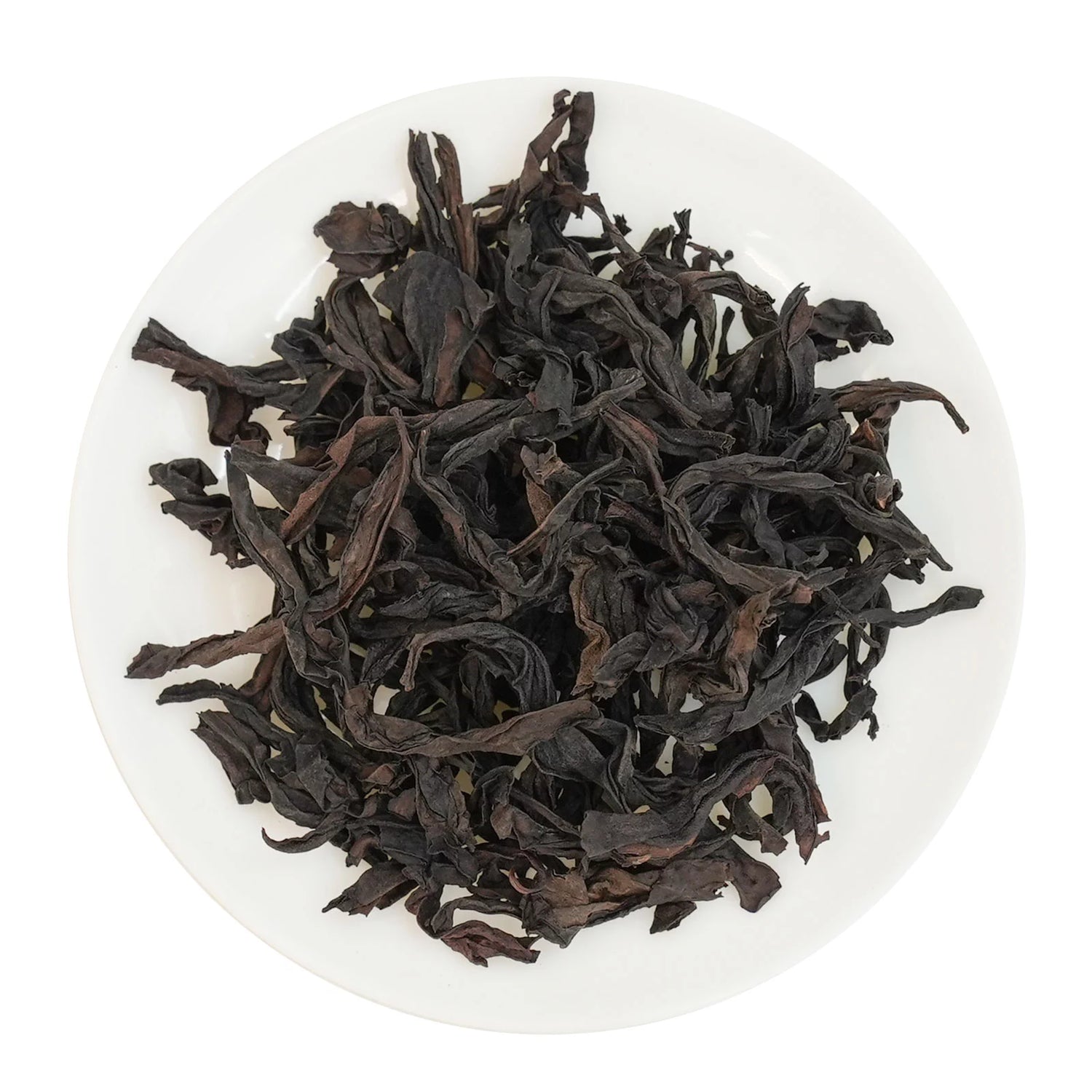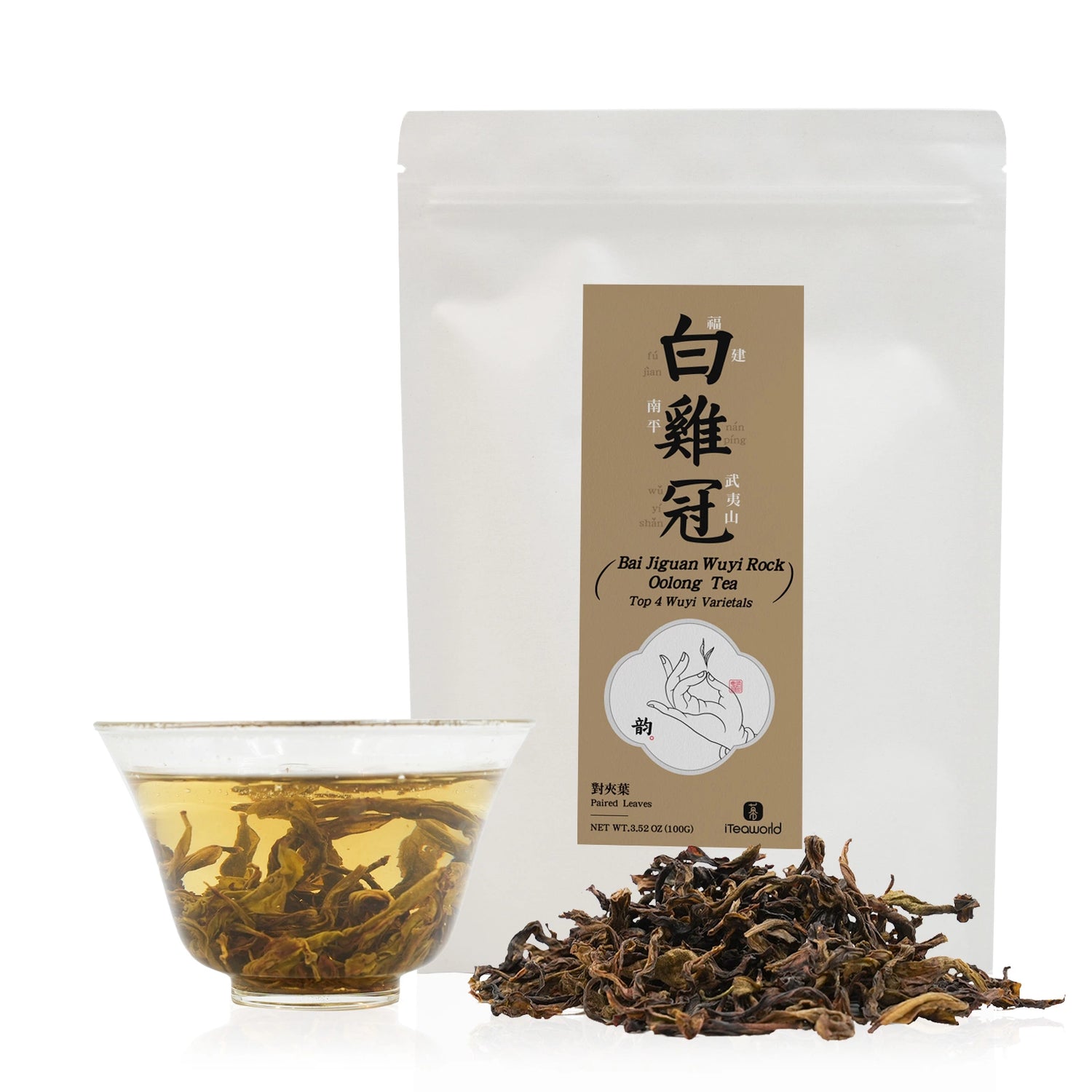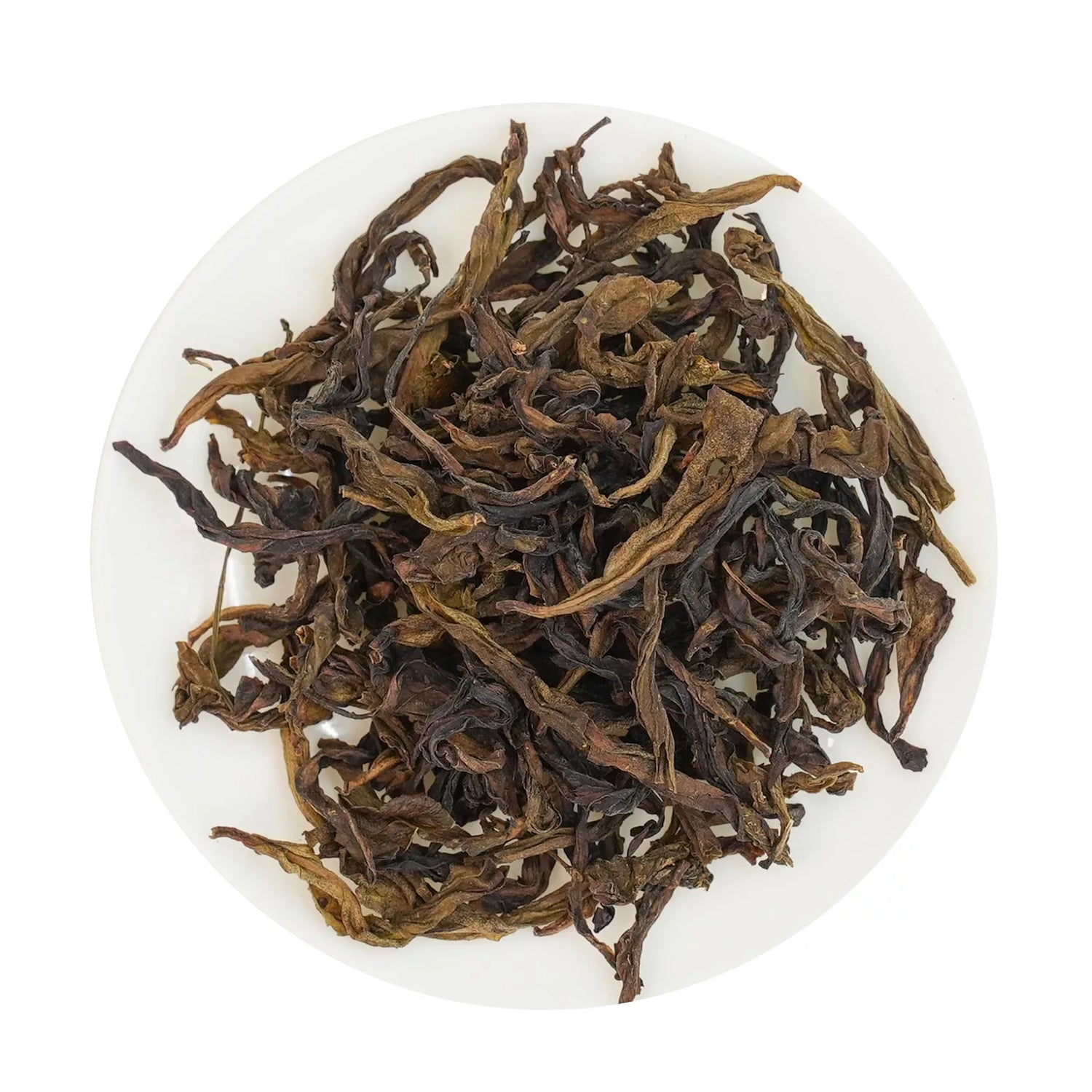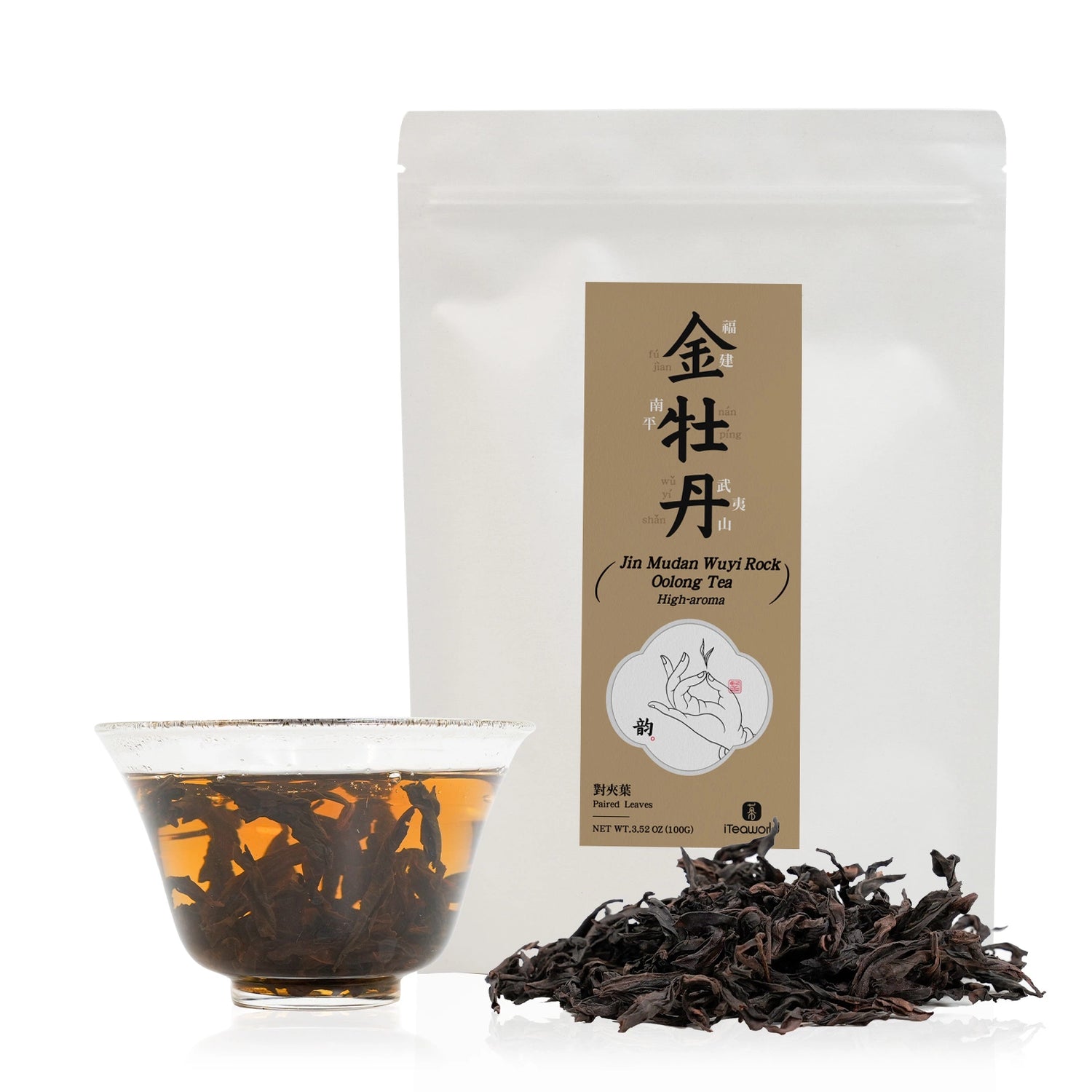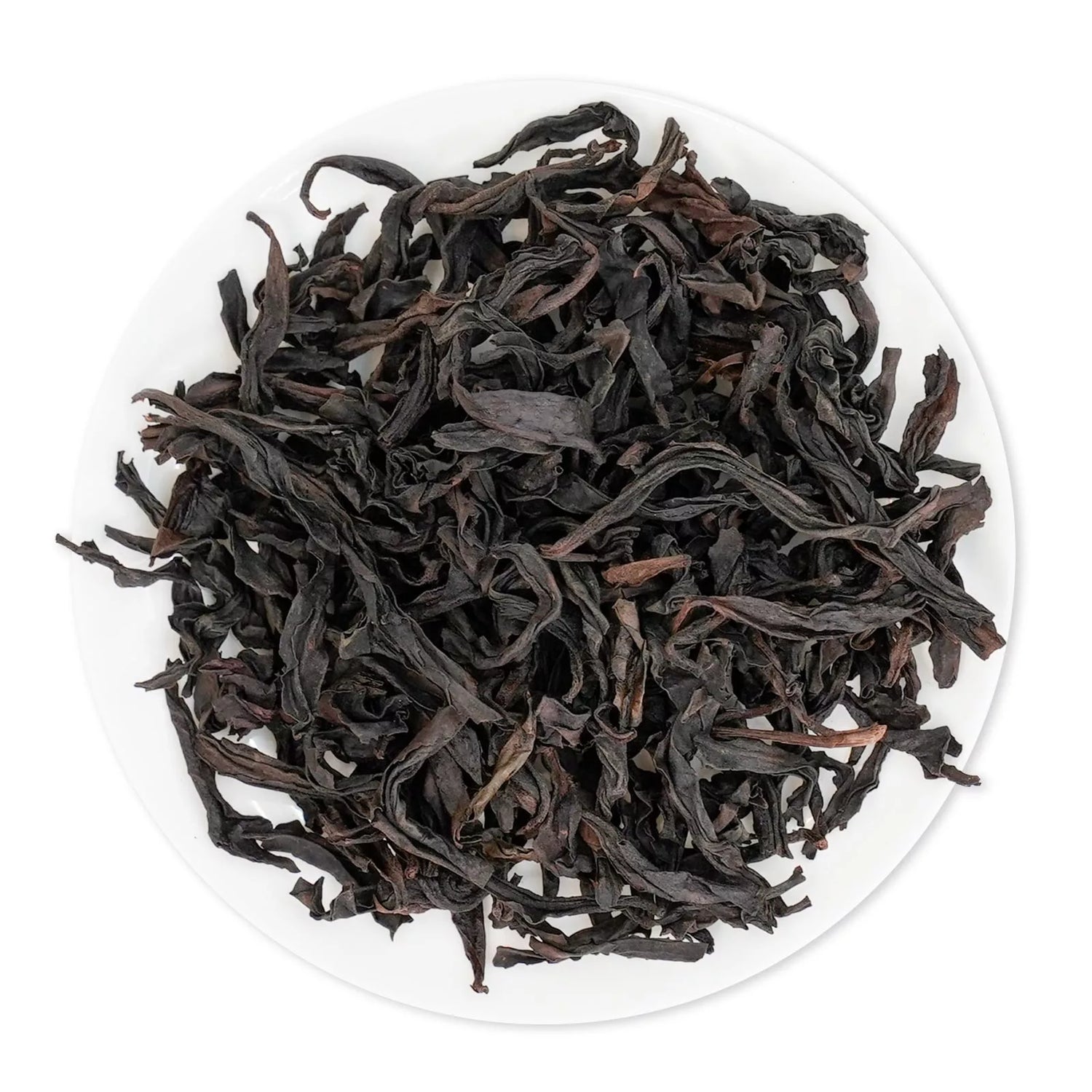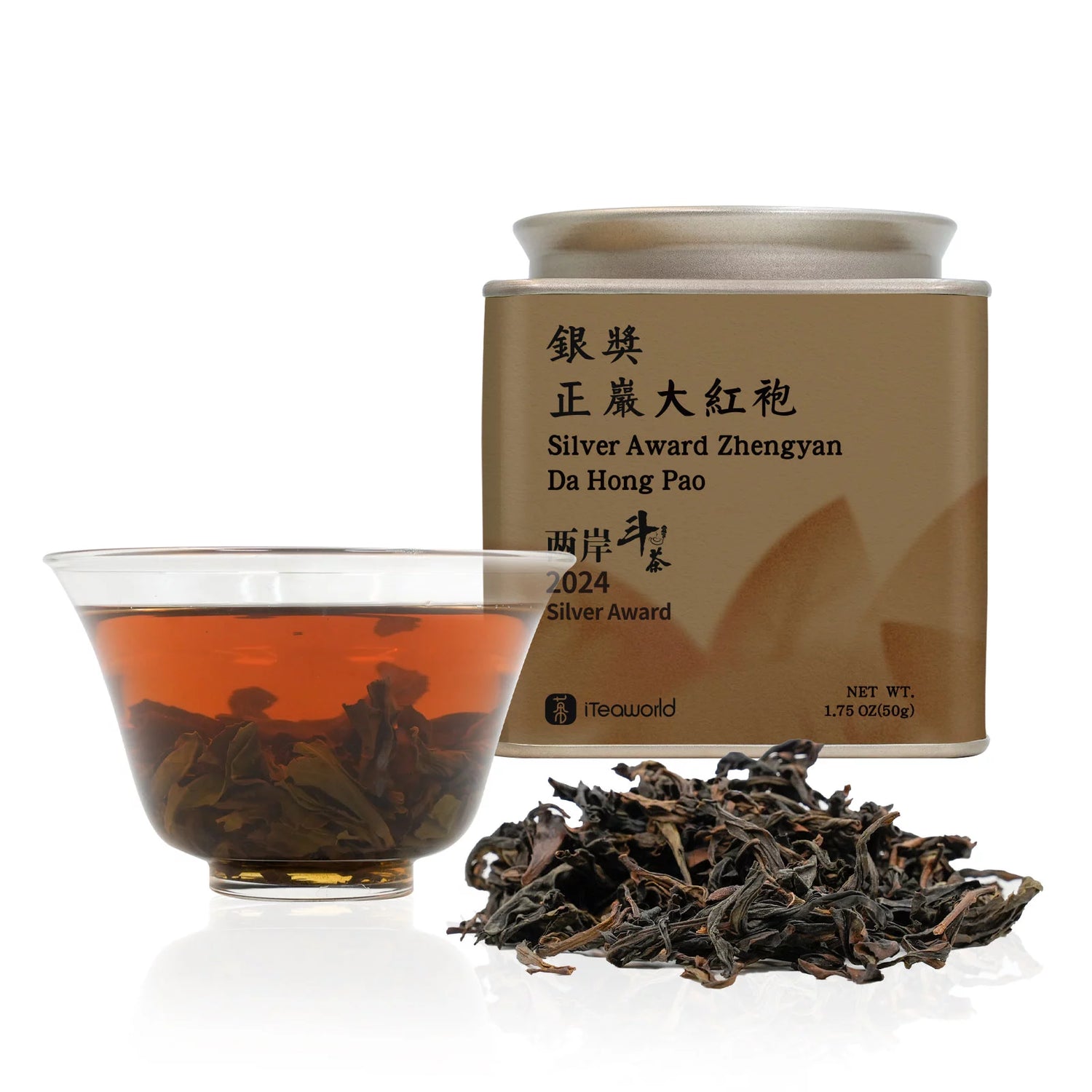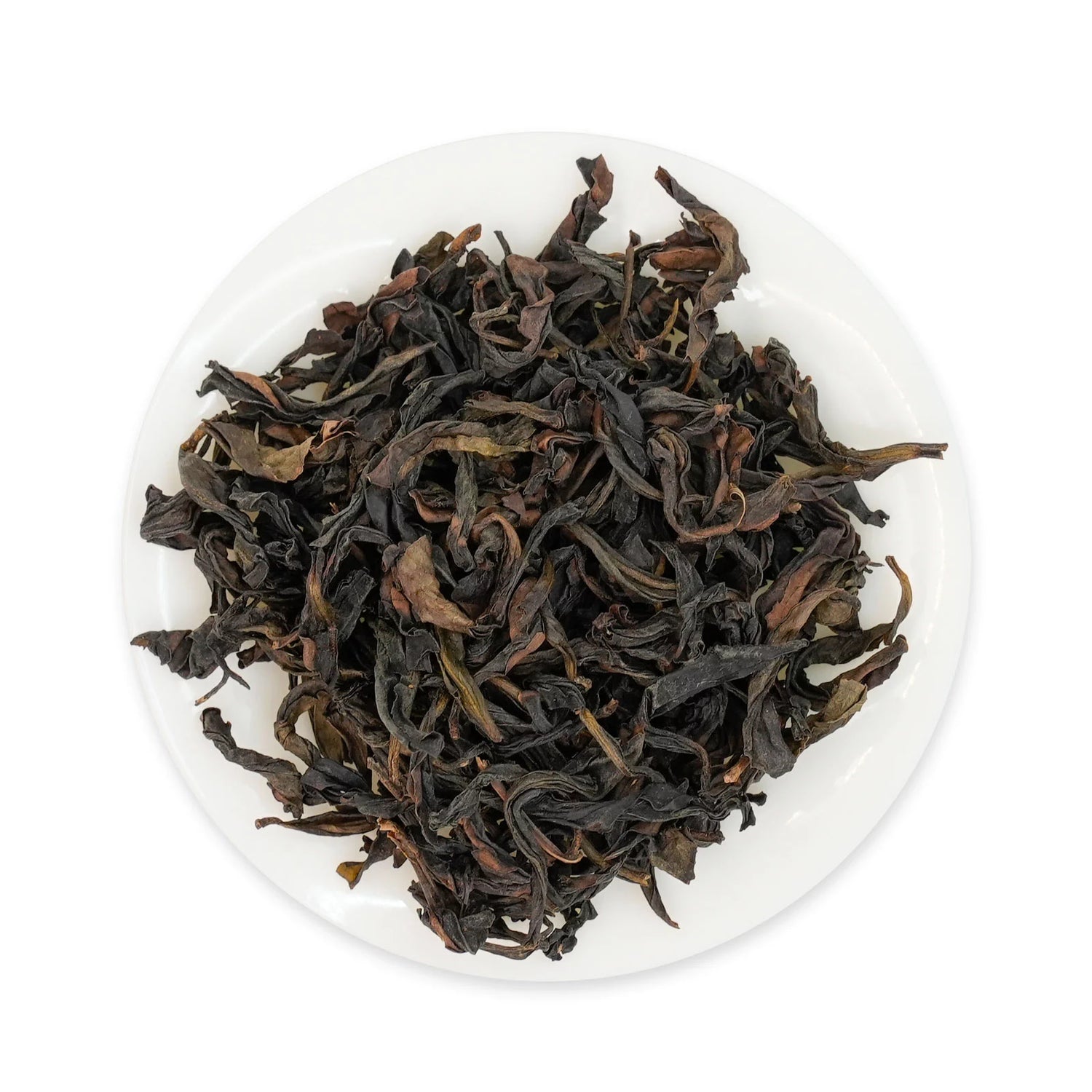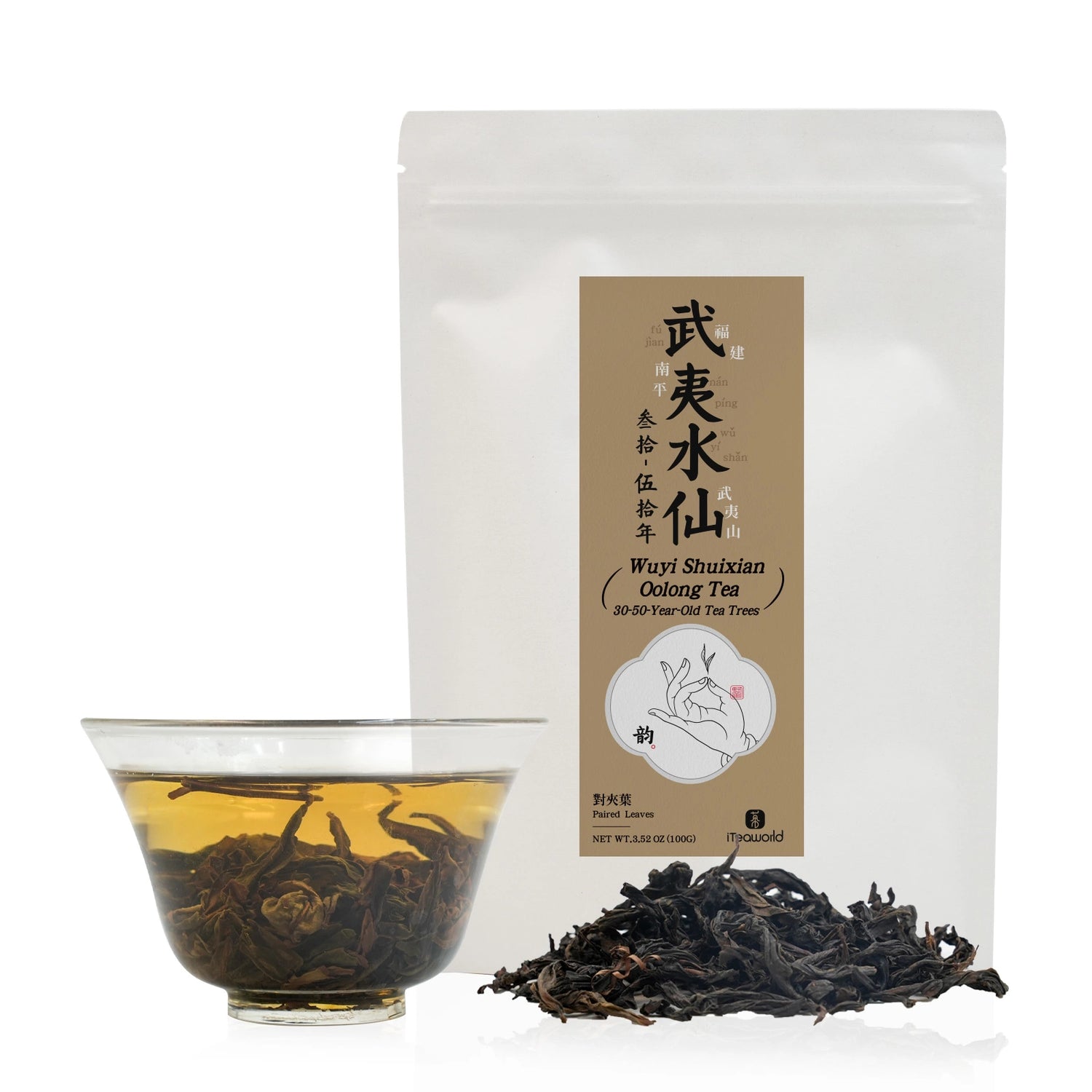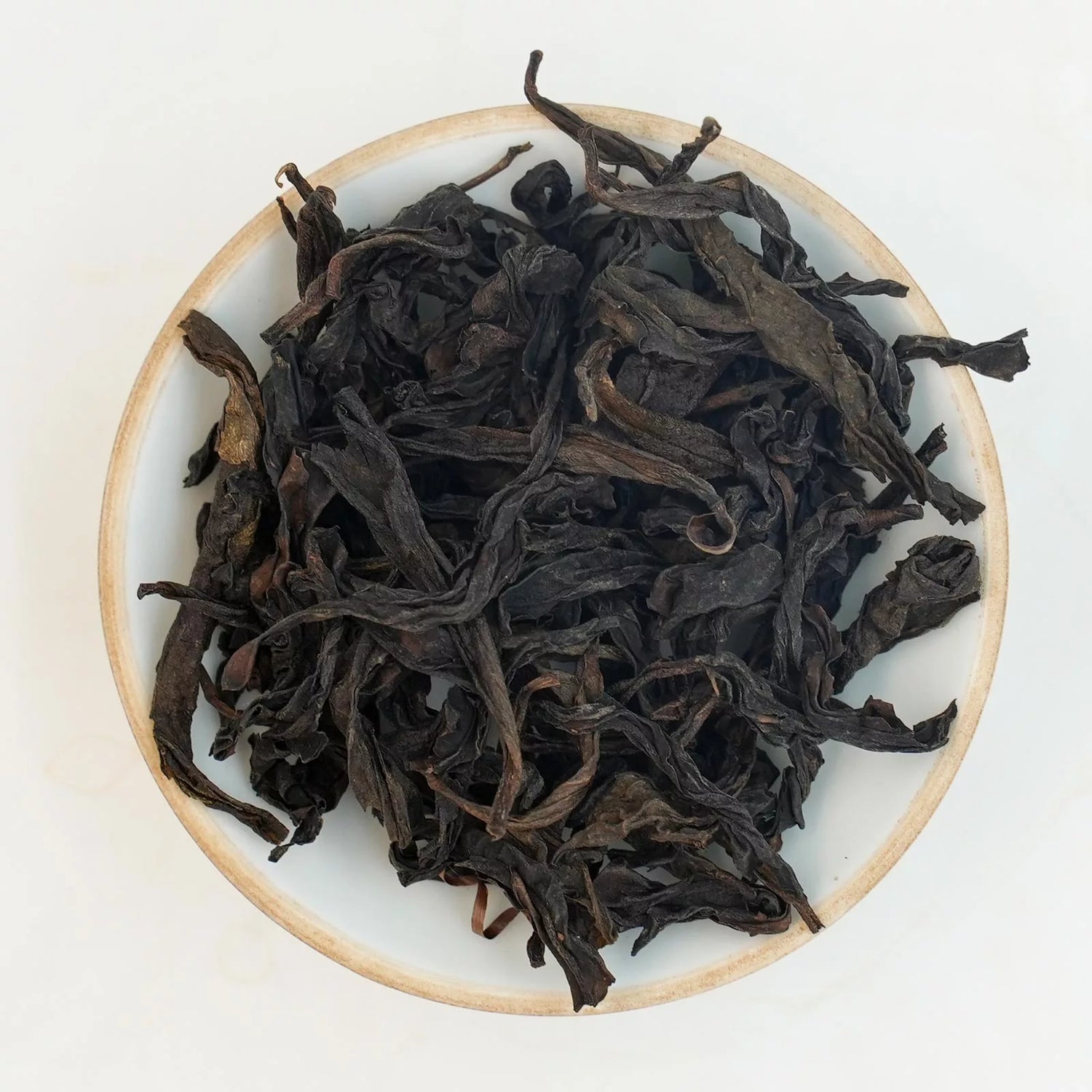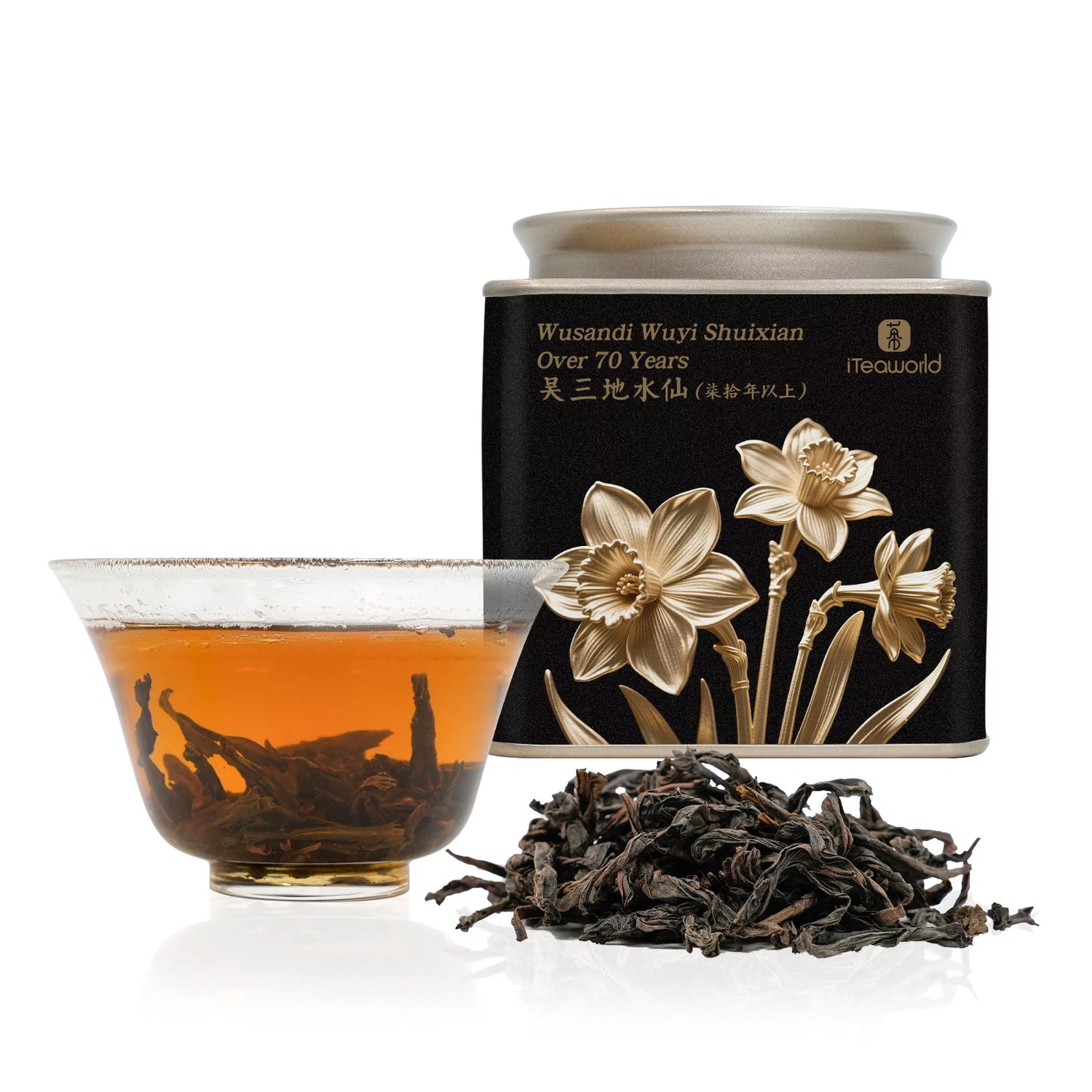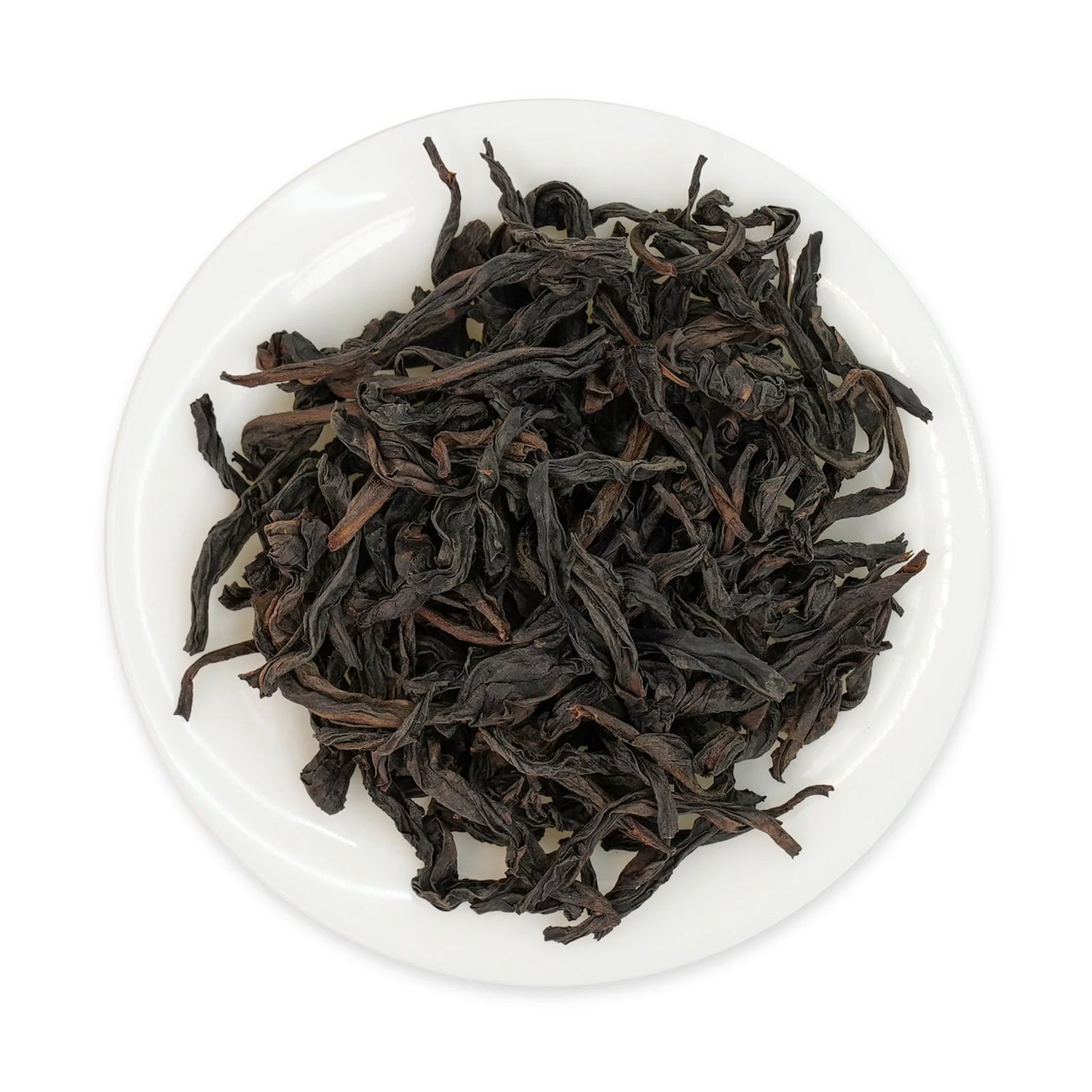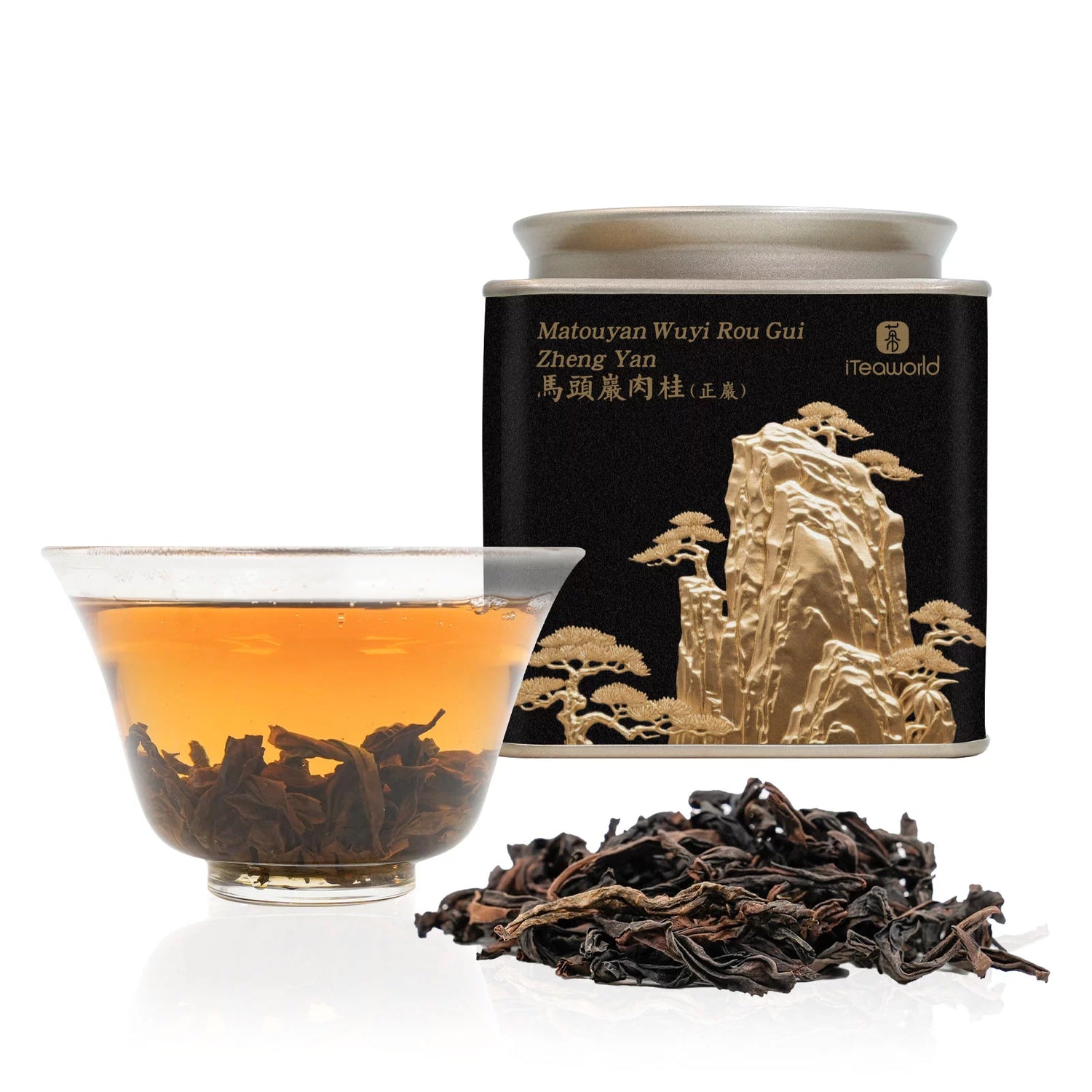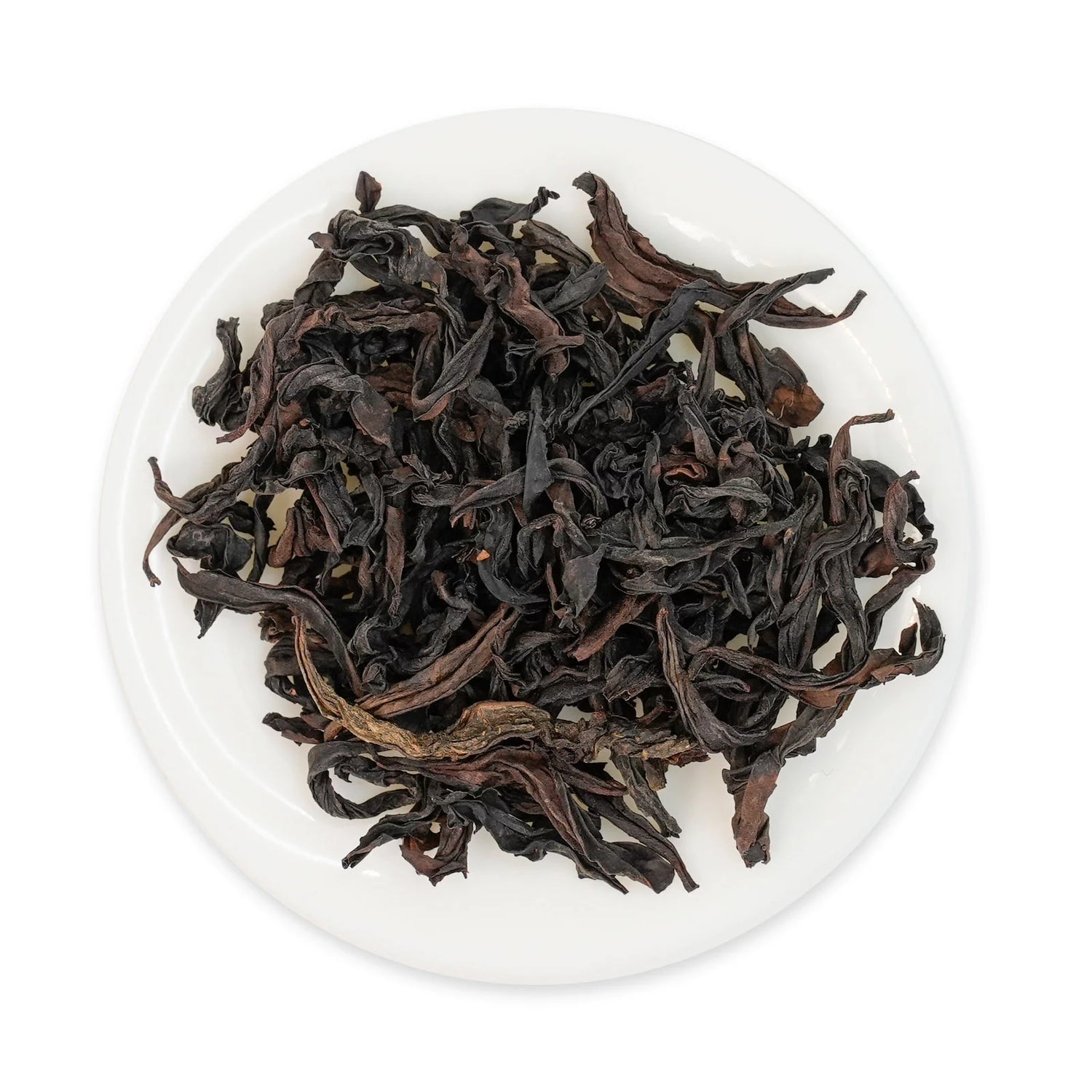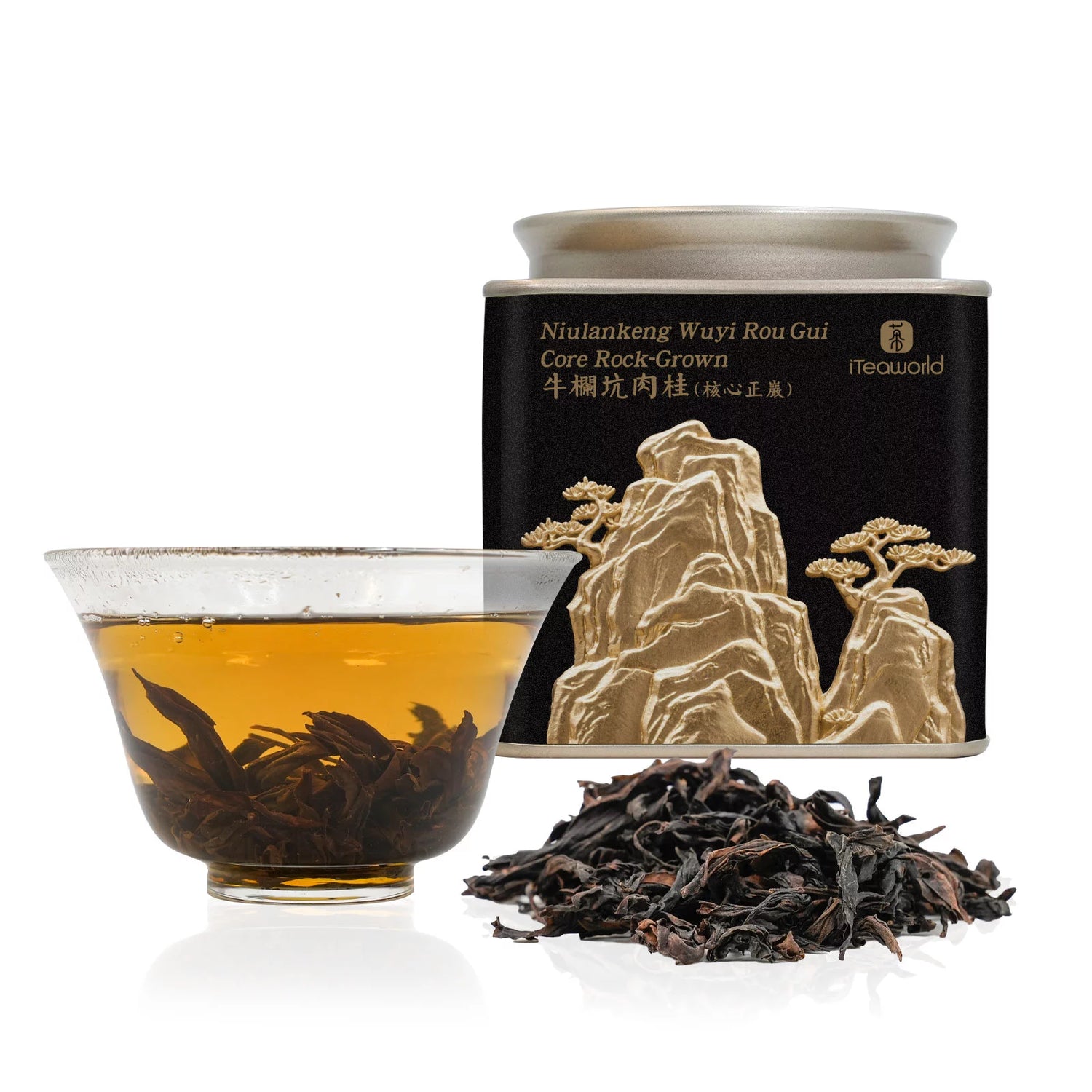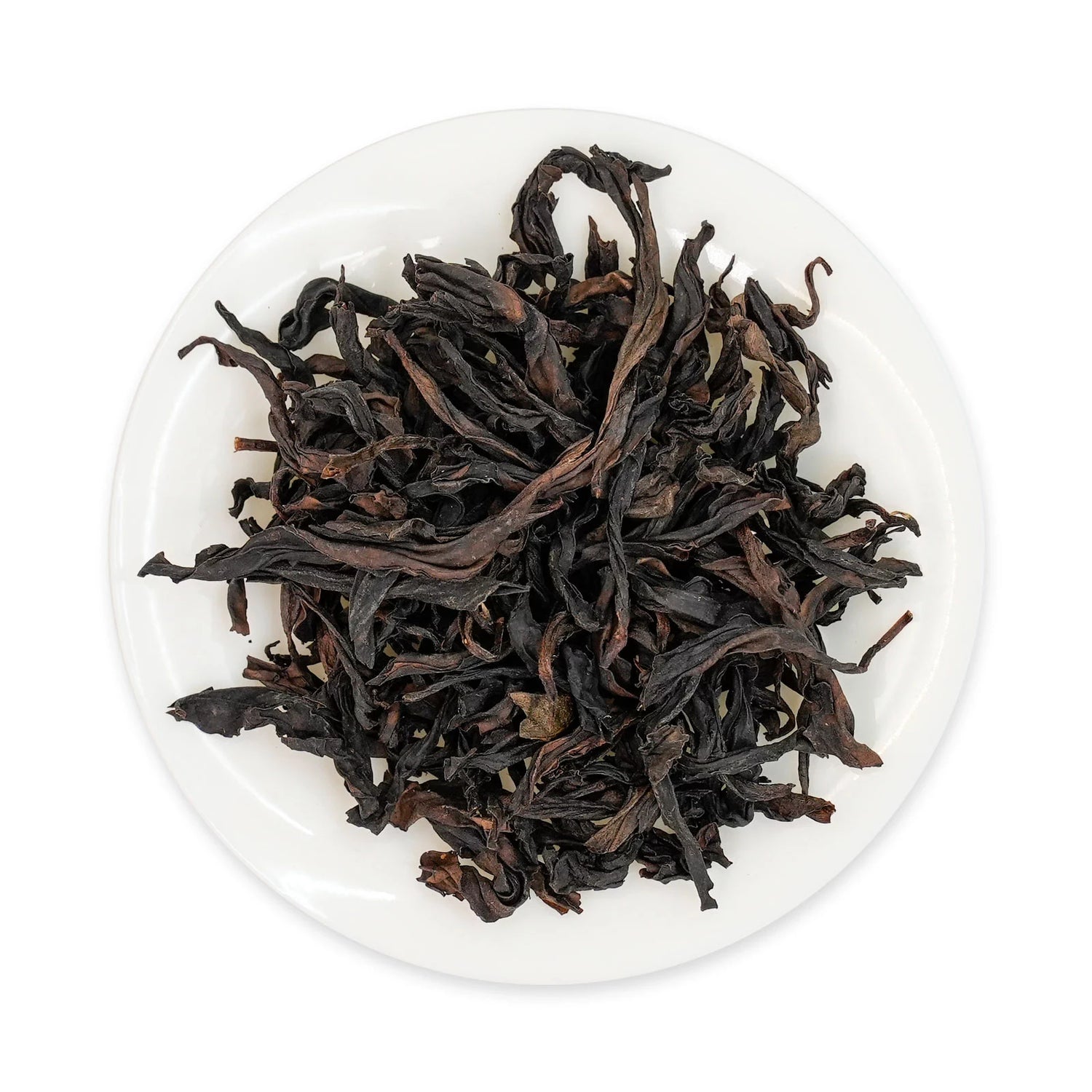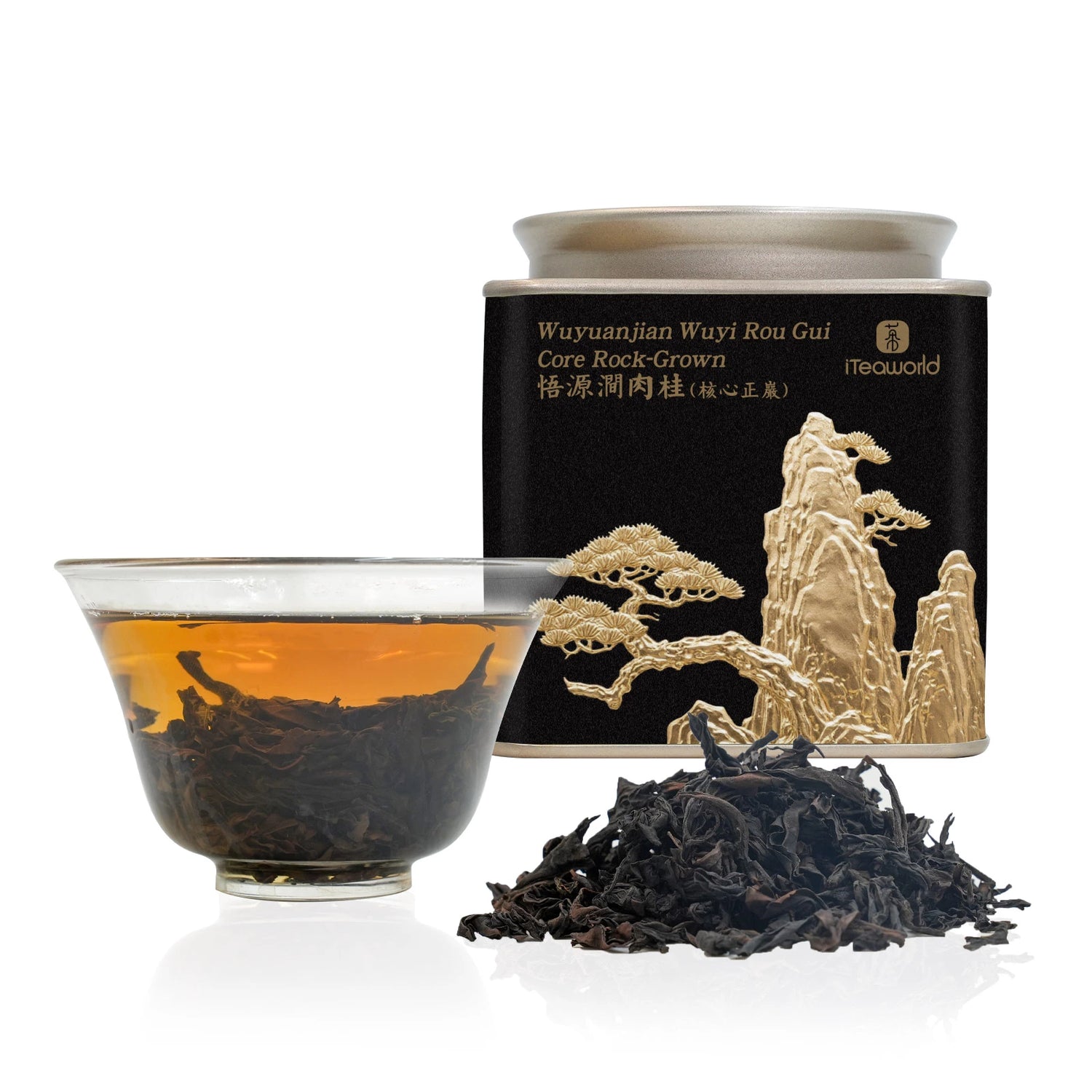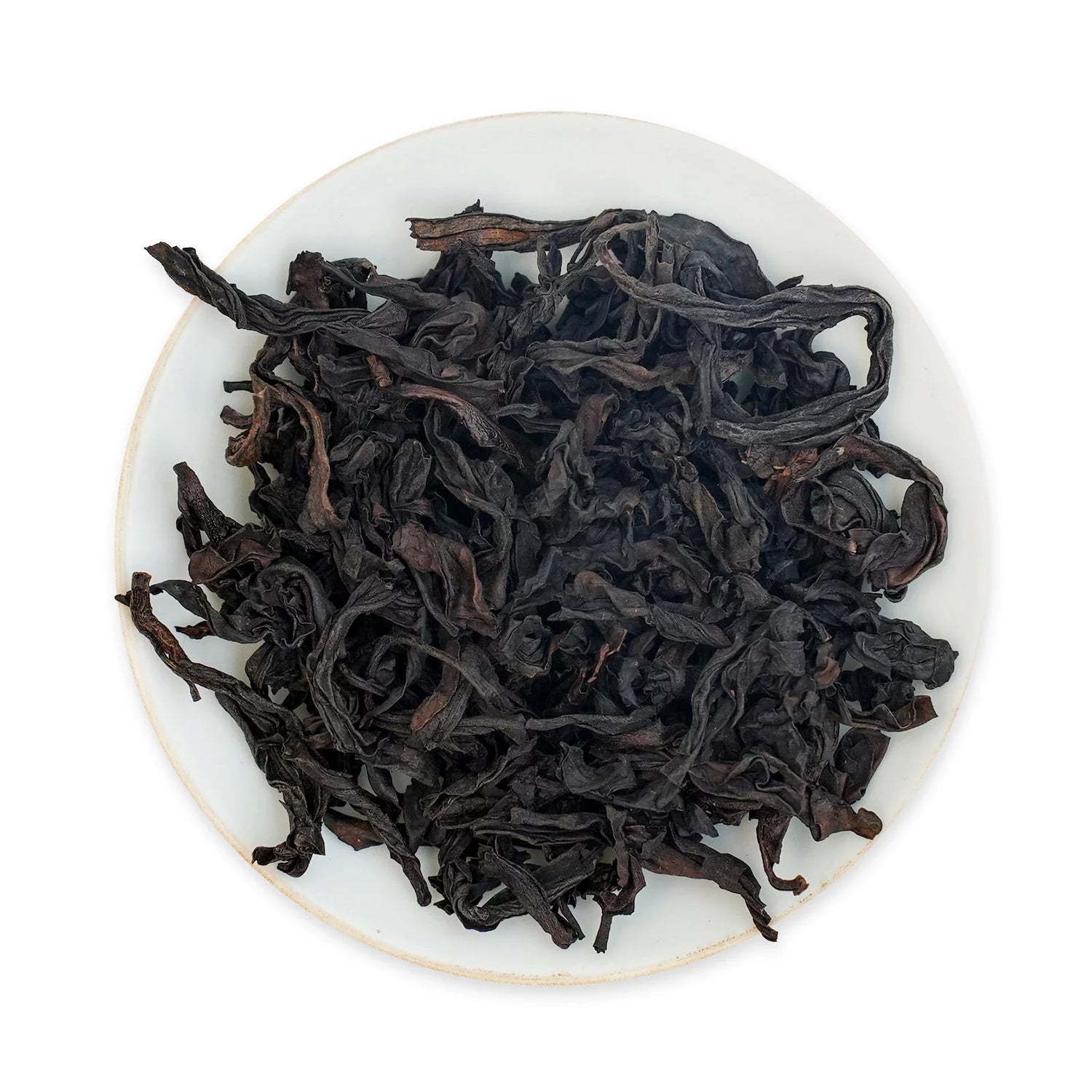Sort by:
61 products
61 products
During the aging and transportation process of aged tea, the packaging and the tea itself may get damaged. Please be cautious when purchasing if you mind this.
Recommended Purchase
This Yongchun Fo Shou Oolong tea, produced in 1993 and naturally aged in dry storage for 33 years, is made from the Yongchun Fo Shou variety, a well-known tea type from Yongchun, Fujian Province. It was crafted by the Yongchun Beikong Overseas Chinese Tea Factory, established in 1917. This tea is handcrafted with traditional full-heat roasting and comes in its original packaging. No longer available on the market, it features a unique "aged aroma", rich sweetness and smooth texture, making it a cherished choice for lovers of aged Oolong tea.
Key Details about 1993 Yongchun Fo Shou
- Origin: Yongchun, Fujian Province, China
- Production Date : 1993
- Grade: Special Grade
- Tea Cultivar: Yongchun Fo Shou
- Craftsmanship : Traditional high-fire roasting with medium fermentation, followed by 33 years of natural dry storage in sealed outer box with an inner foil bag.
- Flavor Highlights: Warm "aged aroma" with notes of roasted nuts, complex layers of aged flavors.
What is Yongchun Fo Shou Oolong Tea?
Yongchun Fo Shou, also known as "Buddha’s Hand," is a premium variety of oolong tea grown in Yongchun, Fujian. Named after its leaves that resemble a Buddha’s hand, Yongchun Fo Shou is celebrated for its fragrant aroma, smooth taste, and exceptional aging potential. The tea is lightly twisted into a "dragonfly head" shape, with dark blackish-brown leaves indicative of traditional craftsmanship.
Brewing and Enjoyment Tips
This tea is a testament to the transformative effects of time, offering a rich, smooth, and slightly tangy flavor profile. Best enjoyed with long steeping times or simmering to fully release its aged characteristics.
Recommended Brewing Methods:
-
Gaiwan Brewing:
- 100ml Gaiwan
- 95℃-100℃
- 5-7 times
- 1:15 to 1:25
- 10~20 seconds
-
Thermos Brewing:
- 1g tea per 100ml (3.4oz) water.
- Use boiling water (212°F).
- Steeping Time: 1-2 hours.
- Tool: Insulated thermos.
-
Boiling Method:
- Add 1g tea per 100ml (3.4oz) water.
- Boil for 1-2 minutes, then let sit for 2-3 minutes.
- Rebrew by boiling 3 minutes longer with each steeping.
- Use a ceramic or glass teapot for optimal flavor.
- Enjoy up to 3-4 brews.
Storage Guidelines
Store this tea in a dry, cool environment with a humidity level below 45% and temperature below 25°C (77°F). Keep it away from strong odors, light, and air exposure. Proper storage ensures the tea retains its flavor and continues to age gracefully over time.
Weight
- 4.4oz (125g)
- Packing Type : Sealed Paper Box with Internal Foil Bag
About Yongchun Beikeng Overseas Chinese Tea Factory
Founded in 1917, the Yongchun Beikeng Tea Factory has a rich history of producing high-quality teas. Once a bustling hub of innovation and craftsmanship, the factory was home to over 1,000 tea workers at its peak, producing millions of pounds of tea annually. Its products, including Yongchun Fo Shou, were highly sought after in Hong Kong, Taiwan, Japan, and Southeast Asia.
Just as many state-owned old factories have experienced ups and downs, in the 1990s, the tea factory once fell into a slump, and the once bustling factory area gradually became desolate. The former factory director, Huang Shenghou, who had created its greatest glory and witnessed its decline, was deeply saddened by its decline and took over the factory himself after privatization.
Today, this aged Yongchun Fo Shou tea stands as a flavorful tribute to the factory's storied past and the enduring legacy of traditional Chinese tea-making.
Recommended Purchase
This 1993 Aged Min Nan Shui Xian Oolong Tea is crafted from the Shui Xian tea cultivar, grown in Fujian, China. Produced by the renowned Yongchun Beikeng Overseas Chinese Tea Factory, which was established in 1917. This tea has been naturally aged in dry storage for 33 years, developing a unique blend of sweet aged aroma and medicinal fragrance. With a smooth, thick mouthfeel and a lingering sweetness, it is ideal for those who appreciate the depth of aged teas. The traditional high-temperature roasting and medium oxidation enhance its warming characteristics. This product is in its original packaging and is no longer in circulation on the market.
Key Details about 1993 Aged Min Nan Shui Xian
Origin: Yongchun, Fujian Province, China
Production Date: 1993
Grade: Second Grade
Tea Cultivar: Shui Xian
Craftsmanship: Traditional high-fire roasting, medium oxidation, light rolling
Flavor Highlights: Sweet aged aroma with medicinal fragrance, thick and smooth taste, long-lasting aftertaste
Storage: Naturally dry-aged, sealed packaging for optimal preservation
What is Min Nan Shui Xian Oolong Tea?
Min Nan Shui Xian is a Southern Fujian-style Oolong tea, known for its rich fragrance, mellow body, and lasting sweetness. Compared to Wuyi Shui Xian, it undergoes less oxidation, resulting in a softer and smoother profile. After decades of aging, this 1993 batch has developed an aged sweetness, medicinal notes, and a thick, velvety texture, making it a highly sought-after selection among aged tea connoisseurs.
Recommended Brewing Methods:
Gaiwan Brewing:
100ml Gaiwan
95℃-100℃
5-7 times
1:15 to 1:25
10~20 seconds
Thermos Brewing :
1g tea per 100ml (3.4oz) water.
Use boiling water (212°F).
Steeping Time: 1-2 hours.
Tool: Insulated thermos.
Boiling Method :
Add 1g tea per 100ml (3.4oz) water.
Boil for 1-2 minutes, then let sit for 2-3 minutes.
Rebrew by boiling 3 minutes longer with each steeping.
Use a ceramic or glass teapot for optimal flavor.
Enjoy up to 3-4 brews.
Storage Guidelines
Store this tea in a dry, cool environment with a humidity level below 45% and temperature below 25°C (77°F). Keep it away from strong odors, light, and air exposure. Proper storage ensures the tea retains its flavor and continues to age gracefully over time.
Weight & Packaging
Net Weight: 100g (3.5oz)
Packing Type: Original sealed paper box with inner aluminum foil bag
About Yongchun Beikeng Overseas Chinese Tea Factory
Founded in 1917, the Yongchun Beikeng Tea Factory has a rich history of producing high-quality teas. Once a bustling hub of innovation and craftsmanship, the factory was home to over 1,000 tea workers at its peak, producing millions of pounds of tea annually. The factory's products, including Min Nan Shui Xian, were highly sought after in Hong Kong, Taiwan, Japan, and Southeast Asia.
Just as many state-owned old factories have experienced ups and downs, in the 1990s, the tea factory once fell into a slump, and the once bustling factory area gradually became desolate. The former factory director, Huang Shenghou, who had created its greatest glory and witnessed its decline, couldn't bear to see it and took over the factory personally after its privatization.
Today, this aged Min Nan Shui Xian Oolong tea stands as a flavorful tribute to the factory's storied past and the enduring legacy of traditional Chinese tea-making.
During the aging and transportation process of aged tea, the packaging and the tea itself may get damaged. Please be cautious when purchasing if you mind this.
Recommended Purchase
This 1996 Aged Dancong Shui Xian Oolong Tea is crafted from Shui Xian tea cultivars grown in the famous Wuyi Mountain region of Fujian, China. Produced by the Wuyi Mountain Tea Factory, this tea has been naturally aged in dry storage for 30 years. It is known for its rich, sweet aroma with notes of roasted sweet potato and fruit, and the distinctive floral fragrance of orchids. The tea liquor is a vibrant, deep orange, and the taste is thick, with a noticeable acidity that gives way to a refreshing aftertaste. This product is in its original packaging and is no longer in circulation on the market.This tea is ideal for those who appreciate the complexity of aged Wuyi rock teas and are looking for a bold, full-bodied flavor.
Key Details about 1996 Aged Dancong Shui Xian
- Origin: Wuyi Mountain, Fujian Province, China
- Production Date: 1996
- Grade: Special Grade Dancong
- Tea Cultivar: Shui Xian
- Craftsmanship: Medium roasting, medium oxidation, light rolling
- Flavor Highlights: Sweet aroma with roasted sweet potato, fruit, and floral orchid notes, thick and refreshing taste with acidity
- Storage: Naturally dry-aged, sealed packaging for optimal preservation
What is Dancong Shui Xian Oolong Tea?
Dancong Shui Xian is a type of Wuyi rock tea, known for its intense, complex flavor profile. Shui Xian is one of the most well-known cultivars in Wuyi Mountain and is prized for its unique floral and fruit-like aroma. The tea undergoes a moderate level of oxidation and is roasted to bring out its robust flavor. Aged Shui Xian Oolong offers even deeper complexity, with the floral, fruity notes mellowing into more nuanced, savory characteristics. This makes it a perfect choice for tea connoisseurs who appreciate both freshness and the depth of aged tea.
Brewing and Enjoyment Tips
Aged Shui Xian tea is best enjoyed using Gongfu brewing or boiling methods, which can bring out the full range of aromas and flavors. The tea has excellent durability, so it can withstand multiple brews.
How to Brew 1996 Aged Dancong Shui Xian Oolong Tea
- Gongfu Brewing Method
-
- Tea-to-Water Ratio: 6g tea per 100ml water
- Water Temperature: 95-100°C (203-212°F)
- Steeping Time: 10-15 seconds for the first brew, increase time for each subsequent brew
- Recommended Tool: Porcelain Gaiwan or Yixing Clay Teapot
- Tea-to-Water Ratio: 6g tea per 100ml water
- Boiling Method
- Tea-to-Water Ratio: 3g per 100ml water
- Process: Boil the tea for 3-5 minutes, then simmer for 2-3 minutes
- Rebrewing: Extend boiling time by 2-3 minutes for each subsequent brew
- Recommended Tool: Glass or ceramic teapot
- Tea-to-Water Ratio: 3g per 100ml water
Storage Guidelines for Aged Shui Xian Oolong Tea
To preserve the tea's aging qualities, store it in a cool, dry environment, away from direct light and strong odors. Keep the tea sealed in an airtight container to minimize exposure to air and moisture. Proper storage will allow the tea to continue aging gracefully.
Weight & Packaging
- Net Weight: 125g (4.4oz)
- Packing Type: Original sealed paper box with inner aluminum foil bag
Recommended Purchase :
This Tie Guan Yin Oolong tea, produced between 1990 and 1993, has been stored in a dry warehouse of an old tea factory for over thirty years and kept sealed. It is made from the Tie Guan Yin variety from the famous tea-growing region of Yongchun, Fujian, and was crafted by the state-owned Yongchun Kong Overseas Chinese Tea Factory, established in 1958. This tea is entirely handmade, traditionally roasted over a full fire, and comes in its original packaging. No longer available on the market, its unique "aged aroma," rich sweetness, and smooth texture make it a prized choice for connoisseurs of aged oolong tea.
Key Details about Tieguanyin :
- Production Date:1990-1993
- Grade: First grade
- Tea Cultivar: Tieguanyin
- Craftsmanship: This tea is traditionally roasted with a full fire and moderately oxidized. After over thirty years of natural aging in a dry storage environment, it is sealed in an outer paper box and packaged in an inner kraft paper bag.
- Flavor Highlights: This tea offers a rich, aged aroma with hints of woody notes. The texture is thick and smooth, with a deep, mellow flavor and a long-lasting sweet aftertaste. Its complex profile unfolds in layers, making it a truly refined experience.
What is Tieguanyin Oolong Tea? :
Tieguanyin is one of China's top ten famous teas, a semi-fermented oolong tea primarily produced in Anxi, Fujian. Its unique production process includes sun-withering, shaking, and heating, which gives the leaves a distinctive "green leaf with red edges" appearance. The tea features tightly rolled, sandy-green leaves and a golden, clear brew. It has a rich, lasting aroma with natural orchid or fruity notes, a smooth, refreshing taste, and a sweet aftertaste. Highly resistant to multiple infusions, Tieguanyin is packed with nutrients like polyphenols and amino acids, offering benefits such as boosting alertness, reducing fatigue, cooling the body, and aiding weight loss. A treasured tea and a symbol of Southern Fujian's tea culture, it is widely loved by tea enthusiasts.
Brewing and Enjoyment Tips :
This tea showcases the unique transformation brought by time. The first infusion can be used as a "tea awakening" step to activate the tea's inner qualities, resulting in a richer, smoother texture and a more pronounced sweet aftertaste. For the best experience, we recommend using longer steeping times or boiling methods to fully unlock its aged characteristics.
Recommended Brewing Methods :
-
Gaiwan Brewing
- Capacity:100ml Gaiwan
- Water Temperature:95℃-100℃
- Brewing Times:5-7 times
- Tea Water Ratio:1:15 to 1:25
- Brewing Time Once:10~20 seconds
-
Thermos Brewing
- 1g tea per 100ml (3.4oz) water.
- Use boiling water (212°F).
- Steeping Time: 1-2 hours.
- Tool: Insulated thermos.
-
Boiling Method
- Add 1g tea per 100ml (3.4fl oz) water.
- Boil for 1-2 minutes, then let sit for 2-3 minutes.
- Rebrew by boiling for 3 minutes longer with each steeping.
- Use a ceramic or glass teapot for optimal flavor.
- Enjoy up to 3-4 brews.
Storage Guidelines:
To ensure the best quality of tea, the ideal way to store it is in vacuum-sealed packaging, kept in a cool, dark, and dry place. Avoid exposure to strong odors and air. For sealed storage, using a tin can or a double-lidded metal can is recommended. For even better results, you can store the sealed tea in the refrigerator or a dry storage container.
Weight & Packaging
- Weight:3.5oz (100g)
- Packing Type : Sealed paper box with cowhide bag packaging inside
About Yongchun Beikeng Overseas Chinese Tea Factory:
Established in 1958, the state-owned Fujian Yongchun Beikeng Overseas Chinese Tea Factory carries a rich history and cultural heritage of tea production. At its peak, the factory was a bustling hub of innovation and craftsmanship, employing over 1,000 tea workers and producing millions of pounds of tea annually. Its teas, including Tieguanyin, were exported to Hong Kong, Taiwan, Japan, and Southeast Asia, earning widespread acclaim and becoming a shining symbol of Fujian's tea culture.
However, by the 1990s, the factory fell into decline, and its once-vibrant grounds grew quiet. Unable to bear seeing his life's work fade away, the veteran factory director, Huang Shenghou, took over after its privatization, dedicating himself to reviving the factory and preserving its tea-making legacy.
Today, the factory's aged Tieguanyin not only embodies decades of tea-making expertise but also continues to showcase the timeless charm of Yongchun's Tieguanyin. The story of the Fujian Yongchun Beikeng Overseas Chinese Tea Factory reflects the dedication and innovation of generations of tea artisans, and its aged Tieguanyin carries forward this remarkable legacy.
Recommended Purchase
This Southern Fujian Shui Xian Oolong Tea, produced between 1993 and 1995 and aged for over 30 years in a dry warehouse under sealed conditions, is made from the Shui Xian (Narcissus) varietal sourced from Yongchun, Fujian—the birthplace of this tea. It was jointly produced by Quanzhou Tea Import & Export Company and the State-Owned Yongchun Kong Overseas Chinese Tea Factory in Fujian.
Processed using the Yongchun Shui Xian method, this tea is a classic example of Oolong tea, preserved in its original packaging. It is no longer available on the market. The tea exhibits a distinct aged aroma, accompanied by a subtle medicinal fragrance, with a sweet, mellow flavor and a smooth texture. Its excellent aging results make it a treasured choice for enthusiasts of aged Oolong tea.
Key Details about Southern Fujian Shui Xian
- Origin:Yongchun, Fujian Province, China
- Production Date:1993-1995
- Grade: First grade
- Tea Cultivar:Shui Xian
- Craftsmanship:This tea is processed into oolong tea using the Yong Chun Shui Xian method, with moderate fermentation. It has been naturally aged in a dry storage environment for over 30 years. The tea is packaged in its original sealed cardboard box, with an inner aluminum foil layer for additional protection.
- Flavor Highlights :The tea exhibits a distinct aged aroma, accompanied by a subtle medicinal fragrance. Its flavor is sweet and mellow, with a smooth texture, showcasing excellent aging effects.
What is Southern Fujian Shui Xian Tea?
Southern Fujian Shui Xian Tea originated in Northern Fujian and was introduced to Yong Chun during the Daoguang period of the Qing Dynasty. Over time, its processing techniques evolved by blending the characteristics of Northern and Southern Fujian oolong teas, resulting in a unique method that enhances the tea's durability for multiple infusions, intensifies its orchid-like aroma, and produces a bright yellow liquor with a sweet, mellow, and refreshing flavor. Beyond its exceptional taste, Southern Fujian Shui Xian Tea offers numerous health benefits, such as activating the autonomic nervous system, reducing stress, enhancing energy metabolism, breaking down fats, and lowering cholesterol, making it a cherished choice for both tea enthusiasts and health-conscious individuals.
Brewing and Enjoyment Tips
This tea showcases the unique transformation brought by time. The first infusion can be used as a "tea awakening" step to activate the tea's inner qualities, resulting in a richer, smoother texture and a more pronounced sweet aftertaste. For the best experience, we recommend using longer steeping times or boiling methods to fully unlock its aged characteristics.
Recommended Brewing Methods
Gaiwan Brewing :
- Capacity:110ml Gaiwan
- Water Temperature:100℃
- Brewing Times:5-7 times
- Tea Water Ratio:1:22
- Brewing Time Once:For brewing, begin with a quick rinse (1-2 seconds) and discard the liquid. For the first three infusions, steep the tea for just a few seconds and pour out immediately. After that, gradually extend each subsequent infusion by 5-10 seconds to adapt to the evolving flavor profile.
Storage Guidelines
To ensure the best quality of tea, the ideal way to store it is in vacuum-sealed packaging, kept in a cool, dark, and dry place. Avoid exposure to strong odors and air. For sealed storage, using a tin can or a double-lidded metal can is recommended. For even better results, you can store the sealed tea in the refrigerator or a dry storage container.
Weight & Packaging:
Weight : 4.4oz (125g)
Packing Type : Original paper box sealed packaging, inner aluminum film sealed packaging
About Yongchun Beikeng Overseas Chinese Tea Factory
Established in 1958, the state-owned Fujian Yongchun Beikeng Overseas Chinese Tea Factory carries a rich history and cultural heritage of tea production. At its peak, the factory was a bustling hub of innovation and craftsmanship, employing over 1,000 tea workers and producing millions of pounds of tea annually. Its teas, including Tieguanyin, were exported to Hong Kong, Taiwan, Japan, and Southeast Asia, earning widespread acclaim and becoming a shining symbol of Fujian's tea culture.
However, by the 1990s, the factory fell into decline, and its once-vibrant grounds grew quiet. Unable to bear seeing his life's work fade away, the veteran factory director, Huang Shenghou, took over after its privatization, dedicating himself to reviving the factory and preserving its tea-making legacy.
Today, the factory's aged Tieguanyin not only embodies decades of tea-making expertise but also continues to showcase the timeless charm of Yongchun's Tieguanyin. The story of the Fujian Yongchun Beikeng Overseas Chinese Tea Factory reflects the dedication and innovation of generations of tea artisans, and its aged Tieguanyin carries forward this remarkable legacy.
Roasted Aroma Tie Guan Yin (Traditional Charcoal-Roasted)
This is Tie Guan Yin the traditional way — medium oxidation, slow charcoal roasting, and a deeper, toasty complexity. It’s the flavor locals grew up with: rich, warm, and satisfying. The roast brings out a rounder body and layers of baked fruit, nutty notes, and subtle floral undertones.
Our roasted Tie Guan Yin comes from the same Longjuan village in Anxi. It balances the signature Tie Guan Yin floral aroma with a smooth, roasted sweetness — a perfect “next step” for those who enjoy depth and complexity in their oolongs. Great hot, and surprisingly pleasant as a cold brew too.
-
Origin: Longjuan Village, Longjuan Township, Anxi County, Fujian, China
-
Tea Maker: Wang Zhiyuan
-
Harvest: 2025
-
Shelf Life: 36 months
-
Cultivar: Hongxin Waiweitao Tieguanyin (the original and most authentic Tieguanyin variety)
-
Elevation: 800–1000 meters
Yongchun Fo Shou
Yongchun Fo Shou is a rare oolong from the high mountains of Yongchun County, Fujian. Its name comes from the leaf shape—resembling the Buddha’s hand citrus—and its bright, fruity aroma.
Legend says Buddhist monks in the 17th century grafted a tea tree onto a citron plant, creating this uniquely fragrant cultivar. Grown between 600–900 meters in Wuxi village near the protected origin region, this tea reflects both rich history and high mountain character.
It’s known for its distinctive citrus and pear notes, rounded out by a creamy, slightly floral finish. The taste is smooth and layered, with a lingering sweetness often described as the “Fo Shou charm.” Whether brewed hot or cold, this tea is a peaceful, full-bodied choice for those who enjoy fruity, elegant oolongs.
-
Origin: Wuxi Village, Wufeng Town, Yongchun County, Quanzhou, Fujian, China
-
Tea Maker: Xu Yongyuan
-
Harvest: 2025
-
Shelf Life: 36 months
-
Cultivar: Yongchun Fo Shou
-
Elevation: 500 meters
Baiya Qilan
Baiya Qilan is a rare oolong variety native to Pinghe County, Fujian. First discovered during the Qing Dynasty, it’s named for its pale buds and strong orchid fragrance. It’s one of Fujian’s top five oolongs, beloved for its unique blend of floral aroma and natural honeyed sweetness.
Our tea is harvested from the high-elevation gardens of Daqin Mountain (around 1000 meters), where misty skies and selenium-rich soil help develop its rich aroma. Each cup offers bright orchid and pomelo notes, with a soft texture and a refreshing, sweet finish.
This is a refined, elegant oolong that appeals to both floral tea lovers and those looking for something rare and naturally sweet.
-
Origin: Daqin Mountain, Qiling Township, Pinghe County, Zhangzhou, Fujian, China
-
Tea Maker: Cai Xiaohong
-
Harvest: Autumn 2024
-
Shelf Life: 36 months
-
Cultivar: Qilan
-
Elevation: 800–1000 meters
Daye Oolong
Daye Oolong, or "Big Leaf Oolong," is a lesser-known but classic cultivar from Anxi’s Changqing region. It has been grown for centuries, valued for its bold leaves, rich mouthfeel, and signature toasted aroma.
Our tea comes from Shanping village, considered the origin area for this cultivar, with tea gardens around 800 meters elevation. The high mountain environment and older tea trees bring out deeper notes of caramel, wood, and dried fruit. It’s naturally smooth and mellow, with a clean, lingering finish.
Daye Oolong is especially well-suited for those who like richer, deeper teas that are still easy to drink—perfect for both hot and cold brewing.
-
Origin: Shanping Village, Changqing Town, Anxi County, Fujian, China
-
Elevation: 800 meters
-
Tea Maker: Chen Jiangzhi
-
Harvest: 2025
-
Shelf Life: 36 months
-
Cultivar: Daye Oolong (Large-Leaf Oolong)
-
Tree Age: 40 years
Meizhan (Plum Fragrance Oolong)
Meizhan is a traditional oolong variety native to Anxi, first discovered in the early 19th century. It’s named for its signature plum blossom aroma and complex floral-fruity character. The leaves are thick and crisp, requiring gentle oxidation and careful handling during processing to preserve its elegant fragrance.
Our Meizhan comes from Chishui village in Xiping, Anxi—grown at 900 meters in a cool, misty climate ideal for this cultivar. The tea is traditionally medium-roasted, offering a perfect balance of fire and fragrance: notes of plum, orchid, and a touch of woodiness, with a soft, full-bodied finish.
A great choice for tea lovers who enjoy both floral and fruity complexity with a warming roasted undertone.
-
Origin: Chishui Village, Xiping Town, Anxi County, Fujian, China
-
Elevation: 900 meters
-
Tea Maker: Chen Jiangzhi
-
Harvest: 2025
-
Shelf Life: 36 months
-
Cultivar: Meizhan
-
Tree Age: 50 years
Wuyi Qizhong, locally called "Cai Cha," refer to the indigenous tea tree varieties naturally growing in Wuyi Mountain. They are a sexually propagated group of plants and among the most ancient varieties in Wuyi. Famous Wuyi oolong teas such as Bai Jiguan and Tie Luo Han were selected from these rare varieties, making them the "gene pool" and a "living fossil" of Wuyi Rock Tea.
Due to the significant individual differences among these plants, the brewed tea presents diverse aromas, ranging from floral notes (orchid), fruity notes (honey peach, snow pear), woody notes, to creamy notes; older bushes may even carry a wild character.
This tea belongs to the Ban Yan (Half-Rock) category. It opens with a floral fragrance, develops fruity aromas, and carries a unique mineral character known as "Yan Yun" (rock rhyme). The taste is rich and full-bodied, with a smooth, lingering sweetness, pronounced throat finish, and strong durability for multiple infusions.
Origin: Jingshui Village, Xingcun Town, Wuyishan City, Fujian Province, China
Tea Region: Ban Yan (半岩)
Elevation: 400–600 m
Soil Type: Yellow Soil
Tea Variety: Wuyi Mountain indigenous group varieties
Tea Master: Chen Hui
Harvest Season: November 2024
Shelf Life: 36 months
Brewing Guidelines
Water Temp: 100°C (212°F)
Brewware: Gaiwan, Yixing Clay Teapot
Tea-to-Water Ratio: 5-7g per 100ml
1–3 infusions: 8-15 sec
Later infusions: Add 5–10 sec
Total brews: 7-8 times
Dwarf Oolong, also known as Small Leaf Oolong or Soft Branch Oolong, originates from Dongfeng Town in Jian'ou City. It is the ancestral tea tree variety of the Beiyuan Tribute Tea, with a cultivation history tracing back to the Song Dynasty. During the Qing Dynasty, it was introduced to Taiwan and developed into the famous Qingxin Oolong and Dong Ding Oolong. Its unique flavor continues to be highly appreciated by local tea connoisseurs.
This tea comes from the original Dwarf Oolong plantations in Dongfeng Town. It offers a delicate, lingering aroma with distinctive notes of honey peach or osmanthus. The fragrance is long-lasting, the taste rich, mellow, and refreshing, with a clear golden liquor. Even after multiple infusions, both the aroma and color remain stable.
Origin:
Dongfeng Village, Dongfeng Town, Jian'ou City, Fujian Province, China
Elevation:
500–600 m
Soil Type:
Yellow Soil
Tea Variety:
Dwarf Oolong
Tea Master:
Ye Jiansheng
Harvest Season:
November 2024
Shelf Life:
36 months
Brewing Guidelines
Water Temp: 100°C (212°F)
Brewware: Gaiwan, Yixing Clay Teapot
Tea-to-Water Ratio: 5-7g per 100ml
1–3 infusions: 8-15 sec
Later infusions: Add 5–10 sec
Total brews: 8-10 times
Ruixiang 305, developed by the Fujian Academy of Agricultural Sciences in 2003 from Huangdan hybrids, is one of the representative high-aroma varieties of modern Wuyi Rock Tea. It is commonly used in blends with Da Hong Pao and Wuyi Rougui to enhance aroma complexity and flavor depth.
This Ruixiang tea is processed using traditional Wuyi Rock Tea techniques. The natural gardenia-like aroma of the tea leaves is perfectly balanced with the roasted notes from charcoal firing. The fragrance is rich and long-lasting, with a pronounced cup-bottom aroma. The taste is mellow and smooth, with a lingering sweetness and layered complexity. Compared to Wuyi Rougui, it offers a fresher, more refreshing mouthfeel.
Origin:
Jingshui Village, Xingcun Town, Wuyishan City, Fujian Province, China
Tea Region:
Ban Yan
Tea Variety:
Ruixiang 305
Tea Master:
Chen Hui
Harvest Season:
November 2024
Shelf Life:
36 months
Brewing Guidelines
Water Temp: 100°C (212°F)
Brewware: Gaiwan, Yixing Clay Teapot
Tea-to-Water Ratio: 5-7g per 100ml
1–3 infusions: 8-15 sec
Later infusions: Add 5–10 sec
Total brews: 10 times
Da Hong Pao is the most representative tea among Wuyi Rock Teas. Due to its high reputation, many people even refer to all Wuyi Rock Teas as Da Hong Pao. The original mother trees of Da Hong Pao are located at Jiulongke in Wuyi Mountain, and they are now strictly protected from harvesting. To recreate the unique flavor of Da Hong Pao, high-quality Wuyi Rock Teas such as Rou Gui, Shui Xian, along with pure-bred Da Hong Pao, are blended to achieve an outstanding balance of aroma, liquor color, and taste, making it a favorite among tea lovers both in China and abroad.
This Da Hong Pao is blended with mid-mountain (Ban Yan) Wuyi Rock Tea materials in a specific ratio. It has a distinctive mineral sensation (known as Yan Yun, the “rock rhyme”), with a hint of roasted fragrance. The taste is mellow and full-bodied, with every flavor harmoniously integrated. It highlights the classic character of “rock bone and floral fragrance,” offering rich layers—an excellent choice for further exploring the world of Wuyi Rock Tea.
Origin: Jingshui Village, Xingcun Town, Wuyishan City, Fujian Province, China
Altitude: 400–600 m (Ban Yan, mid-mountain)
Soil: Gravel soil
Producer: Chen Hui
Harvest Time: November 2024
Storage Life: 36 months
Brewing Guidelines
Water Temp: 100°C (212°F)
Brewware: Gaiwan, Yixing Clay Teapot
Tea-to-Water Ratio: 5-7g per 100ml
1–3 infusions: 8-15 sec
Later infusions: Add 5–10 sec
Total brews: 10-12 times
Que She (“Sparrow’s Tongue”) was selected in the early 1980s from the sexually reproduced offspring of the No.1 Mother Tree of Da Hong Pao at Jiulongke, Wuyi Mountain. It is considered a second-generation cultivar of Da Hong Pao. Propagated through asexual reproduction, Que She retains part of the genetic traits of Da Hong Pao, yet it is not a “pure-bred Da Hong Pao” in the traditional sense. Instead, it has developed into a distinguished Wuyi cultivar with its own unique flavor profile. Its name comes from its slender and delicate leaves, resembling the tongue of a sparrow.
This tea belongs to the Ban Yan (mid-mountain) category. Its aroma is dominated by floral and fruity notes, with prominent hints of gardenia and water chestnut sweetness. The fragrance is rich and long-lasting, with a particularly elegant “cold aroma.” The liquor is smooth and mellow, sweet and full-bodied, with a clear Yan Yun (the signature mineral “rock rhyme” of Wuyi tea). It offers quick returning sweetness (hui gan) and excellent re-steeping endurance.
Que She is a treasured variety among Wuyi Rock Teas, combining the charm of Da Hong Pao with its own distinctive floral-fruity fragrance—perfect for tea connoisseurs seeking a refined tasting experience.
Origin: Jingshui Village, Xingcun Town, Wuyishan City, Fujian Province, China
Altitude: 400–600 m (Ban Yan, mid-mountain)
Soil: Gravel soil
Variety: Que She (Da Hong Pao Lineage)
Producer: Chen Hui
Harvest Time: November 2024
Storage Life: 36 months
Wuyi Shui Xian is one of the signature varieties of Wuyi Rock Tea. Alongside Rou Gui, it is known by the saying: “For mellow taste, none surpasses Shui Xian; for fragrance, none surpasses Rou Gui.” Originating from Jianyang during the Qing Dynasty, Shui Xian was later introduced to Wuyi Mountain.
The age of the tea trees plays a crucial role in Shui Xian’s character. As the trees grow older, the liquor becomes more mellow, bitterness and astringency decrease, and the flavor complexity increases.
This particular Shui Xian comes from within the Wuyi Mountain Scenic Area. It belongs to the Ban Yan (mid-mountain) category, harvested from tea bushes under 30 years old (newer growth). Crafted using traditional Wuyi Rock Tea techniques, it delivers a fresh, smooth, and sweet taste. The mineral character (Yan Yun, or “rock rhyme”) is notable, with orchid fragrance as the dominant note, complemented by hints of bamboo or zongye (bamboo leaf) aroma. The tea has no heavy roasted flavor, offers 6–8 enjoyable infusions, and is an excellent choice for tea lovers wishing to further explore the world of Wuyi Rock Tea.
Origin: Jingshui Village, Xingcun Town, Wuyishan City, Fujian Province, China
Tree Age: Under 30 years
Category: Ban Yan (mid-mountain)
Soil: Gravel soil
Variety: Wuyi Shui Xian
Producer: Chen Hui
Harvest Time: November 2024
Storage Life: 36 months
Wuyi Shui Xian is one of the flagship varieties of Wuyi Rock Tea. Together with Rou Gui, it is praised in the saying: “For mellowness, none surpasses Shui Xian; for fragrance, none surpasses Rou Gui.” It was introduced to Wuyi Mountain from Jianyang during the Qing Dynasty.
For Shui Xian, tree age is a defining factor. As the tea trees grow older, the liquor becomes more mellow and rich, bitterness and astringency diminish, and the flavor layers become increasingly complex.
This particular Shui Xian is grown at Yunü Peak, one of the famous Thirty-Six Peaks of Wuyi Mountain, within the Zheng Yan (core rock) area, the most prized origin for Wuyi Rock Tea. Crafted from tea trees over 50 years old, it carries a distinctive woody fragrance, combined with bamboo leaf (zongye) aroma and the characteristic “Cong Wei” (old tree flavor). The mineral-rich Yan Yun (rock rhyme) is especially pronounced. Compared with younger bushes, the liquor is thicker, more full-bodied, and textured, making it an ideal choice for tea lovers seeking to deepen their exploration of Wuyi Rock Tea.
Origin: Yunü Peak, Xingcun Town, Wuyishan City, Fujian Province, China
Tree Age: Over 50 years
Category: Zheng Yan (core rock area)
Soil: Gravel soil
Variety: Wuyi Shui Xian
Producer: Chen Hui
Harvest Time: November 2024
Storage Life: 36 months
Wuyi Rougui is one of the most famous varieties of Wuyi Rock Tea, named for its sharp, cinnamon-like aroma.
This Wuyi Rougui is medium charcoal-roasted. While its aroma and complexity are slightly less pronounced than core Zhengyan Rougui, the cinnamon fragrance is sharp and direct, filling the nose with the first infusion. The flavor is rich and full-bodied, with a slightly stimulating character and a touch of bitterness in the liquor. The sweet aftertaste and mouthwatering effect appear quickly, accompanied by a noticeable mineral character.
Compared to core Zhengyan Rougui, this Wuyi Rougui is an excellent choice for beginners exploring Rock Tea. It offers high value while retaining the distinctive features of Wuyi Rock Tea.
Origin: Jingshui Village, Xingcun Town, Wuyishan City, Fujian Province, China
Category: Ban Yan (mid-mountain)
Soil: Gravel soil
Variety: Wuyi Rou Gui
Producer: Chen Hui
Harvest Time: November 2024
Shelf Life: 36 months
Wuyi Rougui is one of the most famous varieties of Wuyi Rock Tea, named for its sharp, cinnamon-like aroma.
This Rougui comes from Foguoyan, one of the “Ninety-Nine Famous Rocks” of Wuyi Mountain. Foguoyan is a Zhengyan producing area known for its excellent cost-performance ratio: it offers quality comparable to core Zhengyan teas at a more accessible price. The mineral-rich soil, ample sunlight, and year-round mist create a unique microclimate ideal for tea growth.
The Rougui from Foguoyan features a pronounced rock character with a distinct cinnamon aroma, layered with fruit and floral notes. The liquor is rich, full-bodied, and lingering. Offering core-Zhengyan quality at a better price, this Rougui is perfect for tea enthusiasts looking to explore Wuyi Rock Tea in depth.
Origin: Foguoyan, Xingcun Town, Wuyishan City, Fujian Province, China
Category: Zheng Yan (core rock area)
Soil: Gravel soil
Variety: Wuyi Rou Gui
Producer: Chen Hui
Harvest Time: November 2024
Shelf Life: 36 months
Tie Luo Han is one of the four famous Wuyi Rock Tea cultivars. Its origin is said to be either Guidong or Zhuke, both located in the core Zhengyan areas of the Wuyi Mountains. In Southeast Asia, many experienced tea lovers highly esteem Tie Luo Han, sometimes even above Da Hong Pao.
This Tie Luo Han is crafted using traditional Wuyi Rock Tea techniques. The liquor opens with a rich floral aroma, followed by a subtle herbal note in the finish. The flavor is full-bodied and mellow, with a smooth, rice-like texture. Its rock character is pronounced, offering distinct mineral notes and a unique warmth. Ideal for tea enthusiasts looking to explore the depth and variety of Wuyi Rock Teas.
Origin: Jingshui Village, Xingcun Town, Wuyishan City, Fujian Province, China
Category: Ban Yan (mid-mountain, 400–600 m)
Soil: Gravel soil
Variety: Tie Luo Han
Producer: Chen Hui
Harvest Time: November 2024
Shelf Life: 36 months
One of Wuyi Mountain's four most famous teas, Shui Jin Gui gets its name from the way its tea bushes look like giant golden turtles basking in the sun. These rare plants grow on the steep cliffs of Ox Pen Ravine beneath Dugeshe Peak.
This tea strikes the perfect balance - gentle yet complex, without the overpowering intensity of other rock teas. Its signature winter plum blossom fragrance is hauntingly beautiful, like plum flowers blooming through snow. The flavor is naturally sweet and smooth, with zero bitterness even when brewed strong.
Tea lovers appreciate its sophisticated yet approachable nature, making it perfect for both connoisseurs and those new to Wuyi oolongs.
Origin: Jingshui Village, Xingcun Town, Wuyishan City, Fujian Province, China
Category: Ban Yan (mid-mountain, 400–600 m)
Soil: Gravel soil
Variety: Shui Jin Gui
Producer: Chen Hui
Harvest Time: November 2024
Shelf Life: 36 months
Brewing Guide
-
Water Temperature: 100°C (212°F)
-
Brewware: Gaiwan, Yixing clay teapot
-
Tea-to-Water Ratio: 5–7 g per 100 ml
-
1st–3rd Infusions: 8–15 seconds
-
Later Infusions: Add 5–10 seconds each time
-
Total Brews: Up to 10 infusions
One of Wuyi’s Four Famous Bushes, Ban Tian Yao is a rare and treasured tea, especially among seasoned tea drinkers. According to legend, during the Ming Dynasty, the abbot of Tianxin Temple dreamed of a white falcon being chased by a giant eagle. In its escape, the falcon dropped a glowing gemstone, which fell onto a cliffside. Later, monks discovered a tea plant growing there and carefully nurtured it. Because of its mysterious origin and ever-changing aroma, they named it “Ban Tian Yao”—meaning “Spirit Above the Clouds.”
This tea offers an evolving fragrance with each infusion. It starts with orchid and honey notes, followed by roasted almond and herbal aromas, finishing with a cool, delicate hint of plum blossom. The golden liquor is smooth and full-bodied, with a deep Yan Yun (rock rhyme) and a long, sweet aftertaste. Compared to Shuixian, it is more refined; less spicy than Rougui.
Origin: Jingshui Village, Xingcun Town, Wuyishan City, Fujian Province, China
Category: Ban Yan (mid-mountain, 400–600 m)
Soil: Gravel soil
Variety: Ban Tian Yao
Producer: Chen Hui
Harvest Time: November 2024
Shelf Life: 36 months
Brewing Guide
-
Water Temperature: 100°C (212°F)
-
Brewware: Gaiwan, Yixing clay teapot
-
Tea-to-Water Ratio: 5–7 g per 100 ml
-
1st–3rd Infusions: 8–15 seconds
-
Later Infusions: Add 5–10 seconds each time
Bai Ji Guan is one of the rarest and most refined Wuyi rock teas, with a deep connection to Taoist culture. Legend has it that Bai Yuchan, a famous Taoist master of the Song Dynasty, discovered and cultivated this unique tea. Unlike most rock teas, its leaves are pale green with serrated edges resembling a rooster’s comb—hence the name "Bai Ji Guan" (White Rooster Crest).
This tea is lightly roasted, allowing its delicate floral and herbal notes to shine. Expect a fragrance reminiscent of orchids, sweet corn silk, and a hint of bamboo leaves in the cooled cup. When brewed, it produces a crystal-clear, pale yellow liquor with a fresh, sweet, and layered aroma that evolves with each infusion. Its taste is smooth and refreshing, similar to Shuixian but with a more refined, unfolding floral character. In the world of rock teas, Bai Ji Guan stands as the refined scholar—graceful, complex, and deeply intriguing.
Origin: Jingshui Village, Xingcun Town, Wuyishan City, Fujian Province, China
Category: Ban Yan (mid-mountain, 400–600 m)
Soil: Gravel soil
Variety: Bai Ji Guan
Producer: Chen Hui
Harvest Time: November 2024
Shelf Life: 36 months
Brewing Guide
-
Water Temperature: 100°C (212°F)
-
Brewware: Gaiwan, Yixing clay teapot
-
Tea-to-Water Ratio: 5–7 g per 100 ml
-
1st–3rd Infusions: 8–15 seconds
-
Later Infusions: Add 5–10 seconds each time
Jin Mudan (Golden Peony) was developed by the Tea Research Institute of Fujian Academy of Agricultural Sciences between 1978 and 2002 through hybridization of Tieguanyin (female parent) and Huang Ti (Huang Jingui, male parent). Its name comes from the dark, glossy appearance of the dry leaves and the golden color of the leaf buds. Jin Mudan combines the “flavor” of Tieguanyin and the “fragrance” of Huang Jingui.
This Jin Mudan features a vivid, rich aroma with floral notes blending orchid and honey fragrance, which lingers even in a cold brew. The liquor is full-bodied, smooth, and delicate, with a distinct mineral taste ( rock rhyme ) and a long-lasting finish. It is often used to enhance the aroma when blending Da Hong Pao or enjoyed as a high-fragrance single-origin tea.
Origin: Jingshui Village, Xingcun Town, Wuyishan City, Fujian Province, China
Category: Ban Yan (mid-mountain, 400–600 m)
Soil: Gravel soil
Variety: Jin Mudan
Producer: Chen Hui
Harvest Time: November 2024
Shelf Life: 36 months
Brewing Guide
-
Water Temperature: 100°C (212°F)
-
Brewware: Gaiwan, Yixing clay teapot
-
Tea-to-Water Ratio: 5–7 g per 100 ml
-
1st–3rd Infusions: 8–15 seconds
-
Later Infusions: Add 5–10 seconds each time
Da Hong Pao is the most iconic and renowned tea among Wuyi Rock Teas. This top Da Hong Pao is blended with 30% zhengyan Wuyi Rock Tea and 70% banyan Wuyi Rock Tea, roasted using traditional Wuyi charcoal methods. The liquor is golden and clear, with an exceptionally rich and pure aroma free of any off-notes.
On the palate, it is mellow and smooth, with a texture reminiscent of rice soup—delicate yet full-bodied. The fragrance is perfectly integrated into the liquor, achieving an ideal balance of flavor and aroma without any roasted taste. It offers a calm, refined, and extremely pleasant drinking experience. Even after multiple infusions, the aroma remains strong and long-lasting.
Origin: Jingshui Village, Xingcun Town, Wuyishan City, Fujian Province, China
Type: Zhengyan & Banyan Blend (Half-Rock, Half-Subrock)
Soil: Gravel Soil
Producer: Chen Hui
Harvest: November 2024
Aging: 36 months
Brewing Guide:
-
Water Temperature: 100°C (212°F)
-
Brewing Vessel: Gaiwan or Yixing Clay Teapot
-
Tea-to-Water Ratio: 5–7g per 100ml
-
Infusions:
1–3 infusions: 8–15 sec
Later infusions: +5–10 sec per infusion
Wuyi Shui Xian is one of the most famous varieties of Wuyi Rock Tea. Alongside Rougui, it is famed for the saying: “No tea more mellow than Shui Xian, no tea more fragrant than Rougui.” It combines the classic rock character with rock rhyme and a rich, full-bodied liquor. Originally introduced from Jianyang during the Qing Dynasty, Wuyi Shui Xian places great emphasis on tree age: as the trees grow older, the tea becomes more mellow, with reduced bitterness and increasingly complex layers of flavor.
This Wuyi Shui Xian is made from fresh leaves of tea trees aged 30–50 years and roasted using traditional Wuyi charcoal methods. The liquor is rich and full-bodied, moderately intense with a slight astringency, a clear and lasting sweet aftertaste, and a subtle woody fragrance. The texture is smooth and refined, offering depth and complexity that invites slow, mindful tasting.
Origin: Daan Village, Yangzhuang Township, Wuyishan City, Fujian Province, China
Tree Age: 30–50 years
Type: Ban Yan (Half-Rock)
Tea Variety: Wuyi Shui Xian
Producer: Chen Hui
Harvest: May 2024
Aging: 36 months
Brewing Guide:
-
Water Temperature: 100°C (212°F)
-
Brewing Vessel: Gaiwan or Yixing Clay Teapot
-
Tea-to-Water Ratio: 5–7g per 100ml
-
Infusions:
1–3 infusions: 8–15 sec
Later infusions: +5–10 sec per infusion
Wusandi, located in the heart of the Wuyi Mountain Nature Reserve, is a high-mountain tea region renowned for its old-bush Shui Xian. Although these old-bush Shui Xian trees grow outside the Wuyi Rock tea core regions, their age and quality make them a “dark horse” among Wuyi Rock Teas, comparable to zhengyan old-bush Shui Xian, and highly favored by tea enthusiasts.
This Wuyi Shui Xian is made from tea trees over 70 years old and roasted using traditional Wuyi charcoal-roasting methods. It features a pure old-cultivar aroma (mainly woody), with a subtle floral note. The liquor is soft, smooth, and rounded, gradually deepening in flavor as it unfolds in the mouth. The harmony between tea and water feels naturally perfect, and the aroma persists through multiple infusions.
For tea lovers seeking the flavor of Wuyi Rock Tea from trees over 70 years old, this Shui Xian tea offers exceptional value for money.
Origin: Wusandi, Jiangxi Village, Yangzhuang Township, Wuyishan City, Fujian Province, China
Tree Age: Over 70 years
Altitude: 700–800m
Tea Variety: Wuyi Shui Xian
Producer: Wu Sheng
Harvest: October 2024
Aging: 36 months
Brewing Guide:
-
Water Temperature: 100°C (212°F)
-
Brewing Vessel: Gaiwan or Yixing Clay Teapot
-
Tea-to-Water Ratio: 5–7g per 100ml
-
Infusions:
1–3 infusions: 8–15 sec
Later infusions: +5–10 sec per infusion
Matouyan is one of the top producing areas of Zhengyan Wuyi Rock Tea, located adjacent to Wuyuanjian. With open terrain, ample sunlight, and purple sandy-gravel soil ideal for growing Rougui and other tea trees, it is renowned for producing exceptional teas. The Rougui from Matouyan, often called “Ma Rou”, is prized as a luxury among Rock Teas for its sharp cinnamon aroma and full-bodied taste.
This Wuyi Rougui from Matouyan features a vivid, intense cinnamon fragrance. The liquor is rich, smooth, and full-bodied, with a subtle spicy note on the tip of the tongue, followed by a sweet aftertaste and pronounced rock rhyme (mineral character). Overall, it is bold, powerful, and commanding in style.
Origin: Matouyan, Xingcun Town, Wuyishan City, Fujian Province, China
Type: Zheng Yan (True Rock)
Tea Variety: Wuyi Rougui
Producer: Chen Hui
Harvest: August 2025
Aging: 36 months
Brewing Guide:
-
Water Temperature: 100°C (212°F)
-
Brewing Vessel: Gaiwan or Yixing Clay Teapot
-
Tea-to-Water Ratio: 5–7g per 100ml
-
Infusions:
1–3 infusions: 8–15 sec
Later infusions: +5–10 sec per infusion
Niu Lan Keng is one of the core Zhengyan producing areas of Wuyi Rock Tea, belonging to the famous “Three Pits and Two Ravines.” The area is nourished year-round by flowing streams from rock crevices, with high humidity, misty air, limited sunlight inside the pit, and mineral-rich soil. These conditions create a cool, shaded environment ideal for tea trees.
The Wuyi Rougui produced here—often referred to as “Niu Rou”—is highly prized for its rarity and extremely limited yield, earning it the title “King of Rock Tea.” Its signature cinnamon note is sharp, bold, and highly penetrating, layered with osmanthus, floral, and fruity aromas. Unique to Niu Lan Keng, it also carries a distinct “ravine character”—a mossy, mineral freshness reminiscent of a primeval forest—which adds depth and authenticity to its terroir expression.
On the palate, it strikes a balance of strength and finesse: the cinnamon’s spicy sharpness is complemented by a smooth, delicate liquor, hiding inner power. The rock rhyme is pronounced, with a quick and lasting sweet aftertaste.
Origin: Niulankeng, Xingcun Town, Wuyishan City, Fujian Province, China
Type: Core Zheng Yan (Core True Rock)
Tea Variety: Wuyi Rougui
Producer: Chen Hui
Harvest: October 2024
Aging: 36 months
Brewing Guide:
-
Water Temperature: 100°C (212°F)
-
Brewing Vessel: Gaiwan or Yixing Clay Teapot
-
Tea-to-Water Ratio: 5–7g per 100ml
-
Infusions:
1–3 infusions: 8–15 sec
Later infusions: +5–10 sec per infusion
Wuyuanjian is one of the core Zhengyan producing areas of Wuyi Rock Tea, belonging to the famous “Three Pits and Two Ravines,” and is one of the two ravines. The area is shrouded in mist throughout the year, nourished by flowing streams, with a humid climate and soil rich in fine sandy gravel and minerals. Lush vegetation and this unique terroir together give birth to outstanding Wuyi Rock Teas. Among them, Rougui and Shui Xian from Wuyuanjian are especially prized for their rich fruity notes, elegant orchid fragrance, and full-bodied taste.
The Wuyi Rougui from Wuyuanjian reveals a clear and vivid cinnamon aroma at first, followed by subtle layers of orchid, woody undertones, and even a refreshing hint of mint. The fragrance is pure, distinctive, and lingers gracefully. The liquor is smooth and delicate on the palate, gradually unfolding into depth and the signature “rock rhyme.” Compared to Rougui from Niu Lan Keng, Wuyuanjian’s expression is softer and more refined—ideal for tea lovers who seek a fresh, elegant style.
Origin: Wuyuanjian, Xingcun Town, Wuyishan City, Fujian Province, China
Type: Core Zheng Yan (Core True Rock)
Tea Variety: Wuyi Rougui
Producer: Chen Hui
Harvest: October 2024
Aging: 36 months
Brewing Guide:
-
Water Temperature: 100°C (212°F)
-
Brewing Vessel: Gaiwan or Yixing Clay Teapot
-
Tea-to-Water Ratio: 5–7g per 100ml
-
Infusions:
1–3 infusions: 8–15 sec
Later infusions: +5–10 sec per infusion
Chat with fellow tea lovers, ask questions, and share your tea moments.
FAQs
Exploring different Chinese oolong teas, especially loose leaf teas, allows you to discover different flavors and aromas. Experimenting with different oxidation levels and origins can help you find the perfect oolong tea for your taste.
We strongly recommend you start with Tea Sampler,
We provide two Oolong Tea Samplers. The teas in them are both Chinese tea and whole leaf tea.
One is the entry-level Oolong Tea Sampler, which is relatively low-priced at $19.99.
One is the connoisseur grade Oolong Tea Sampler, the oolong tea in it is of better quality. $39.99
There are many different varieties of oolong tea, such as Tieguanyin and Da Hong Pao. Each tea has its own criteria for evaluation. For example, the best Da Hong Pao usually comes from tea leaves closer to Wuyi Mountain, and it also depends on the grade and processing technique of the tea leaves. Therefore, you need to have enough professional knowledge to find the best oolong tea. Of course, there are also some simple judgment methods, such as: 1. You can judge according to the price. Generally speaking, the quality of tea leaves is proportional to the price. 2. You can see whether the tea leaves are from the core producing area, the picking standard of the tea leaves, and the height of the tea garden. The picking standard of tea leaves in the core producing area is usually one bud and one leaf or one bud and two leaves, and the high mountain tea is usually better. Of course, the final judgment still needs comprehensive consideration.
Oolong tea has several health benefits, including:
Lowering blood pressure: The tea polyphenols and caffeine in oolong tea can help lower blood pressure, preventing the occurrence of hypertension and cardiovascular diseases.
Refreshing and awakening: The caffeine in oolong tea can help refresh and awaken, enhancing attention and memory.
Promoting digestion: Oolong tea contains rich dietary fiber, which can help promote intestinal peristalsis and prevent constipation and indigestion.
Weight loss: The tea polyphenols in oolong tea can help accelerate fat metabolism, promote fat burning, and aid in weight loss.
Antibacterial and anti-inflammatory: Oolong tea contains some components with antibacterial and anti-inflammatory effects, which can help prevent infections and inflammation.
To brew the best oolong tea, start by using high-quality loose leaf oolong tea. Use hot water at around 190°F (88°C) and steep the tea for 2-3 minutes. Adjust the steeping time based on your taste preference.




